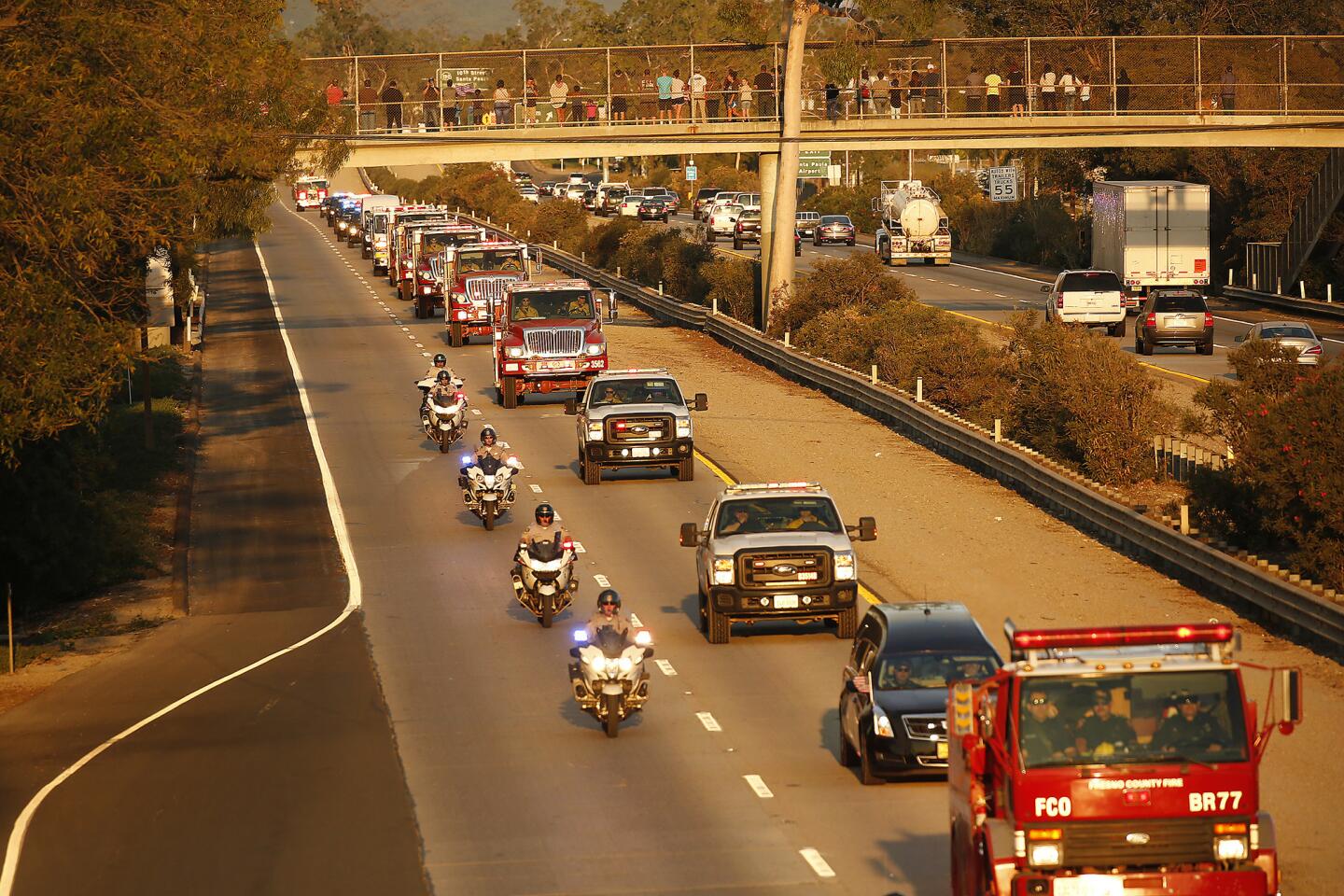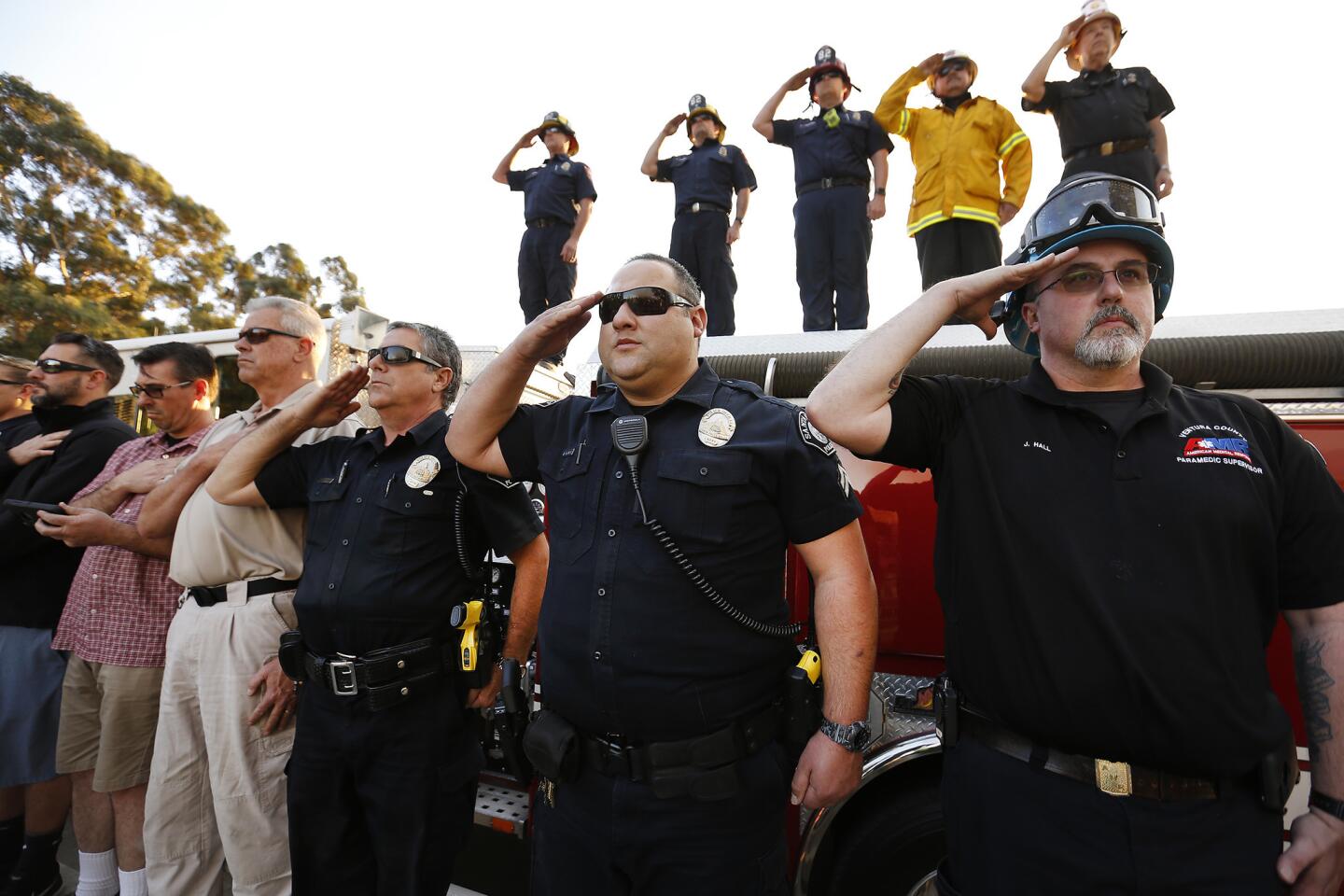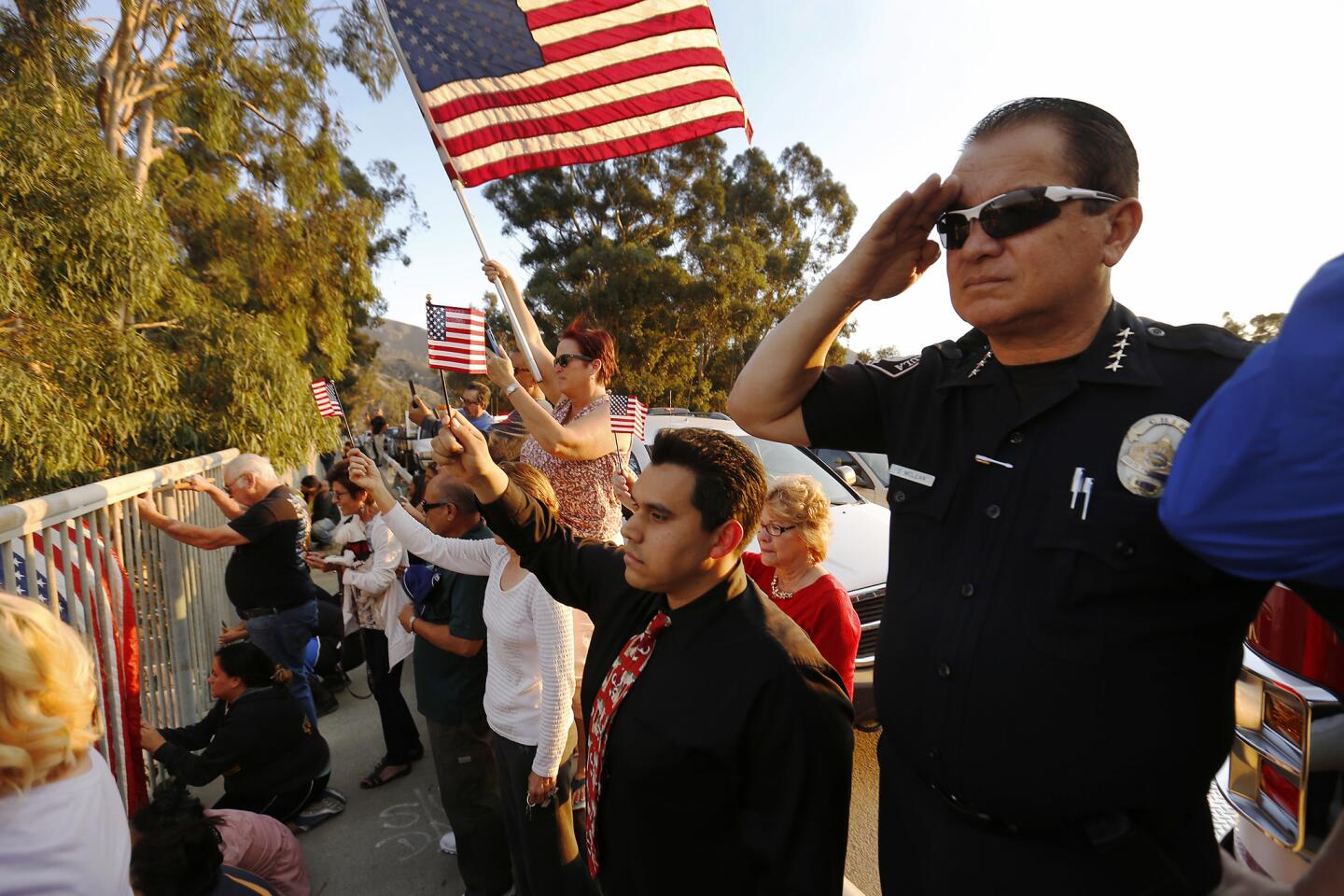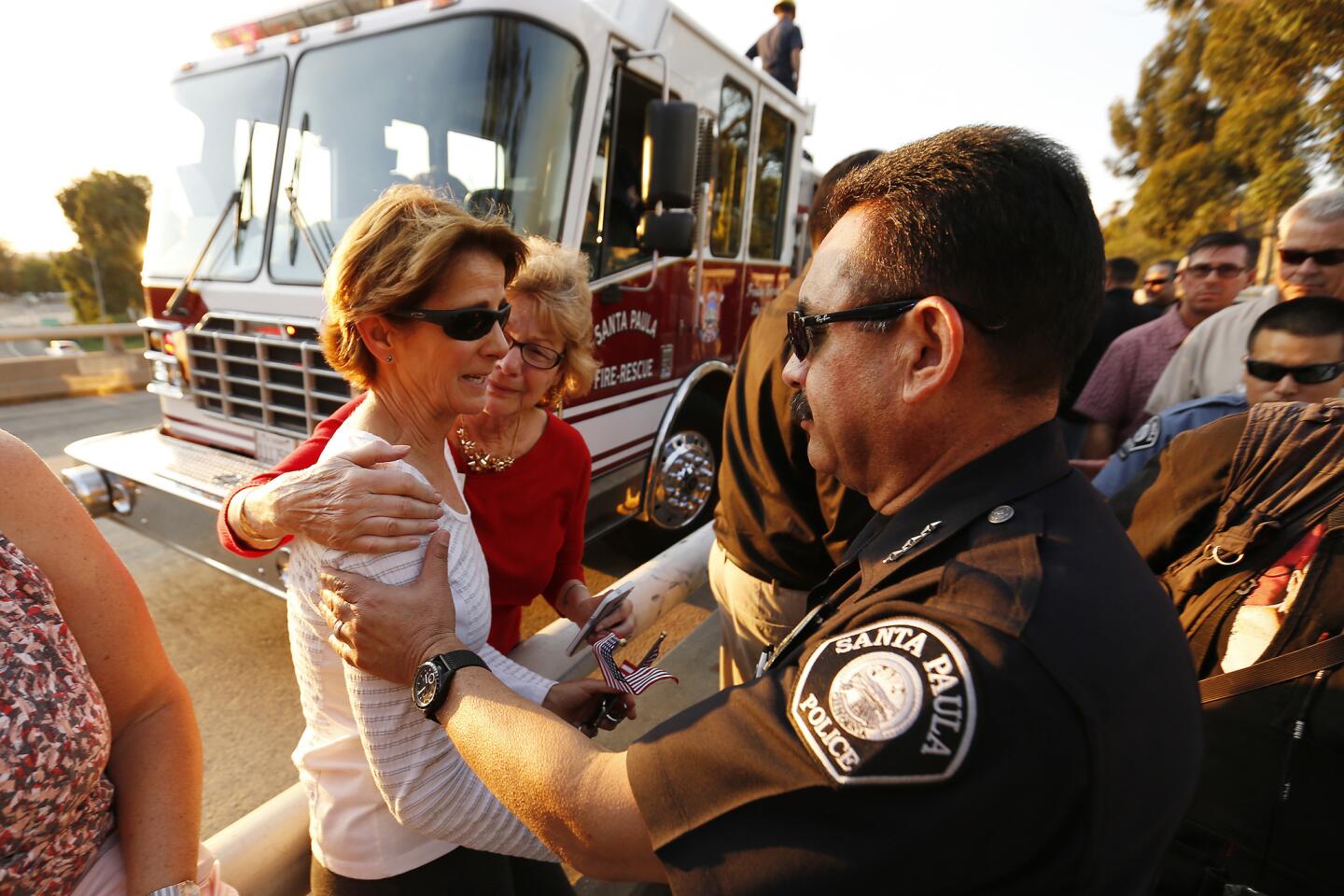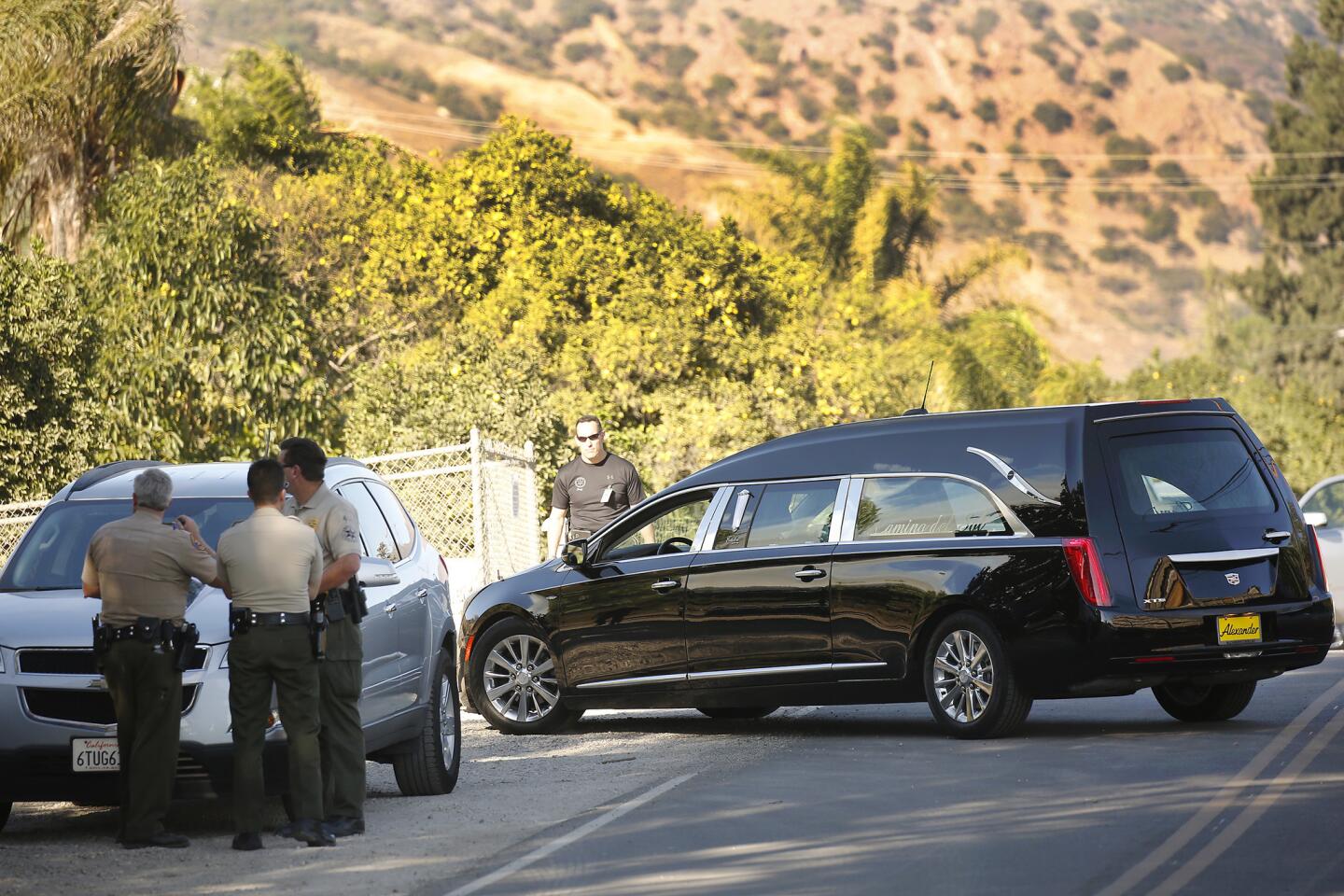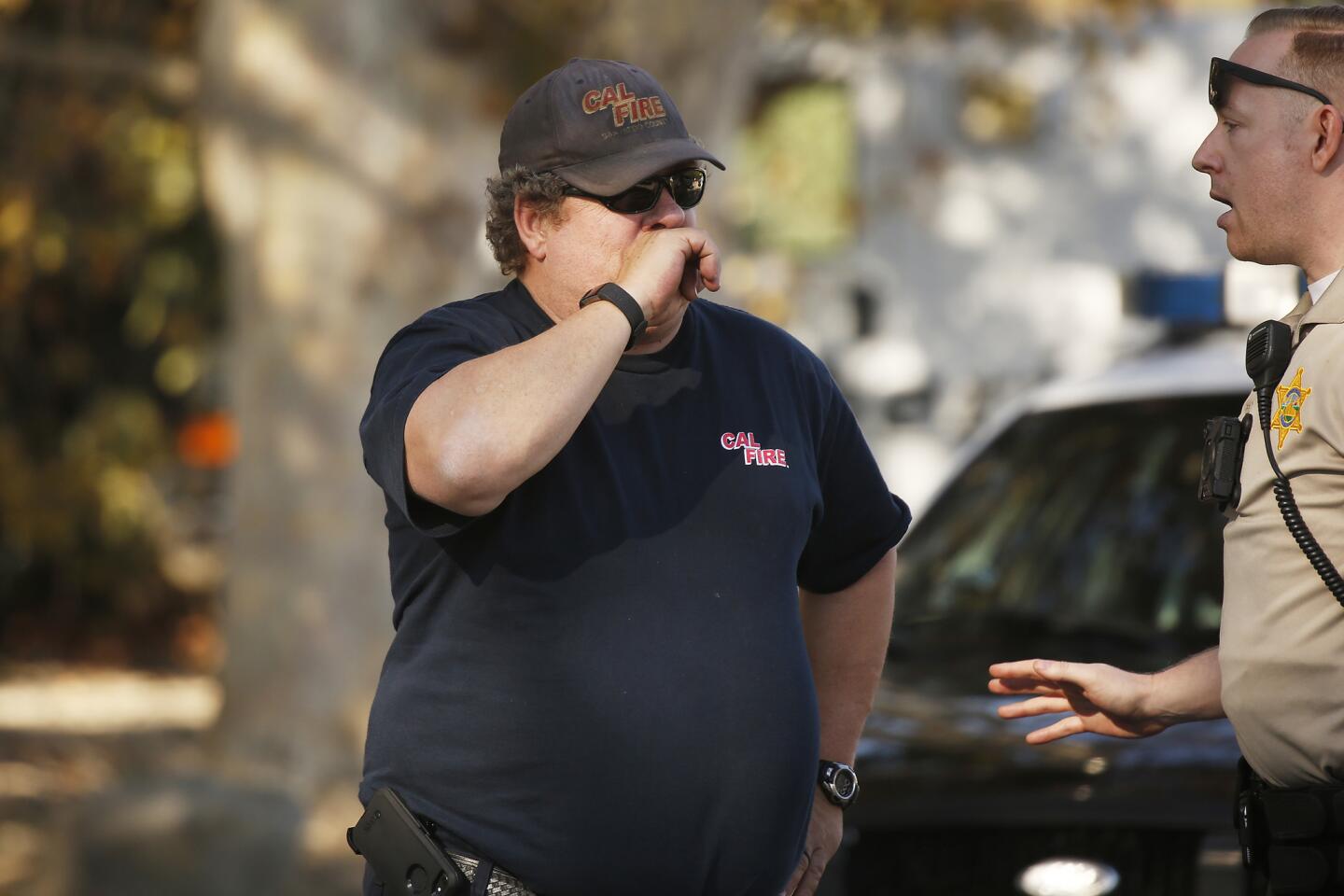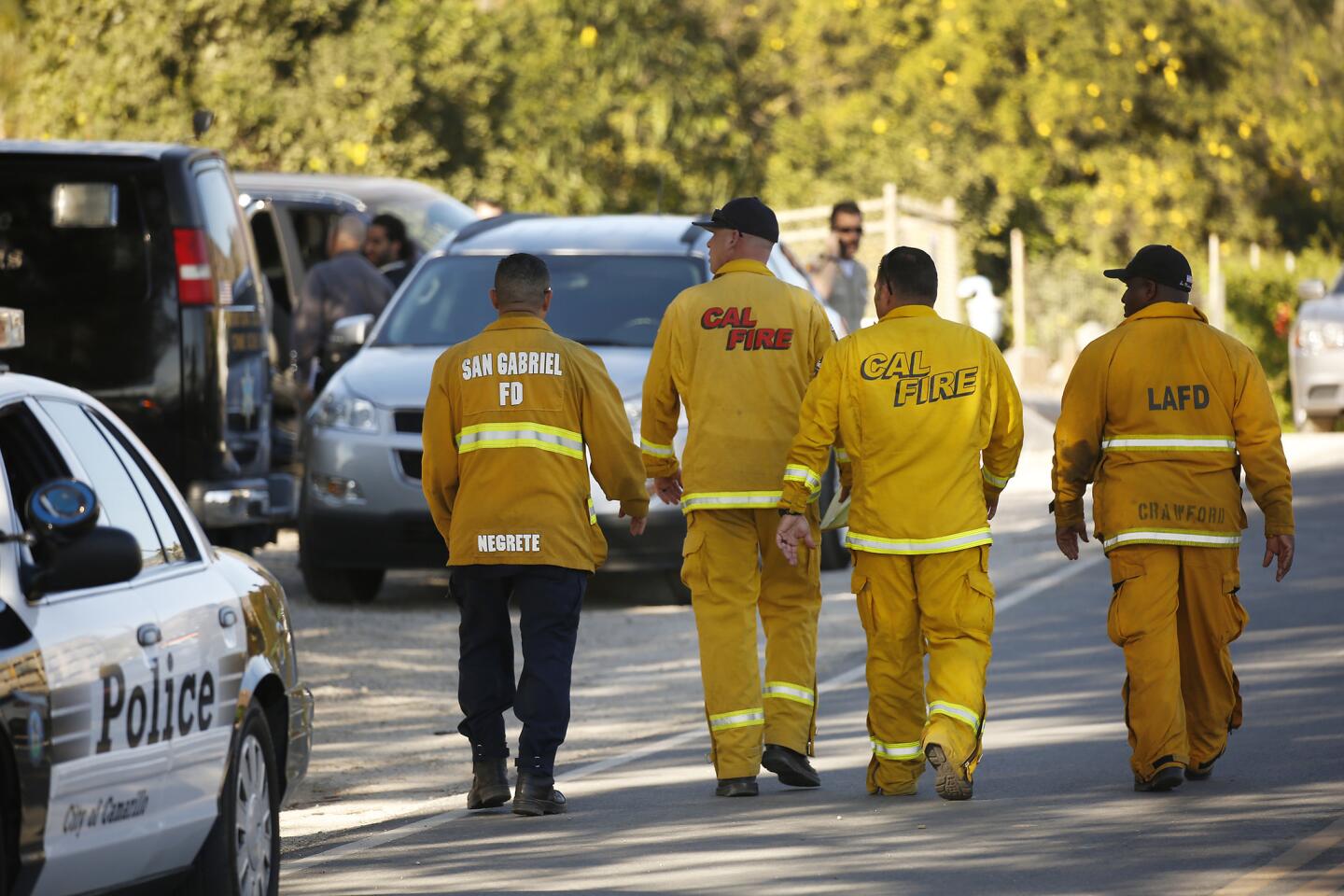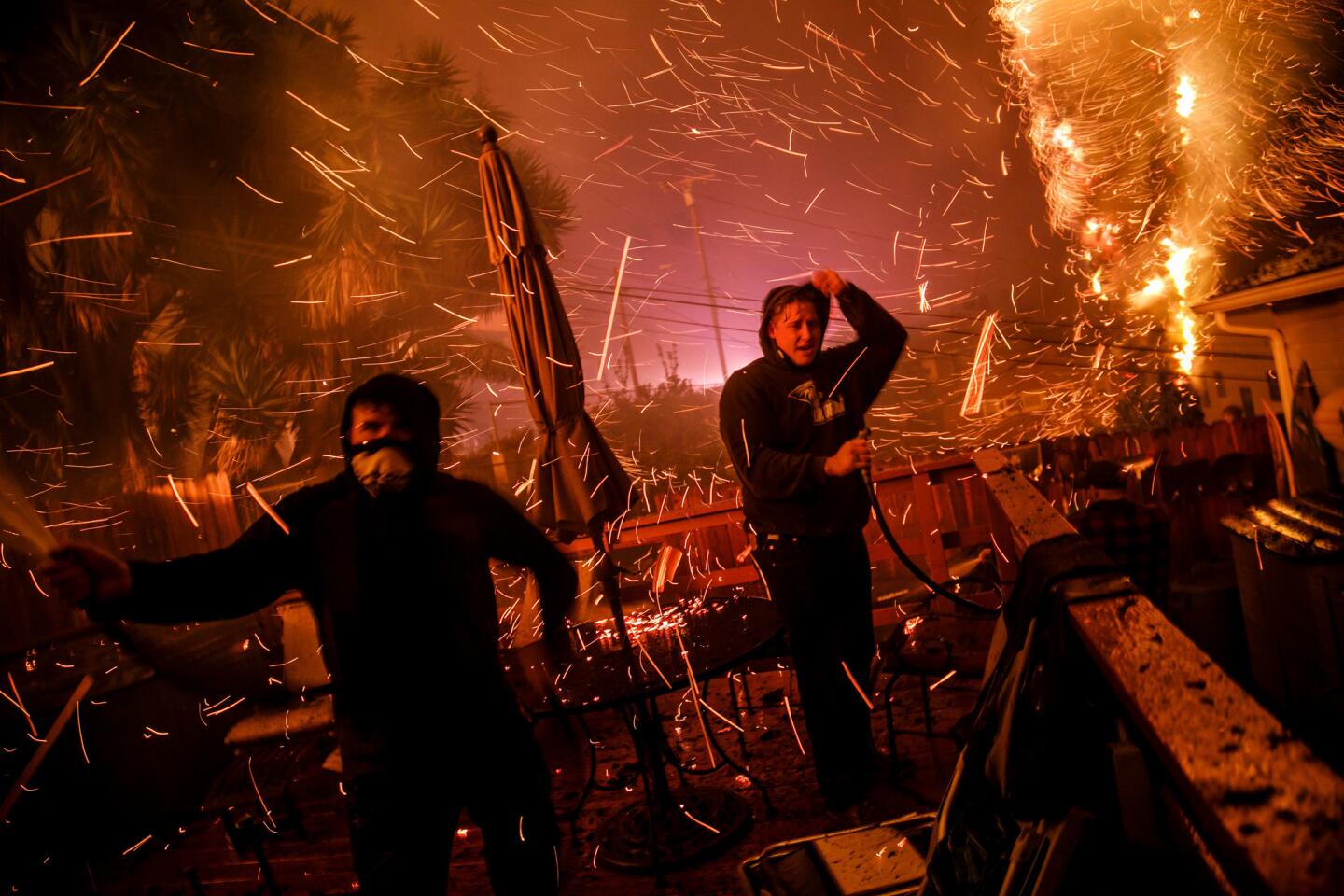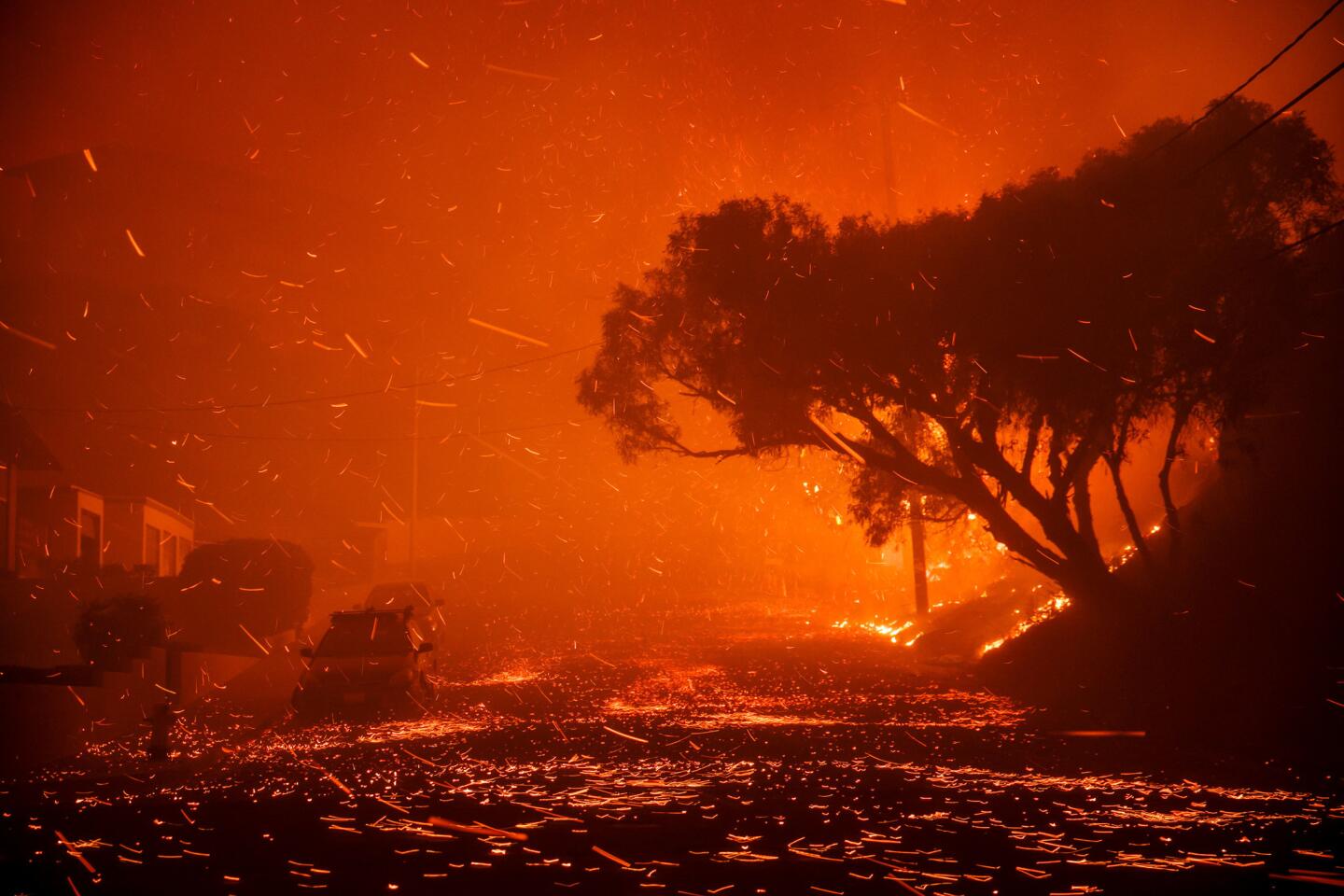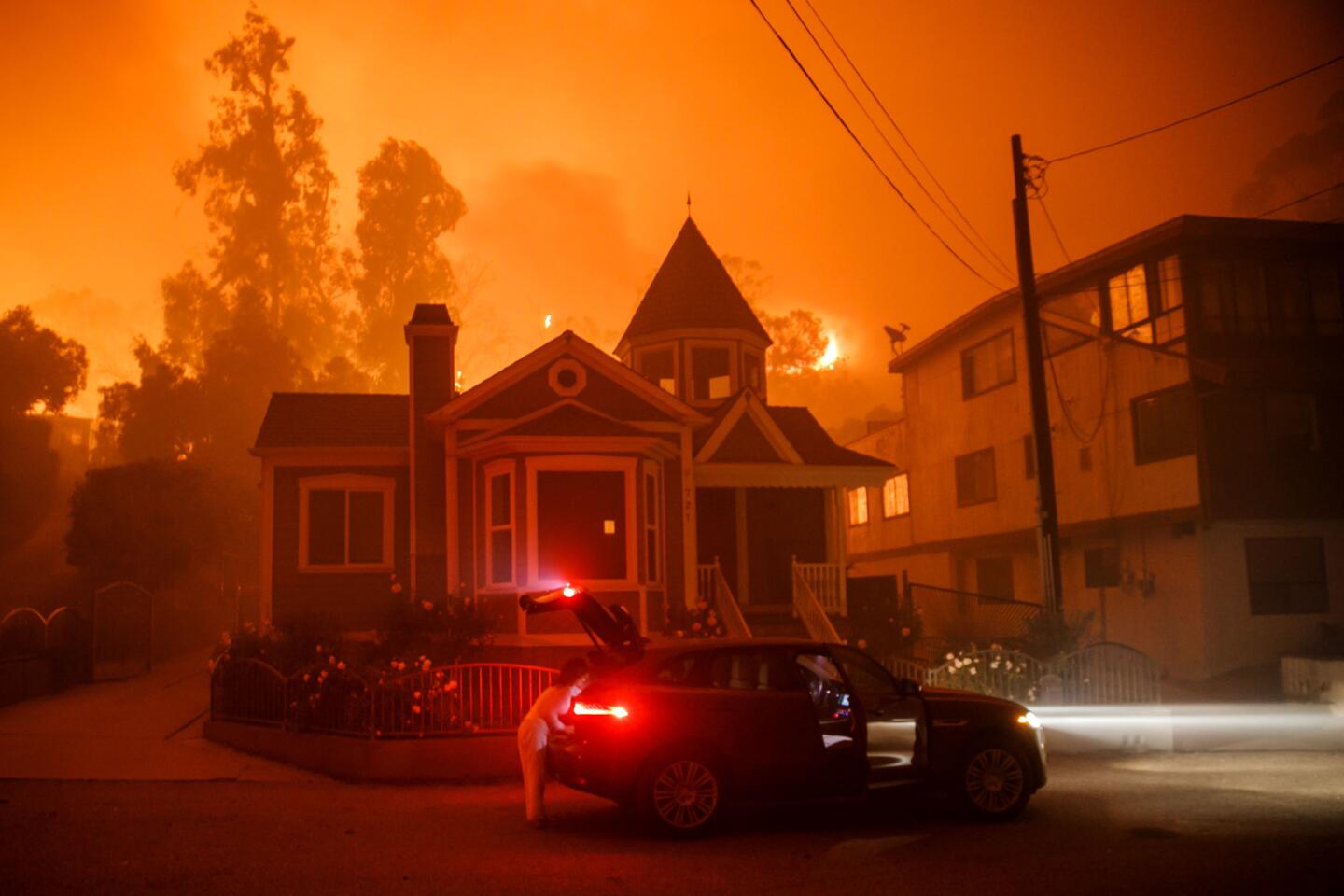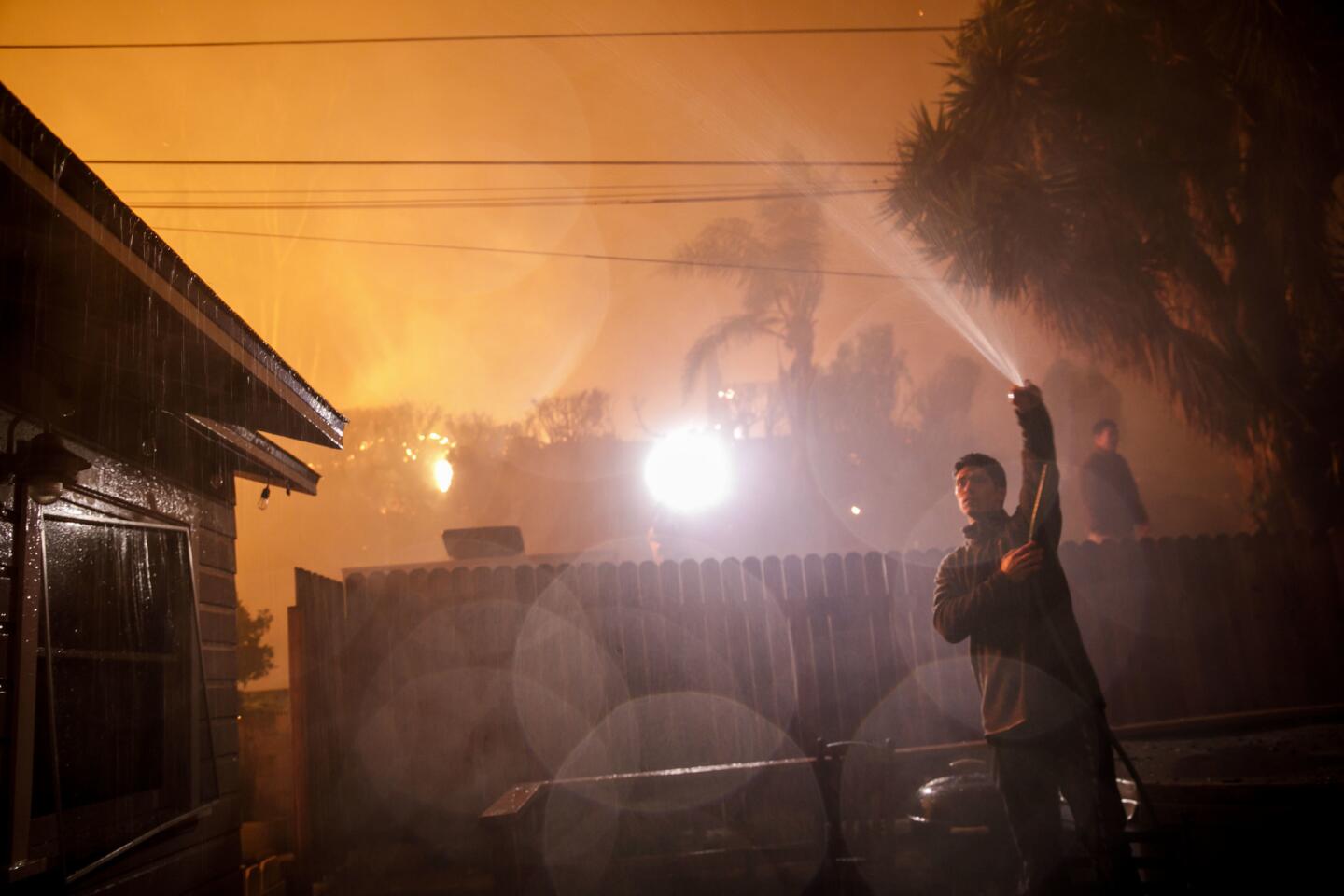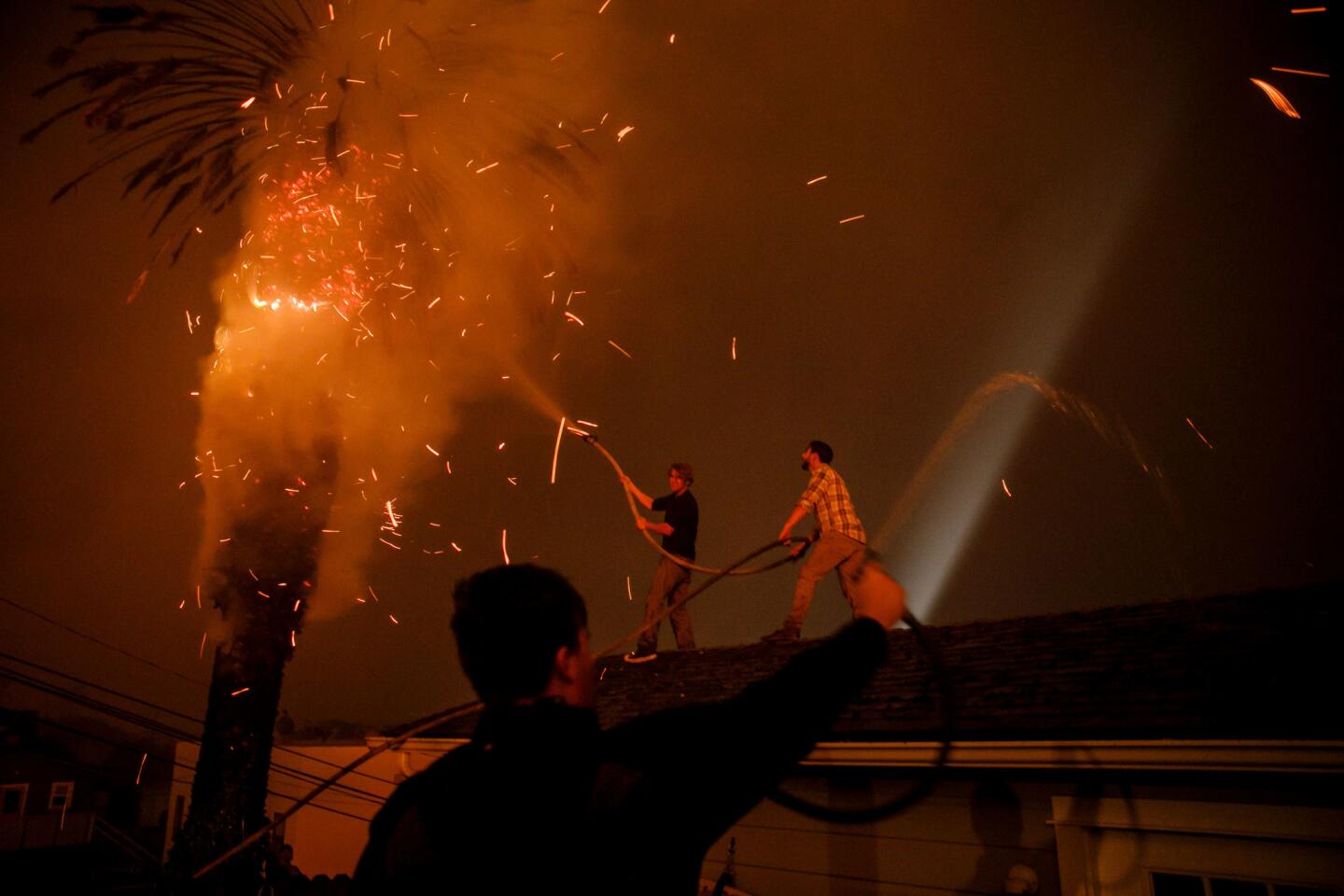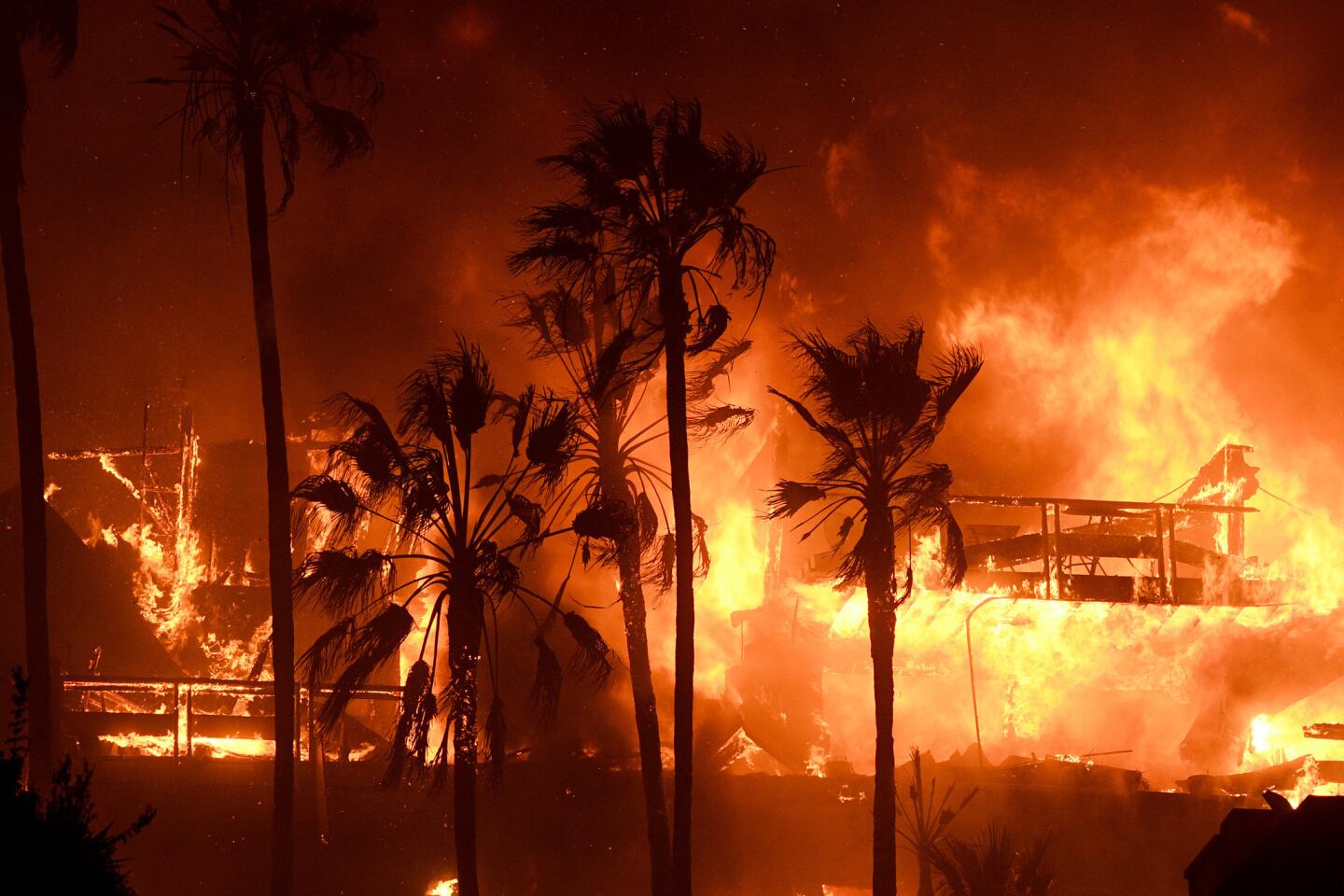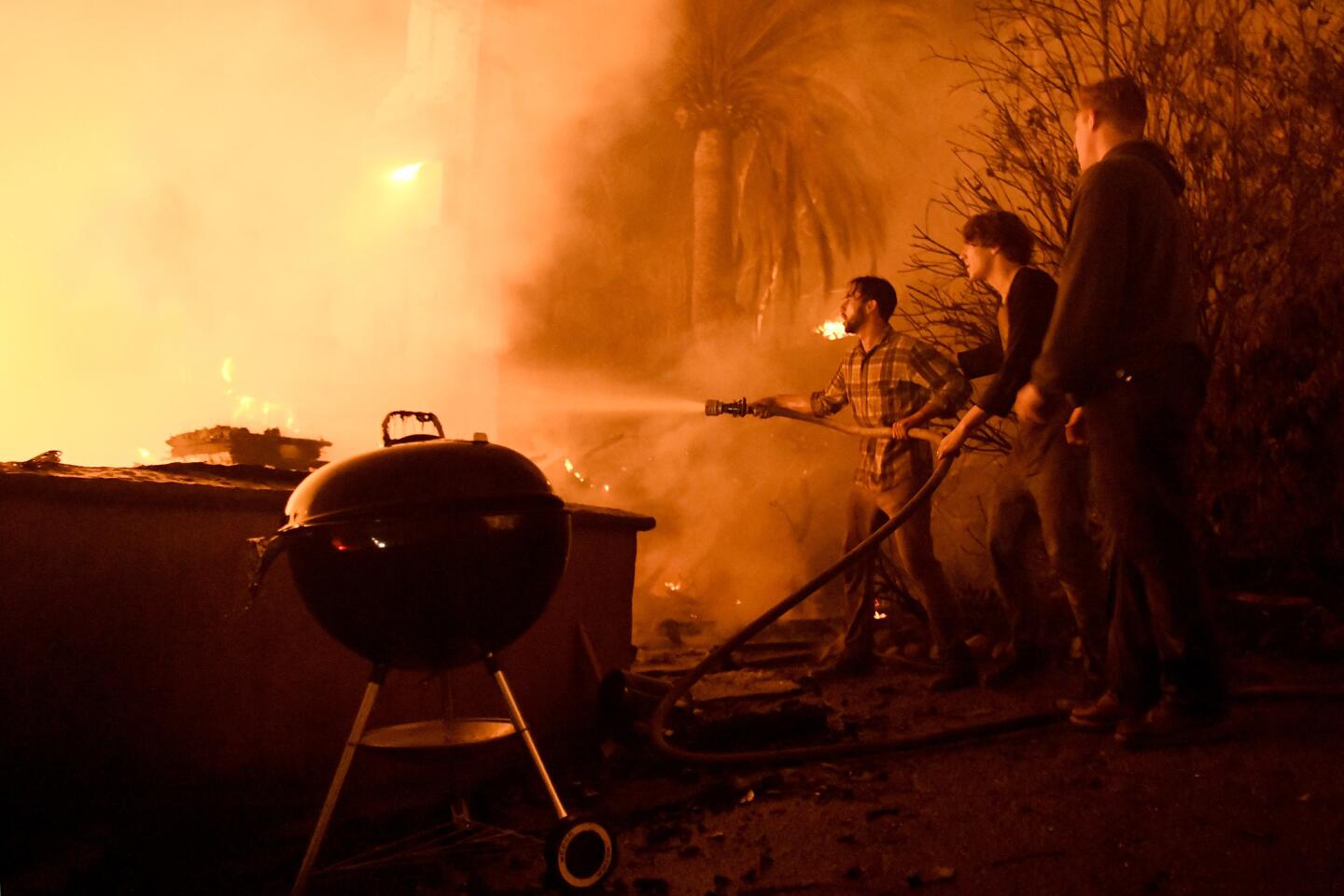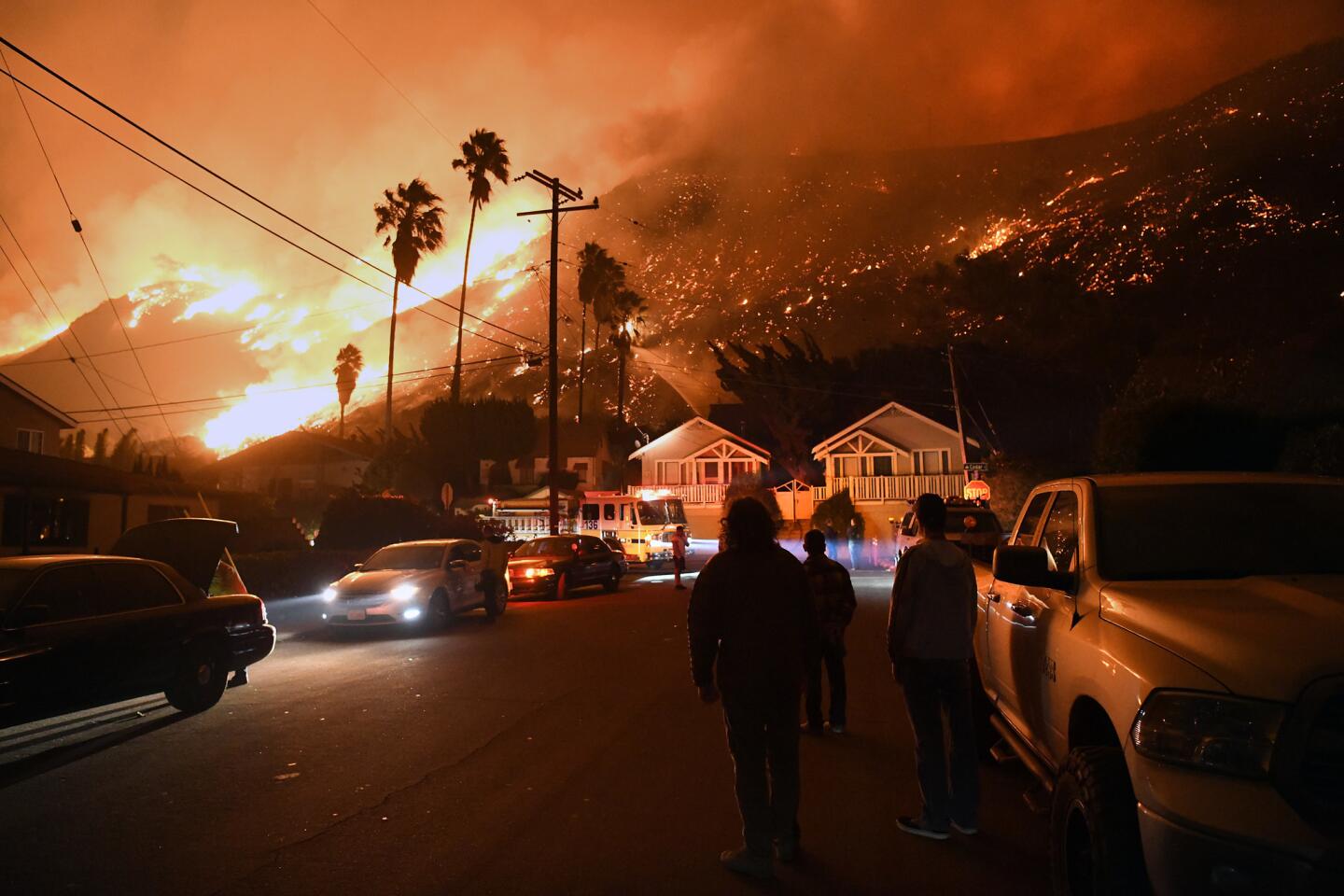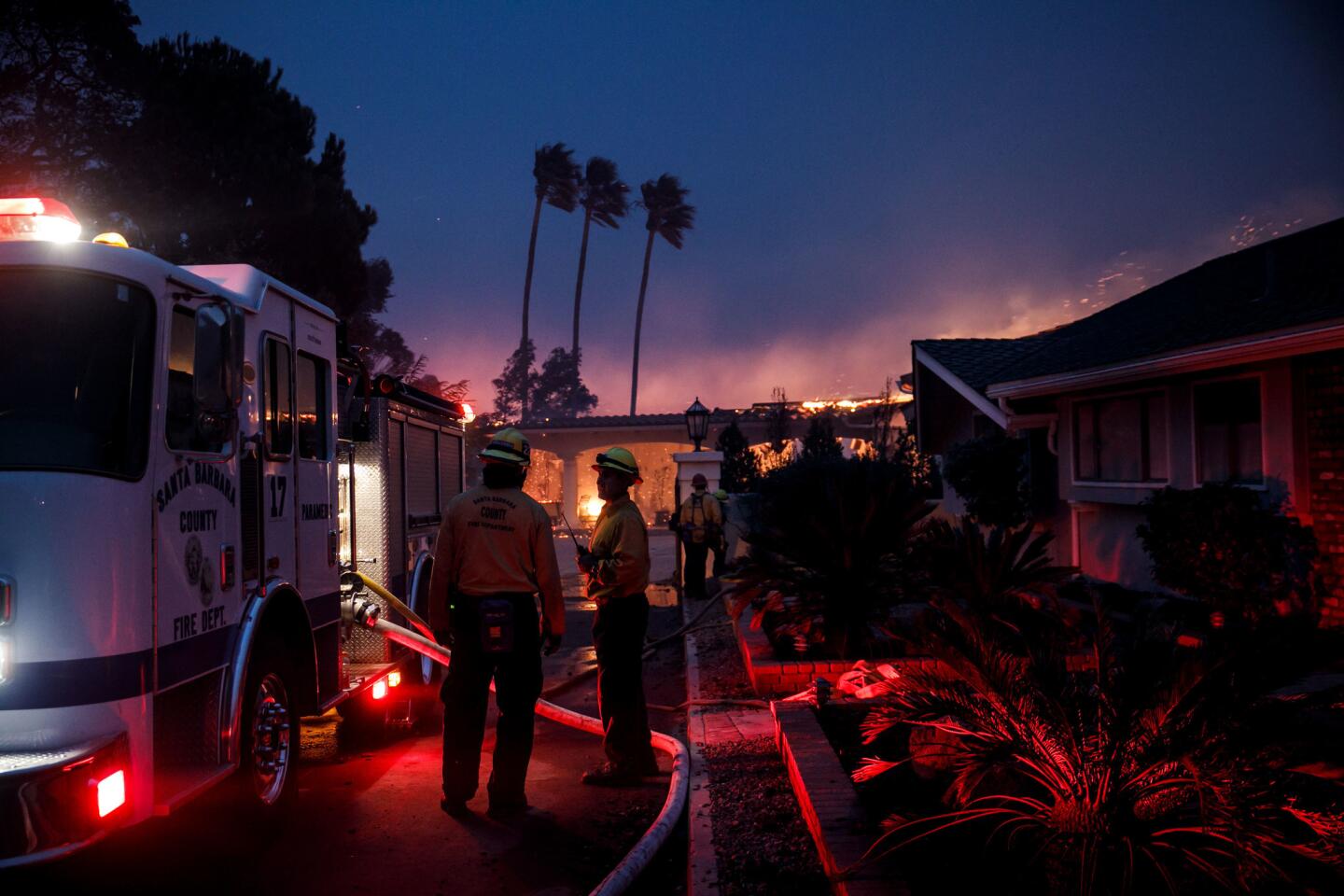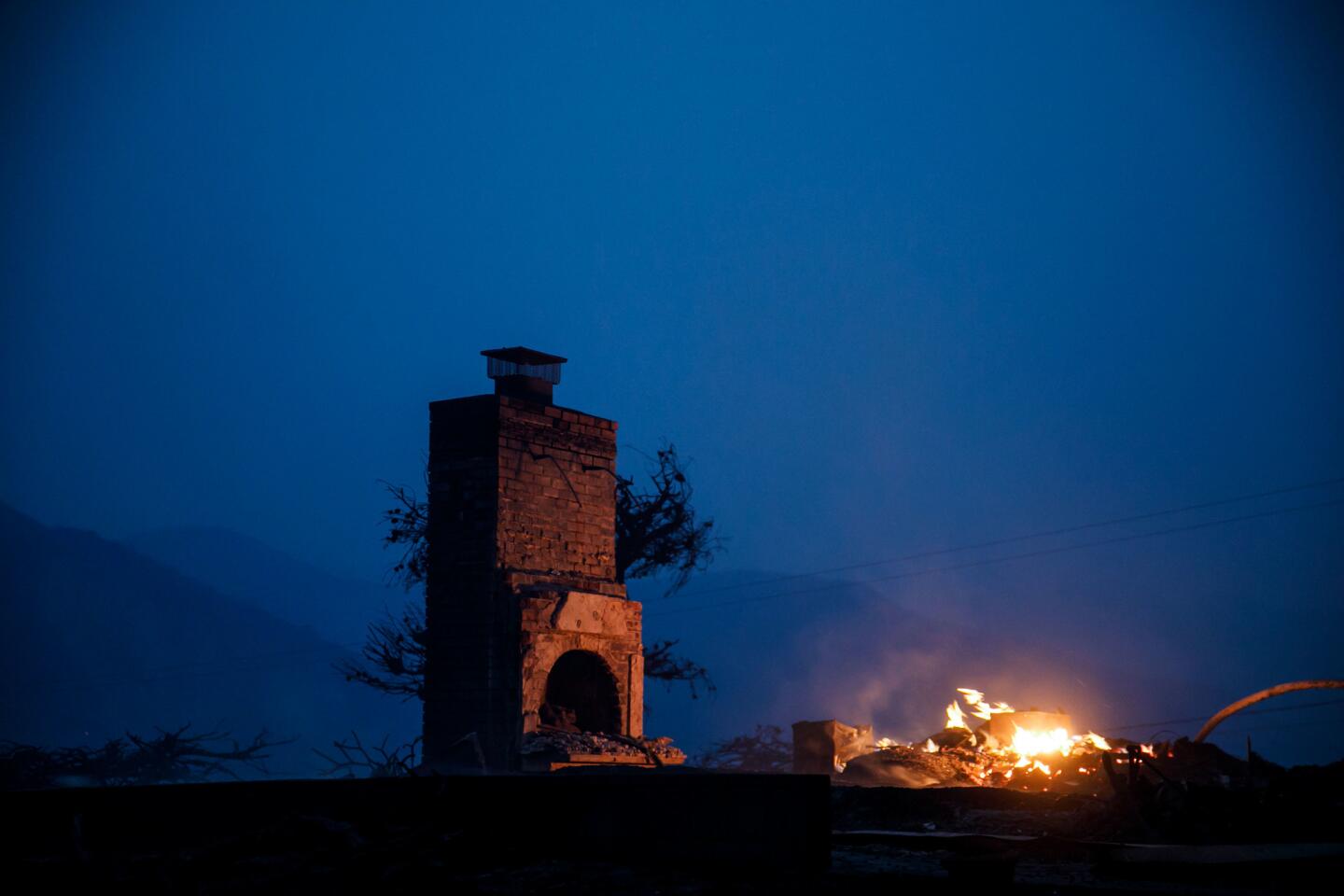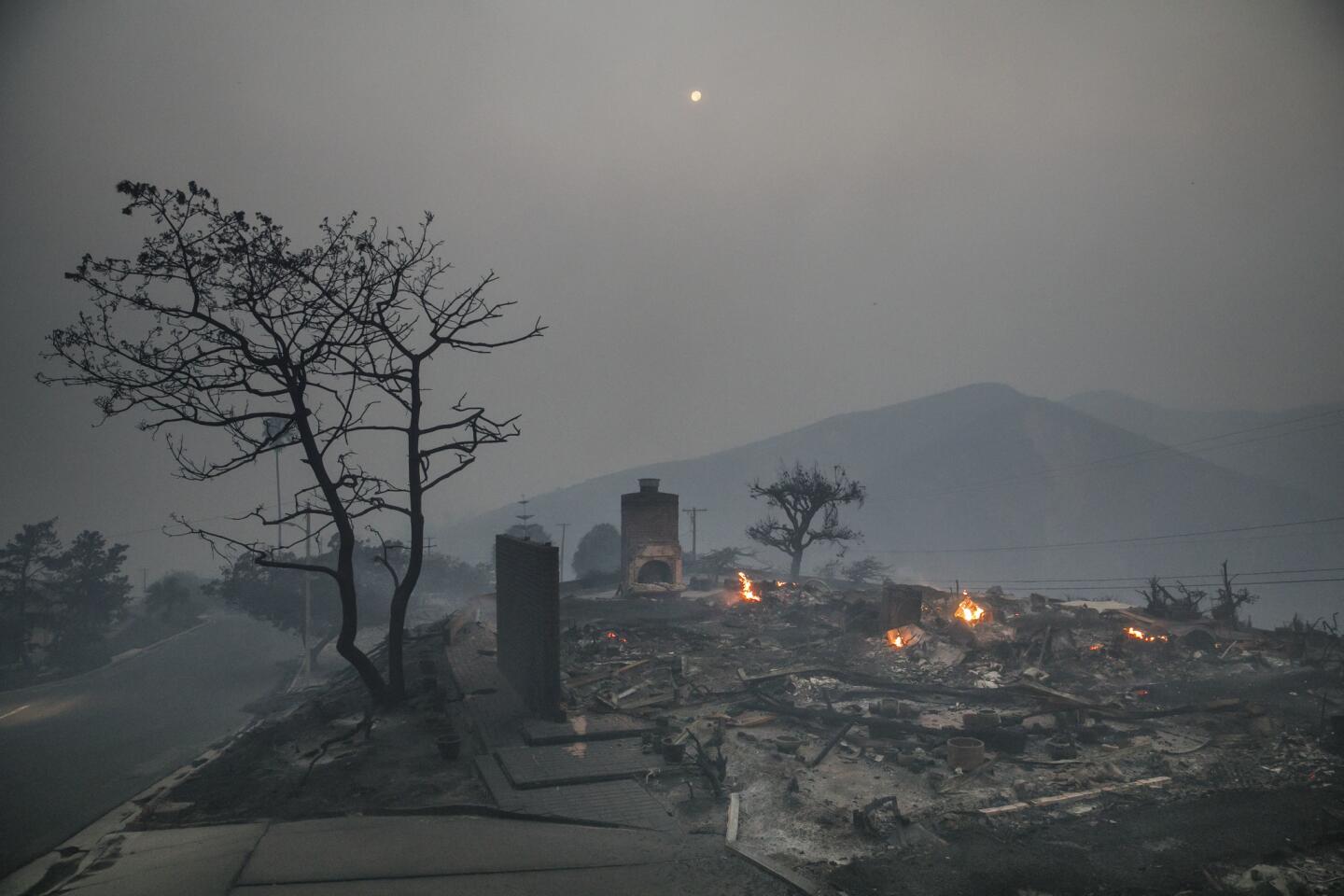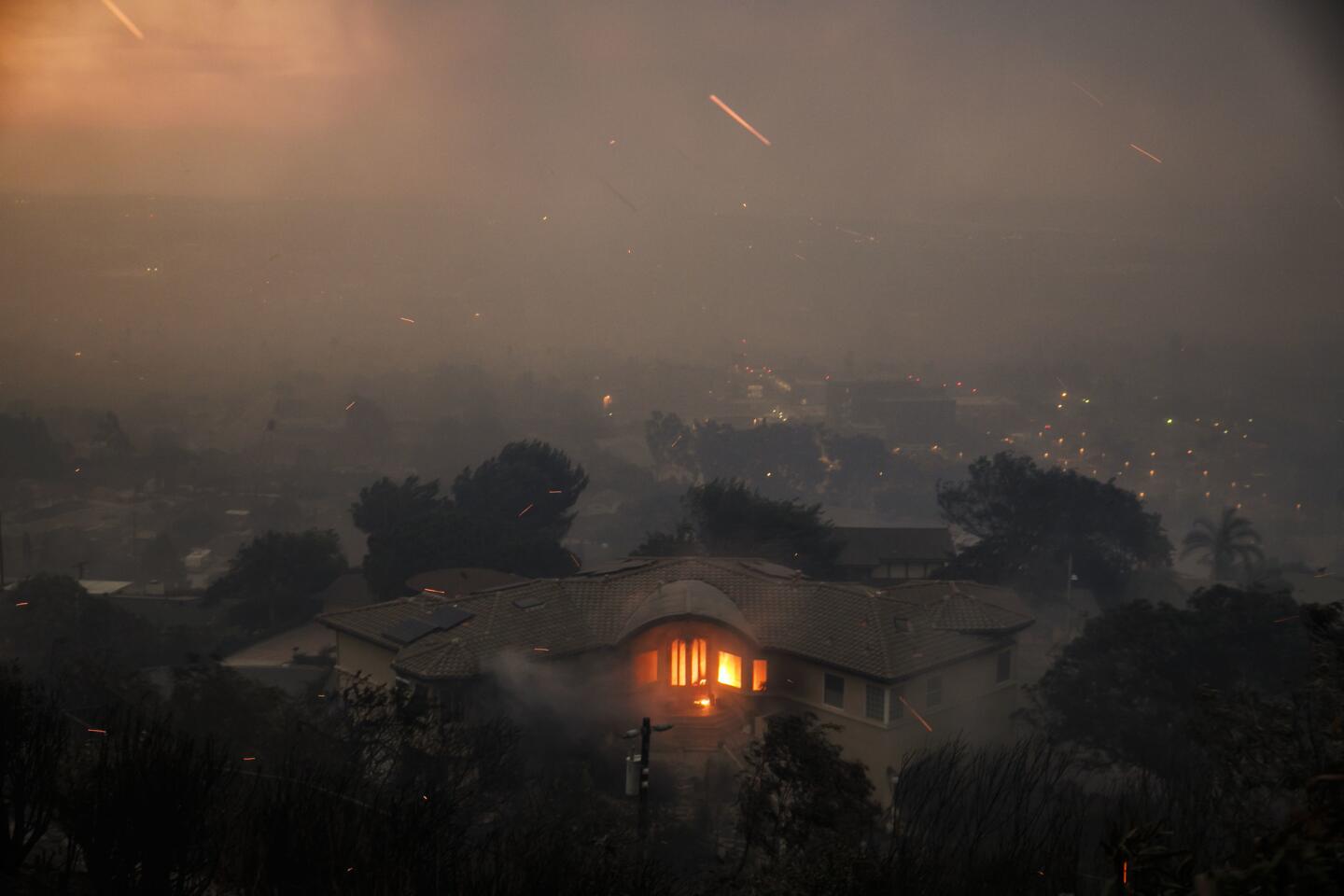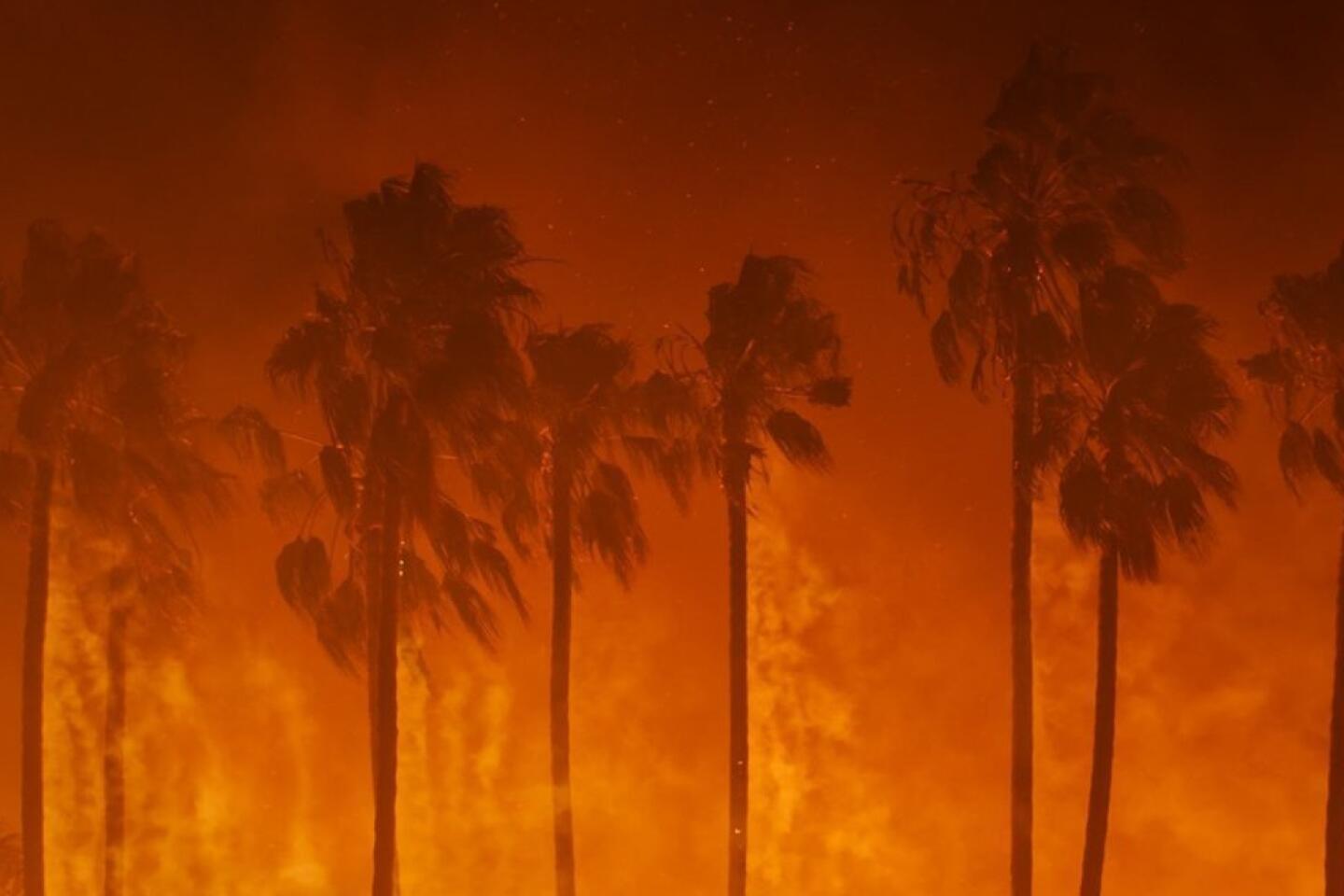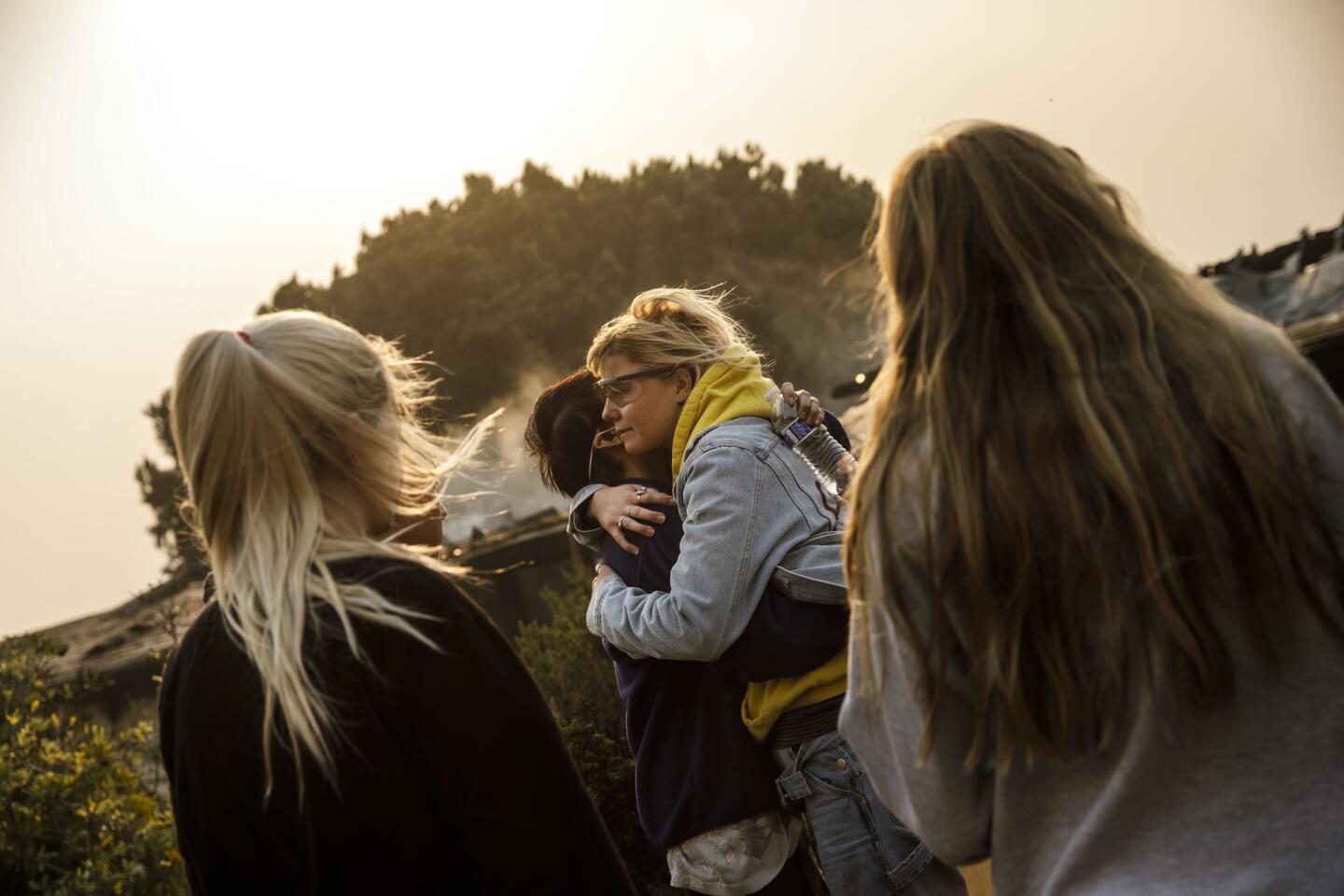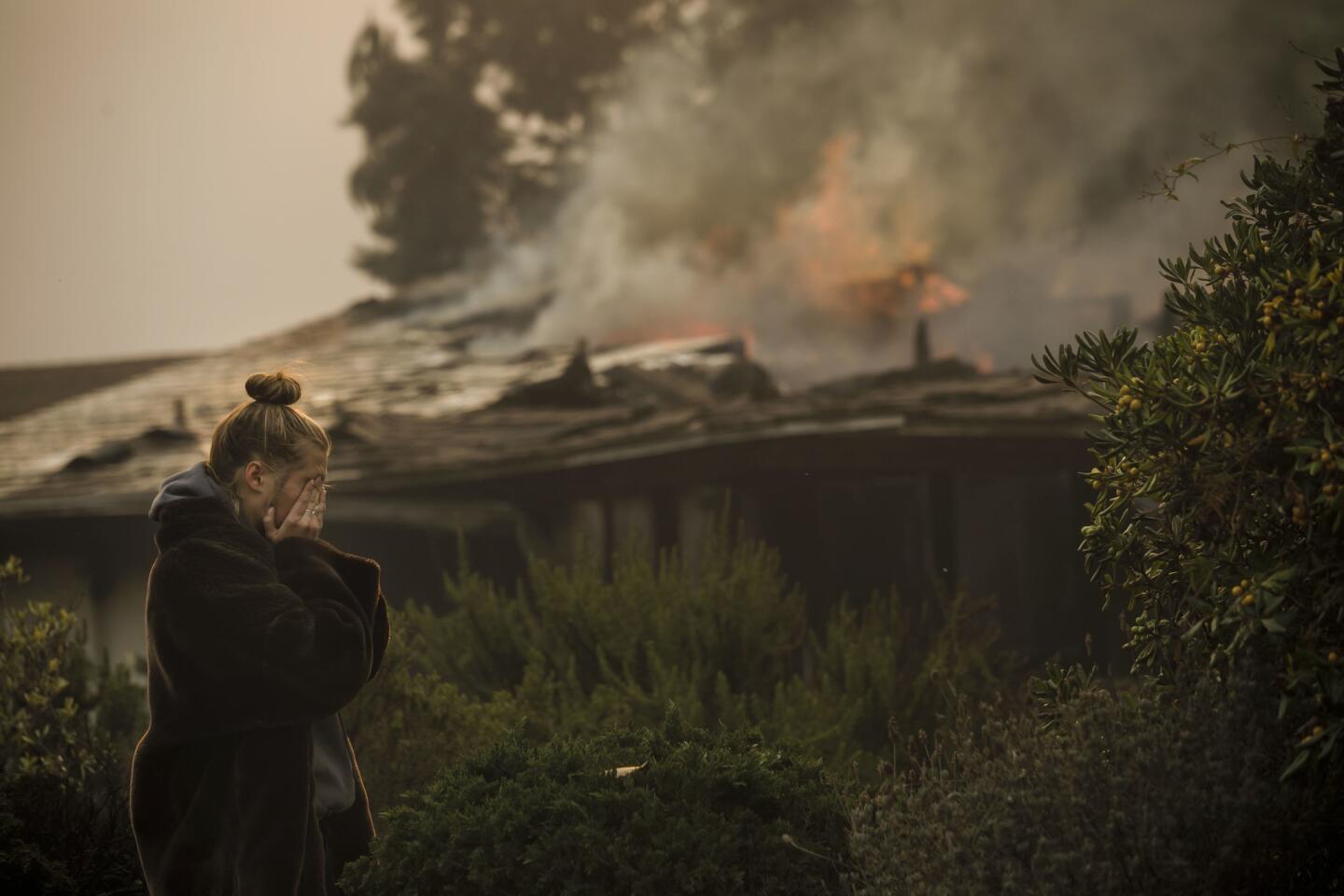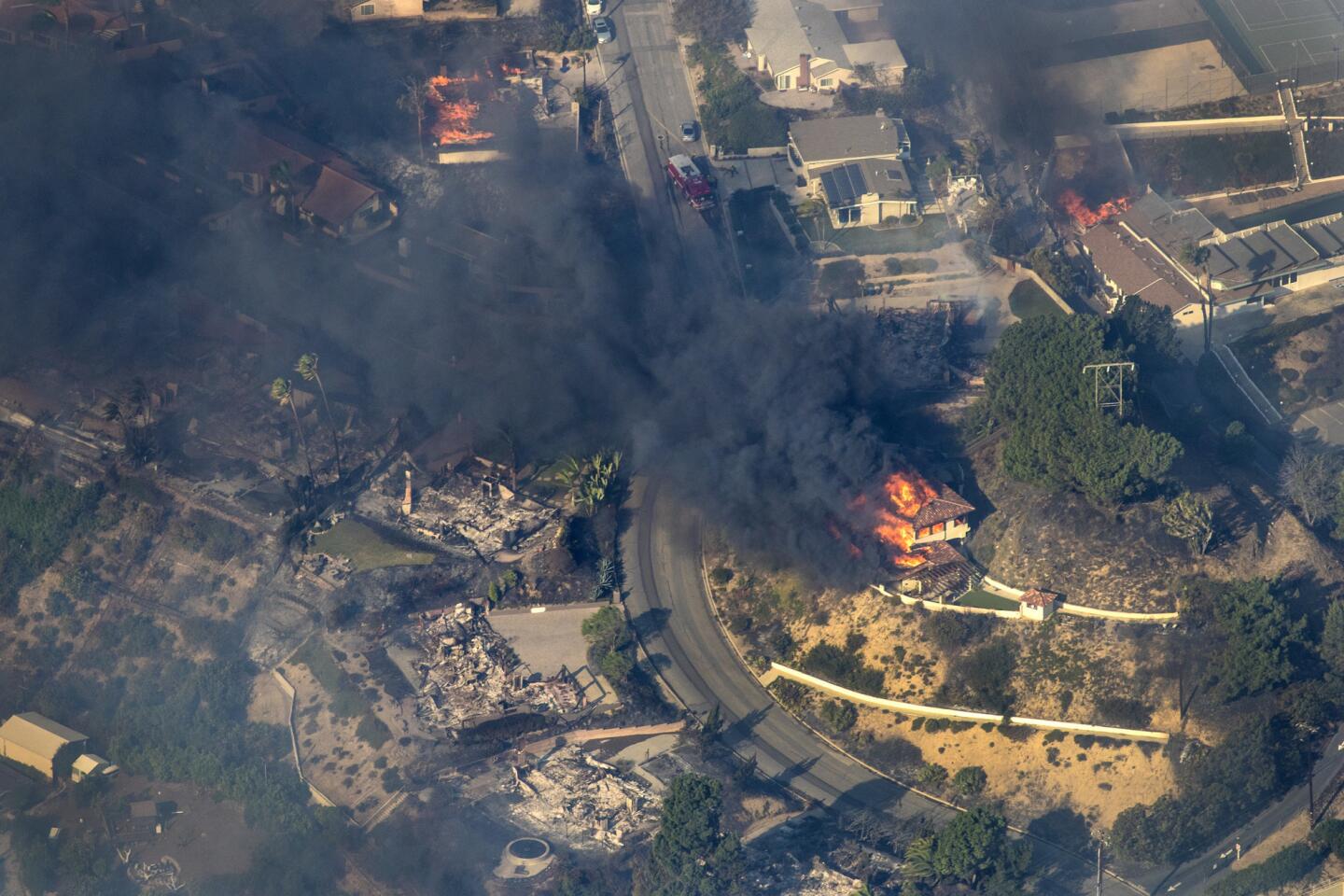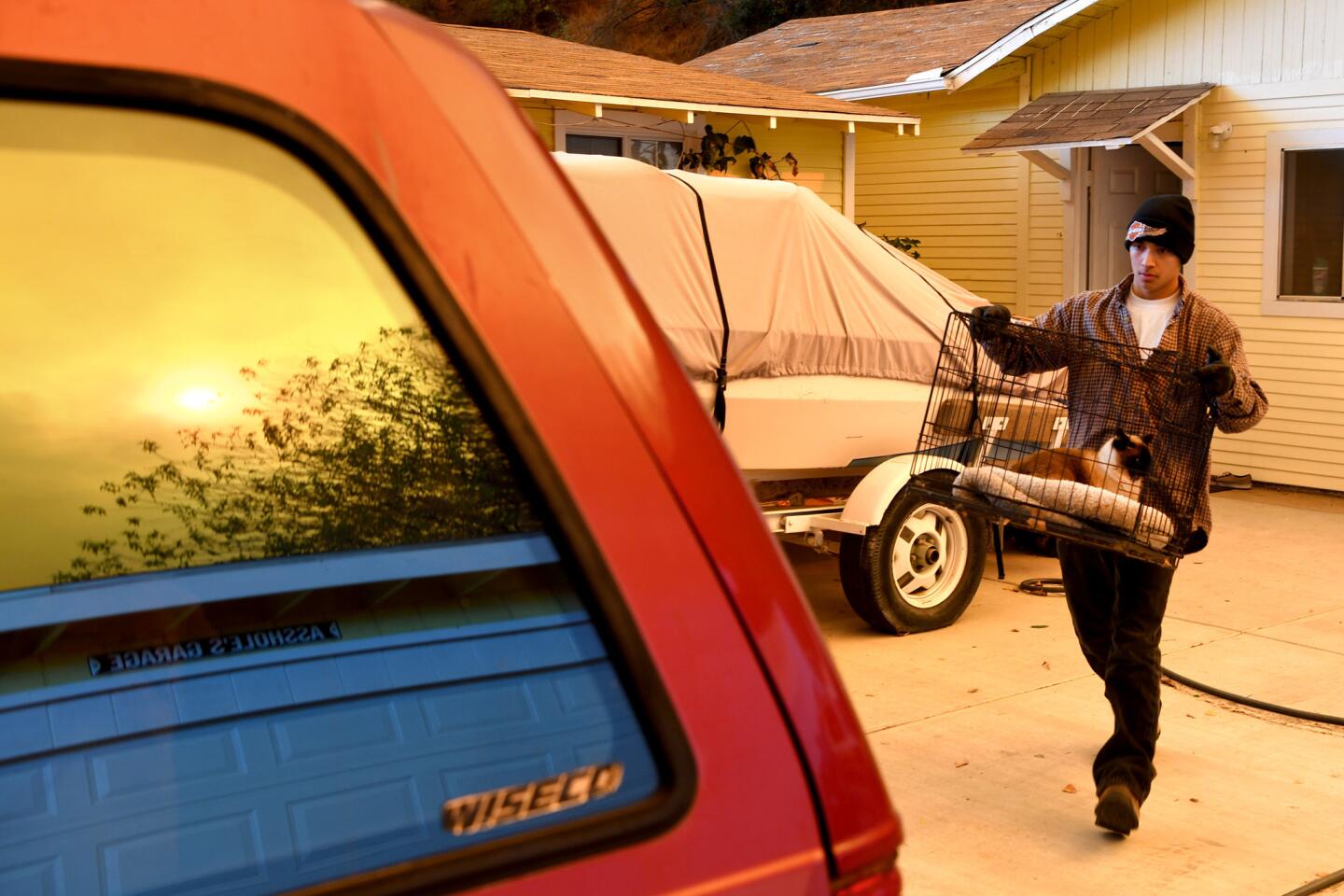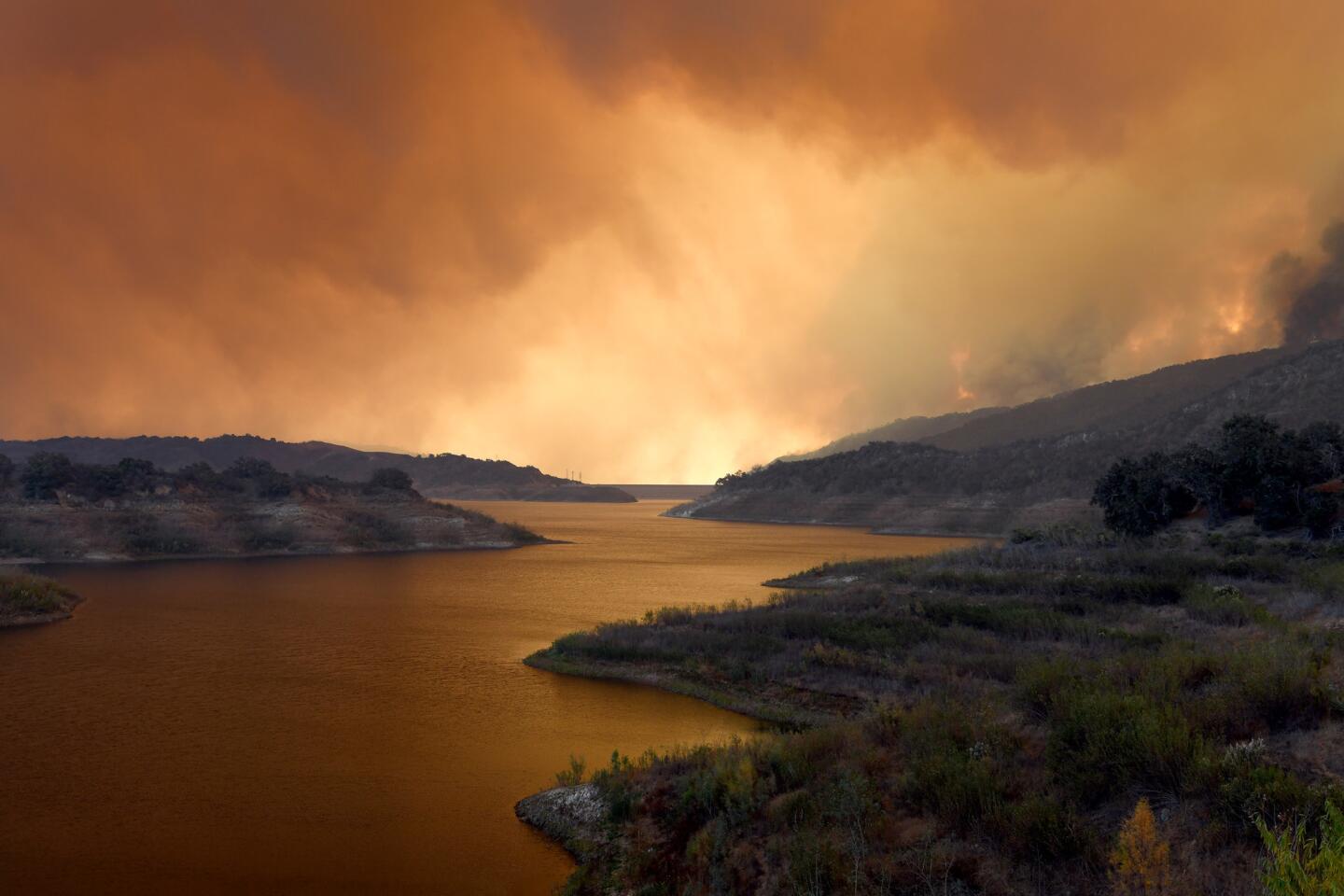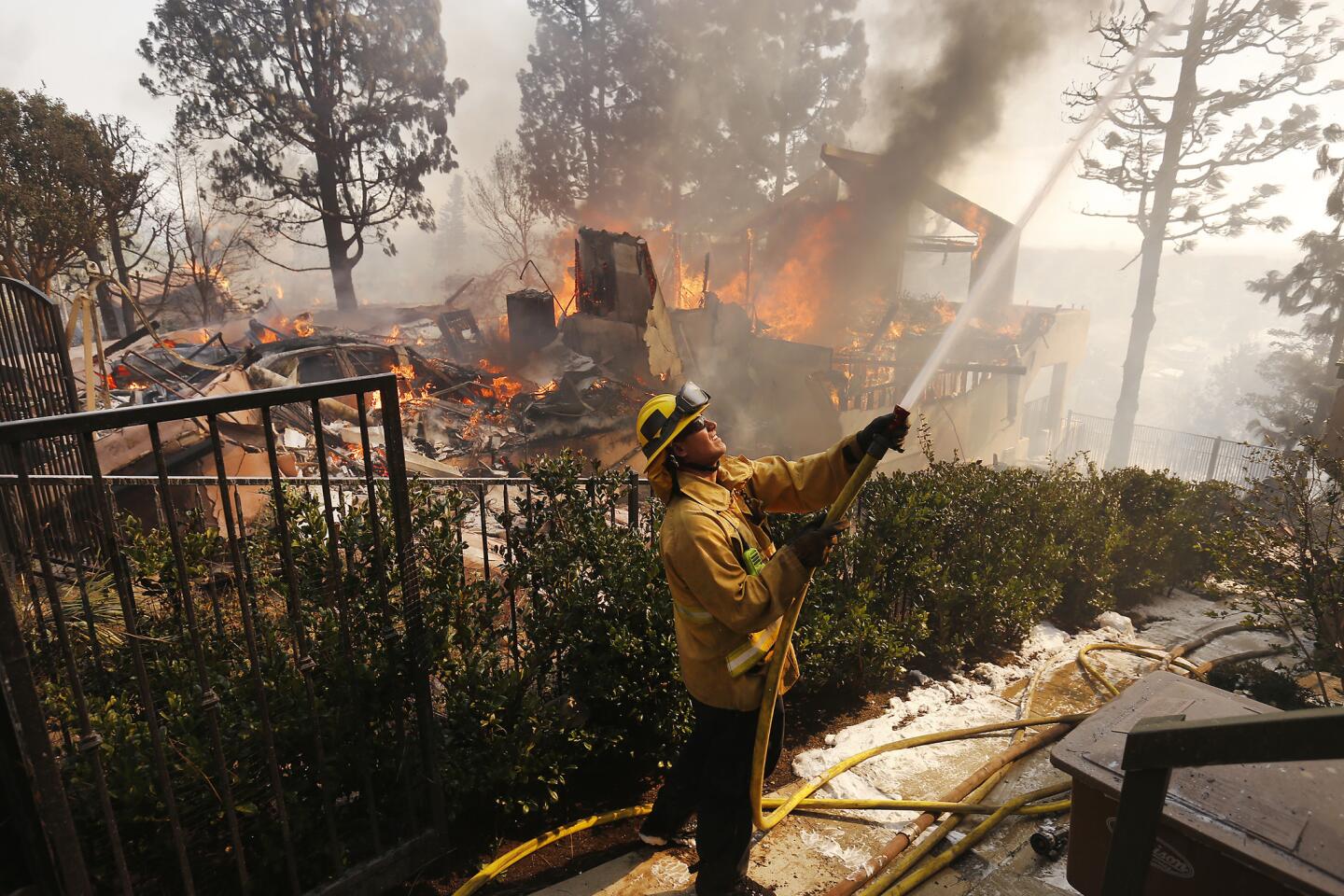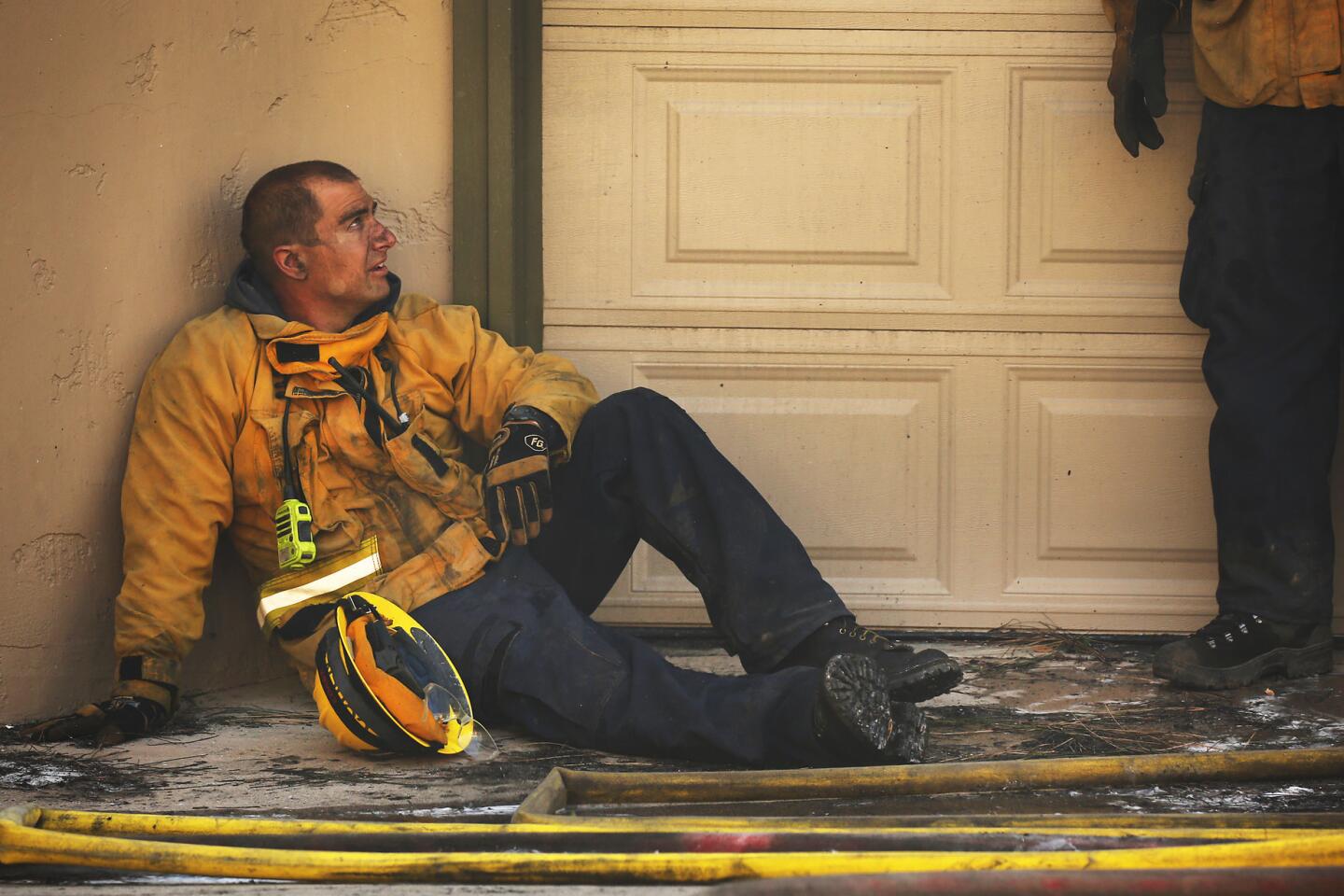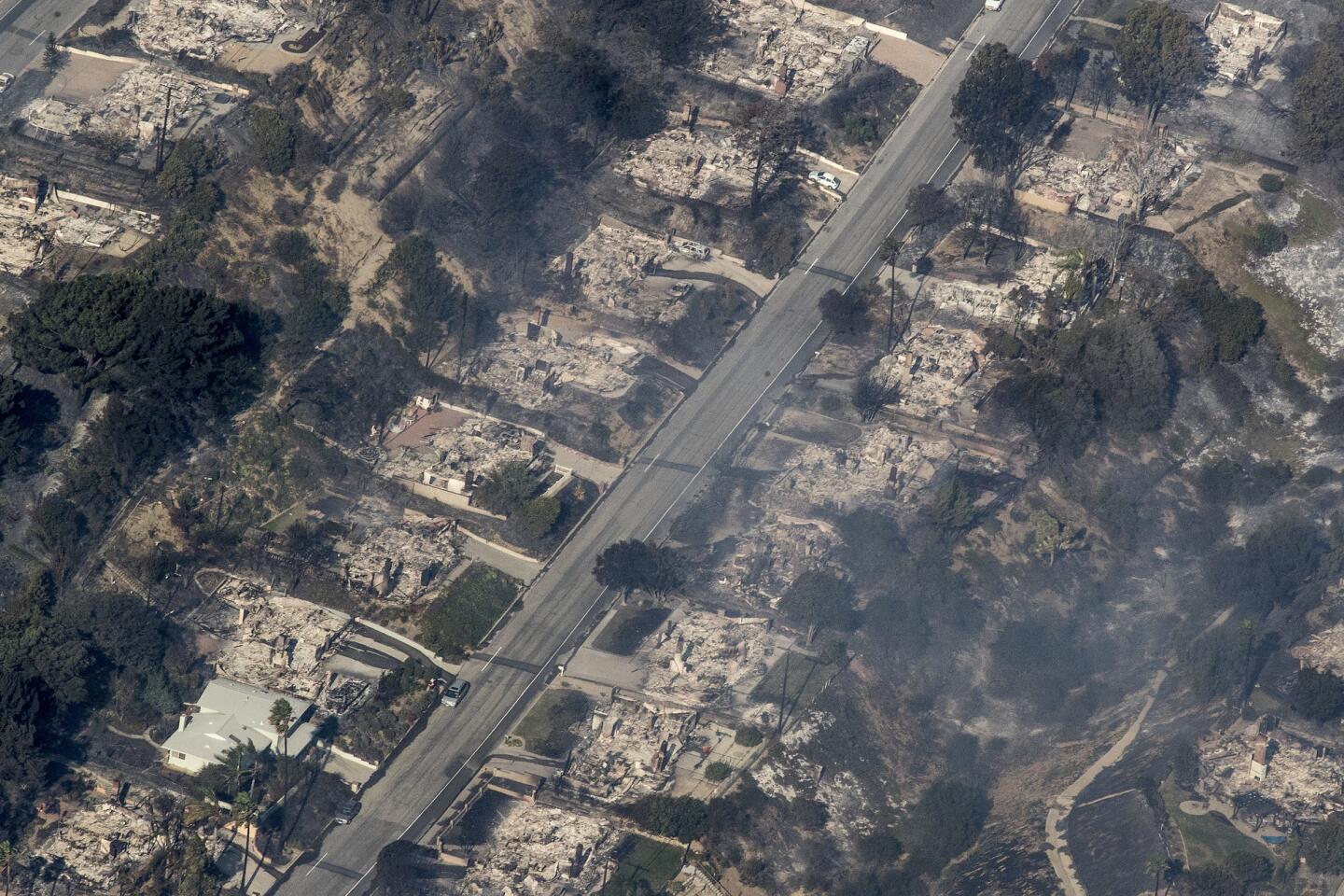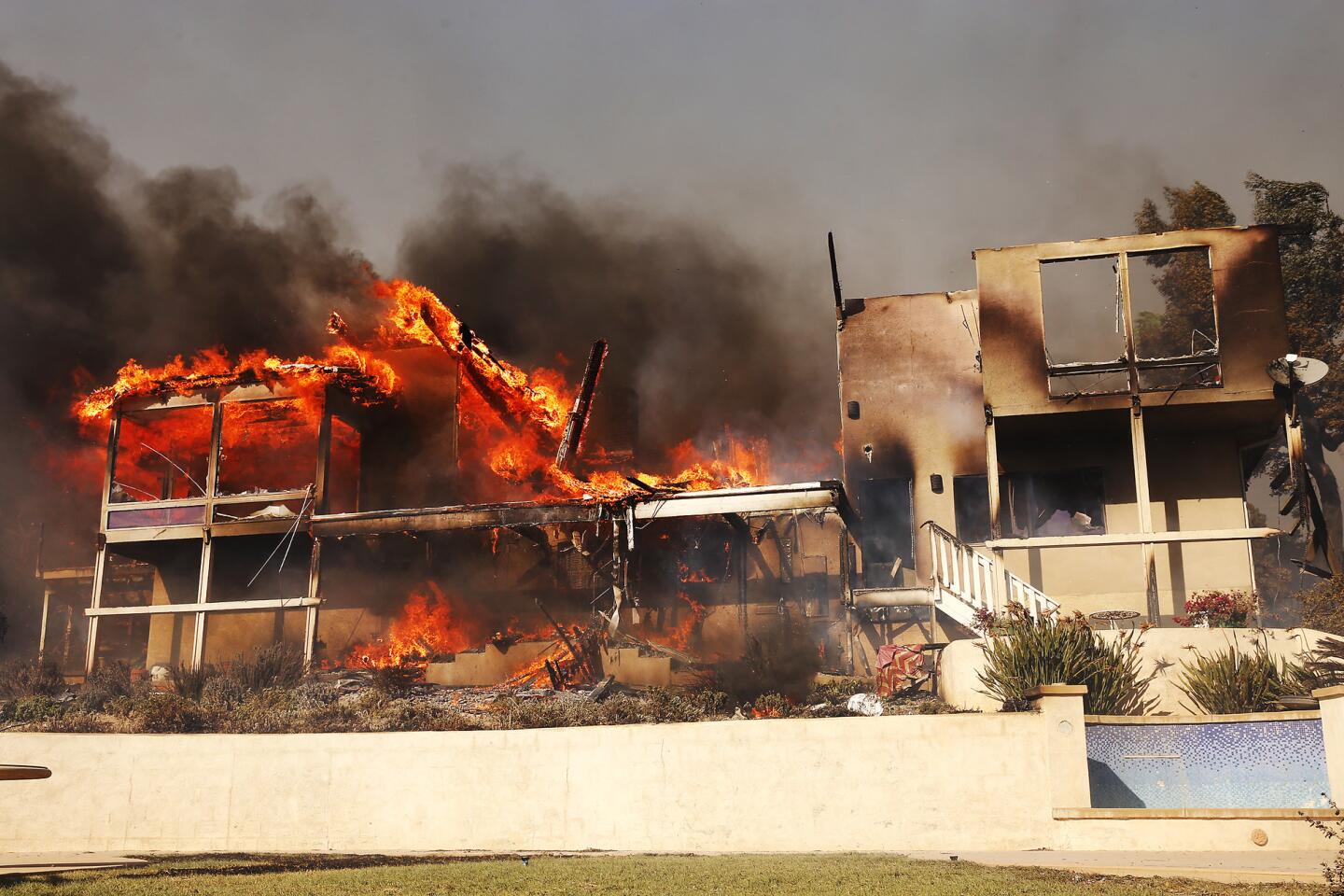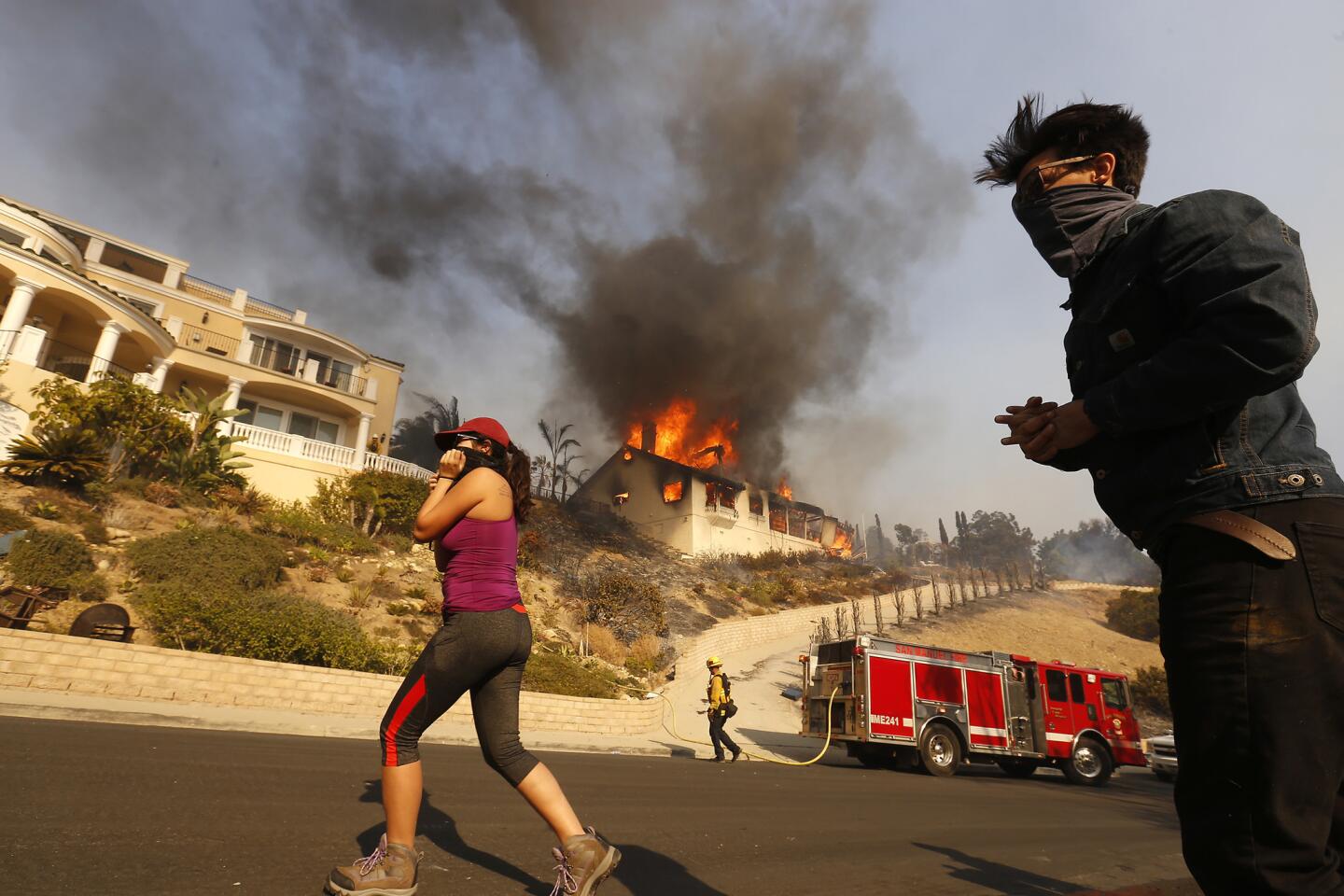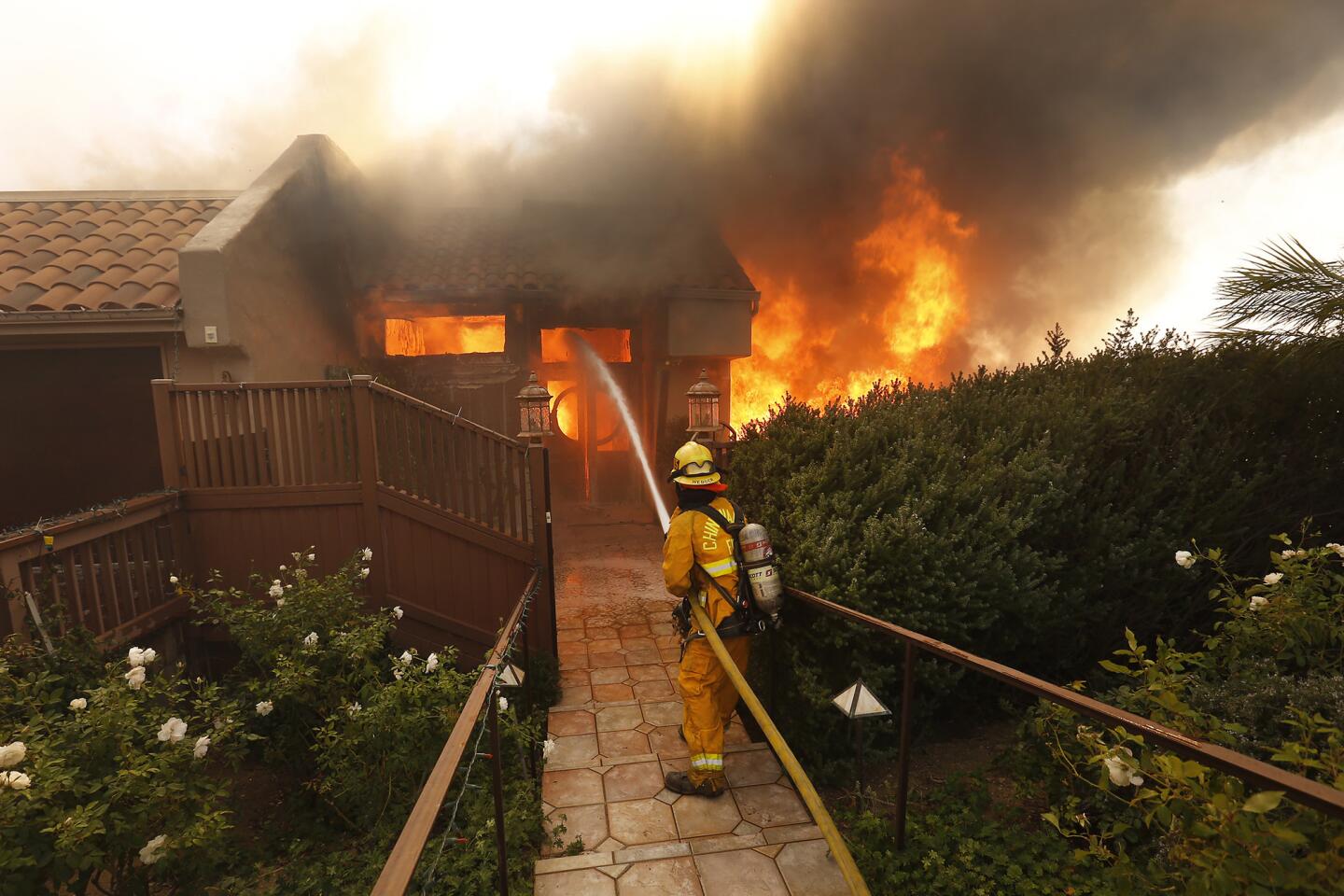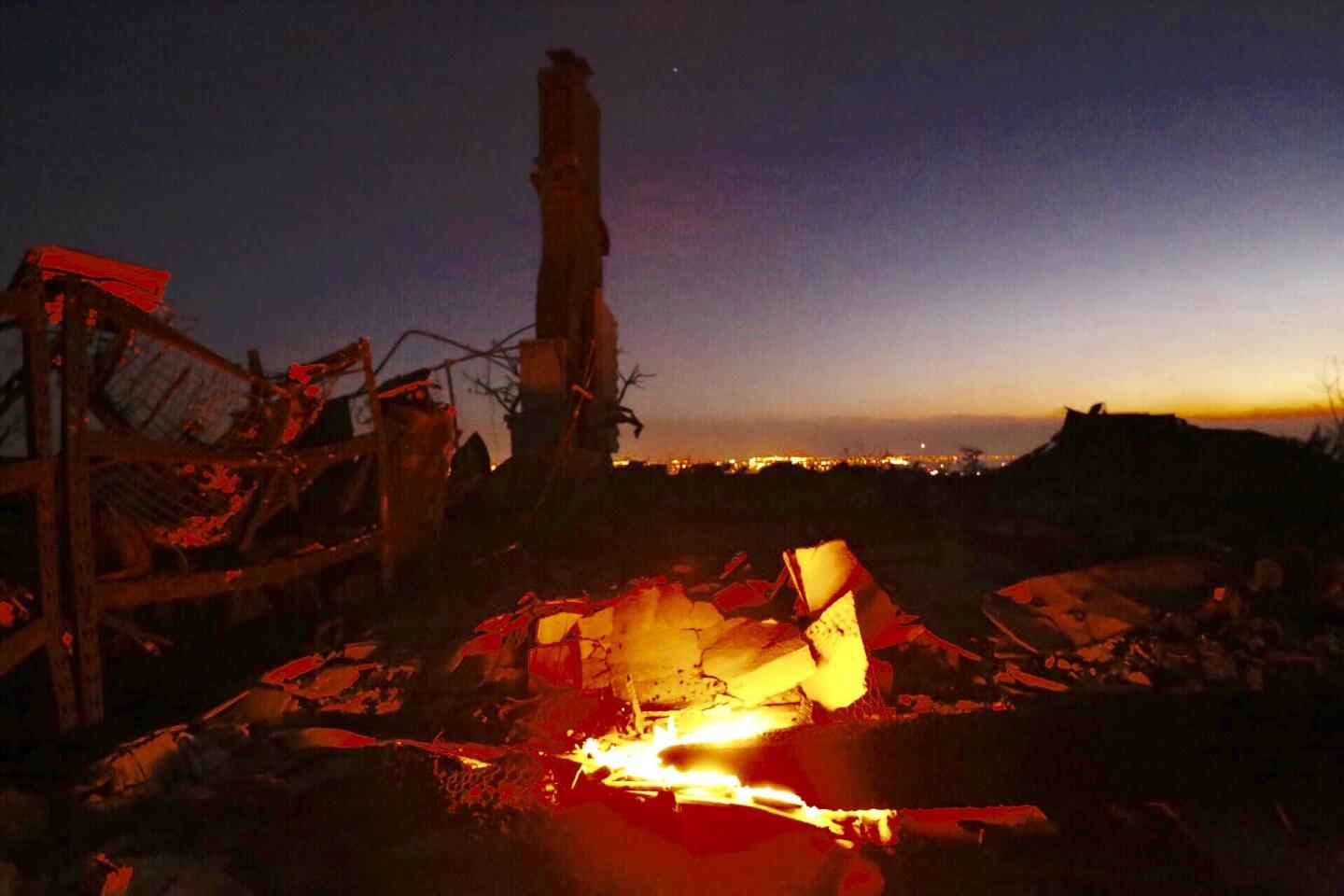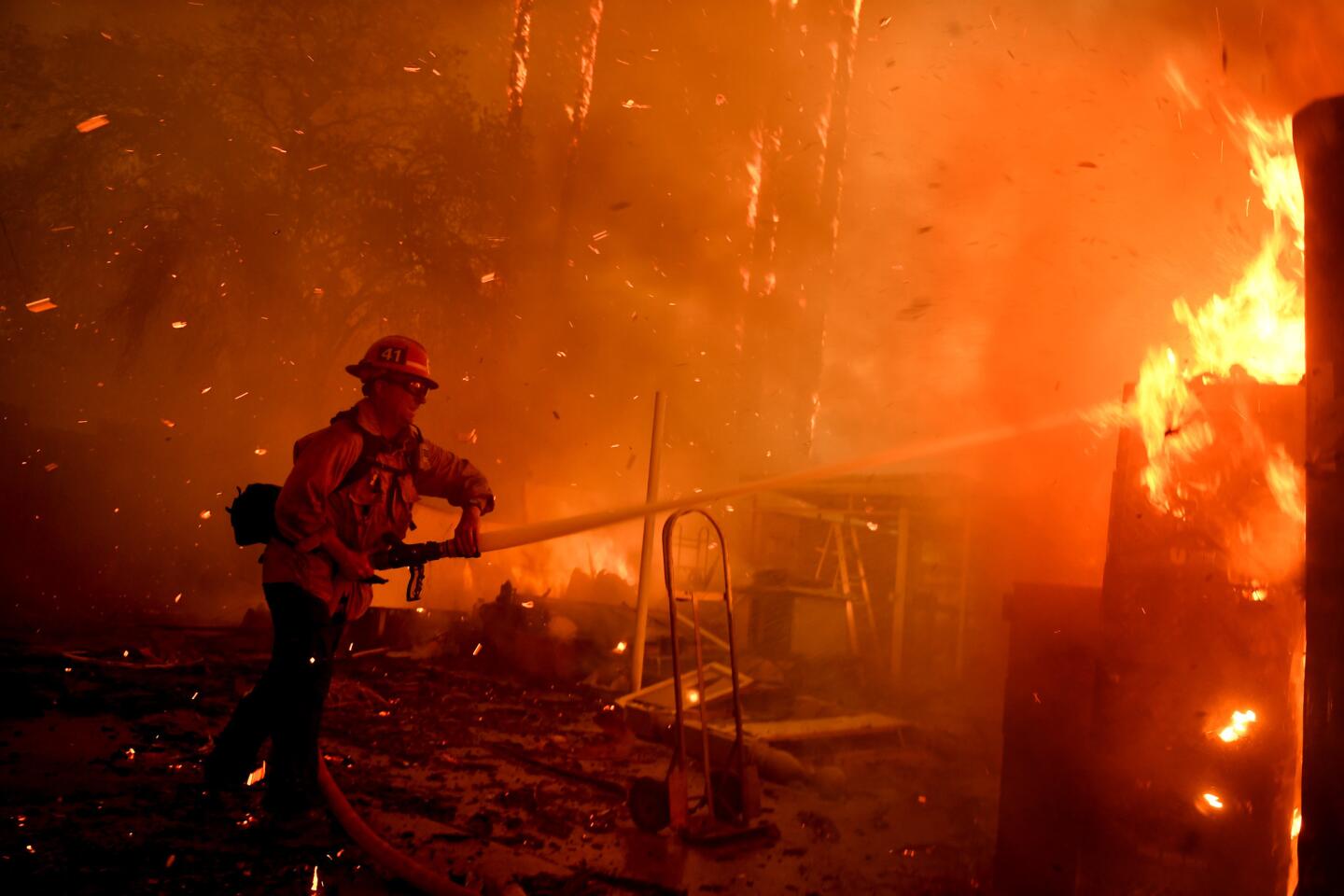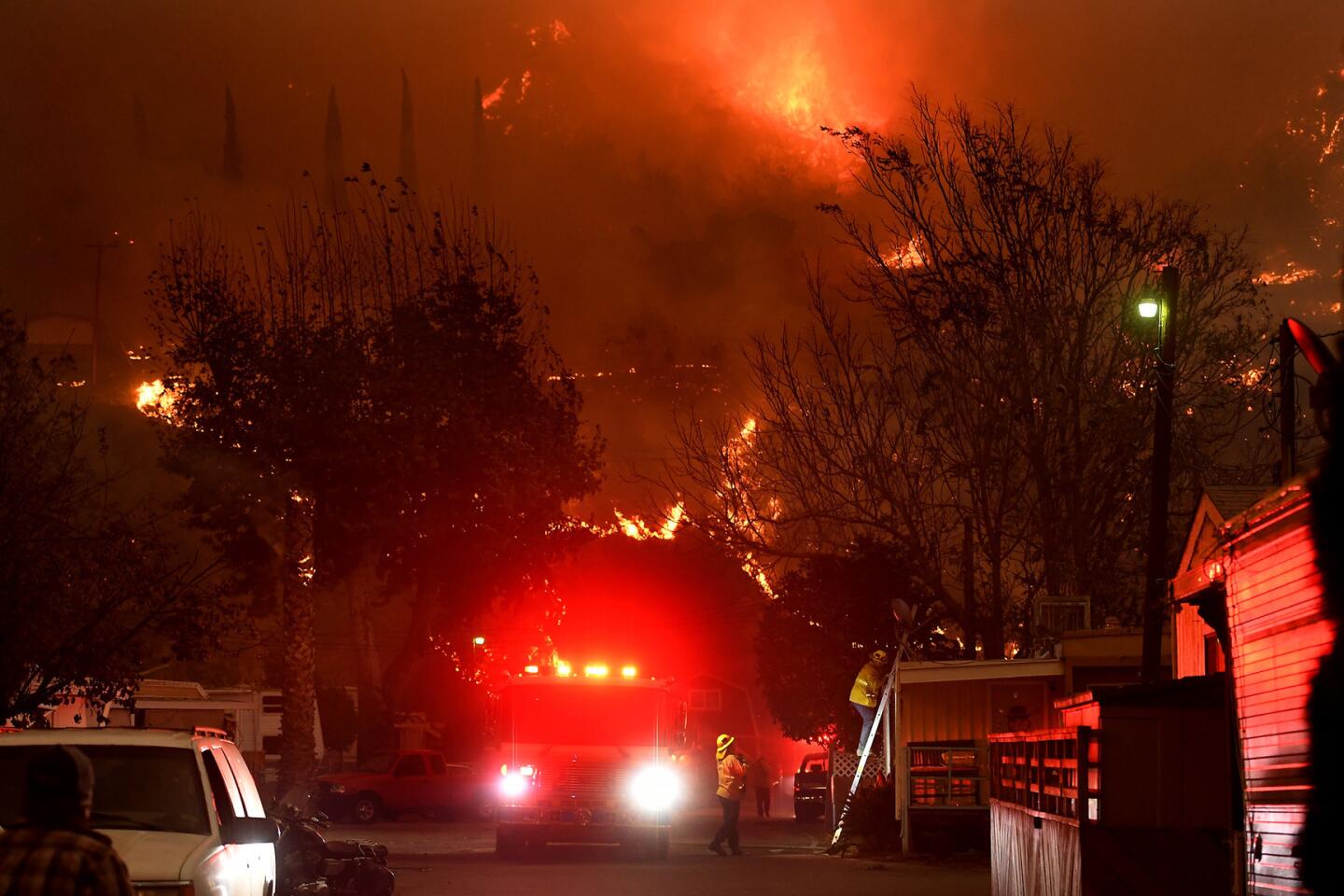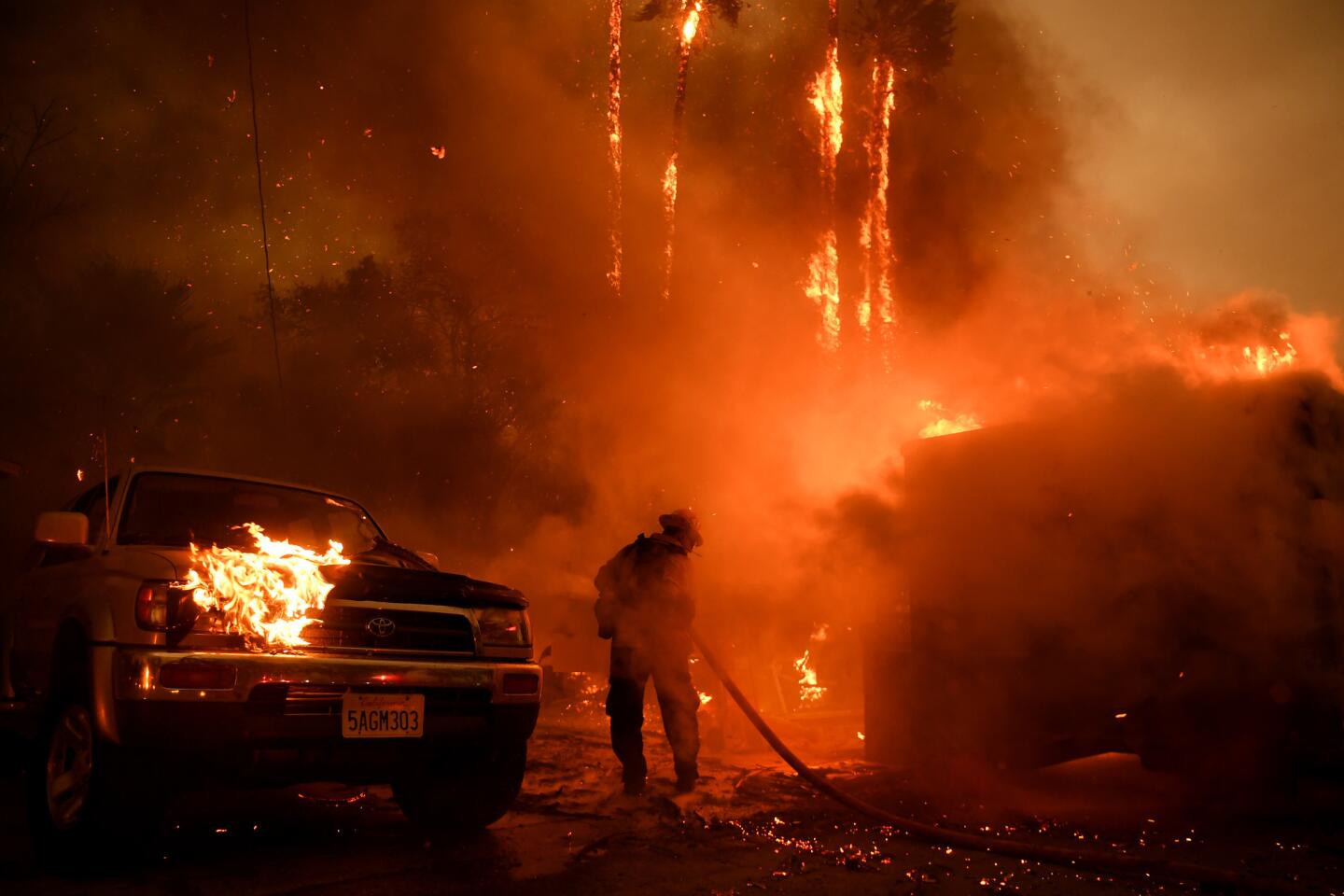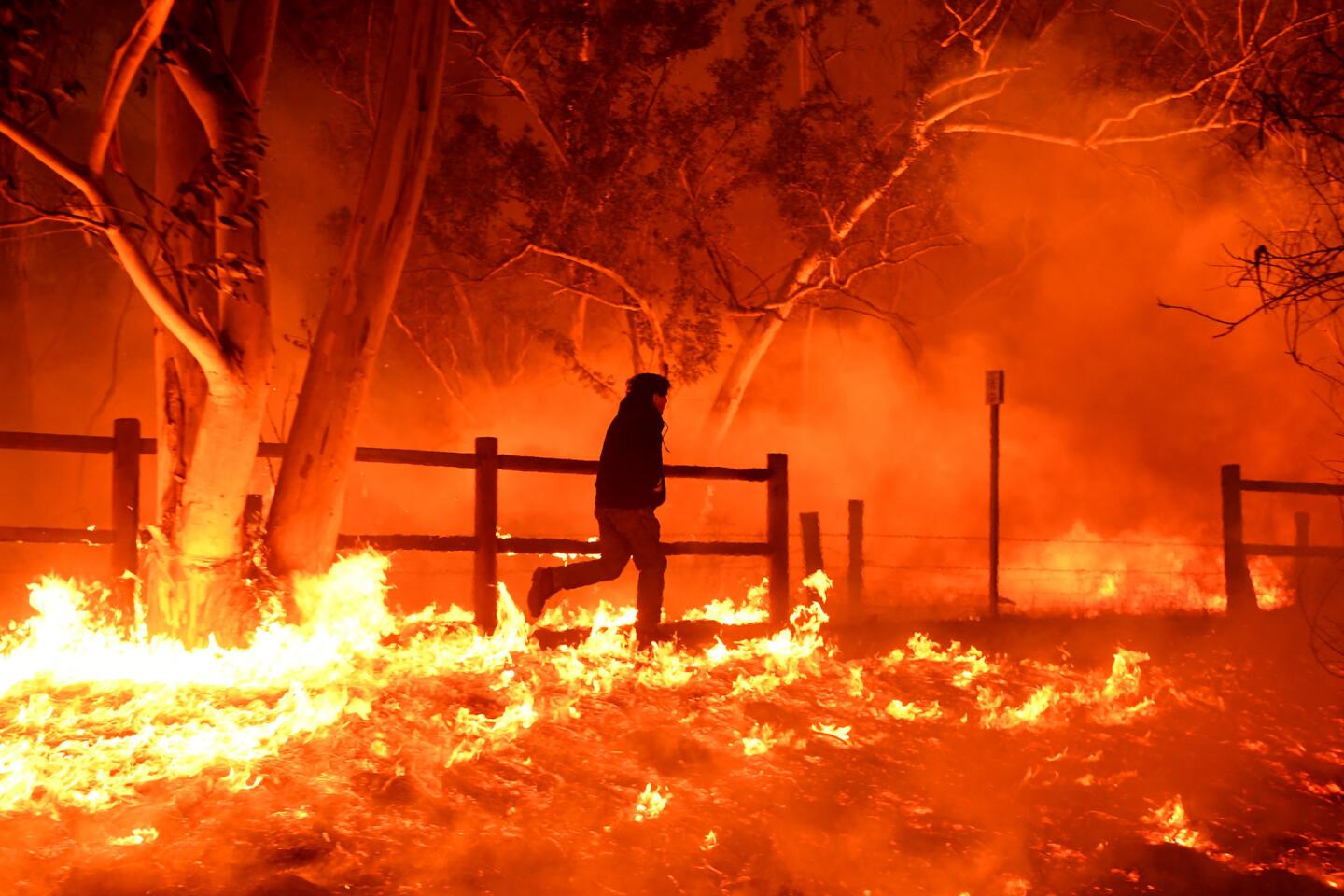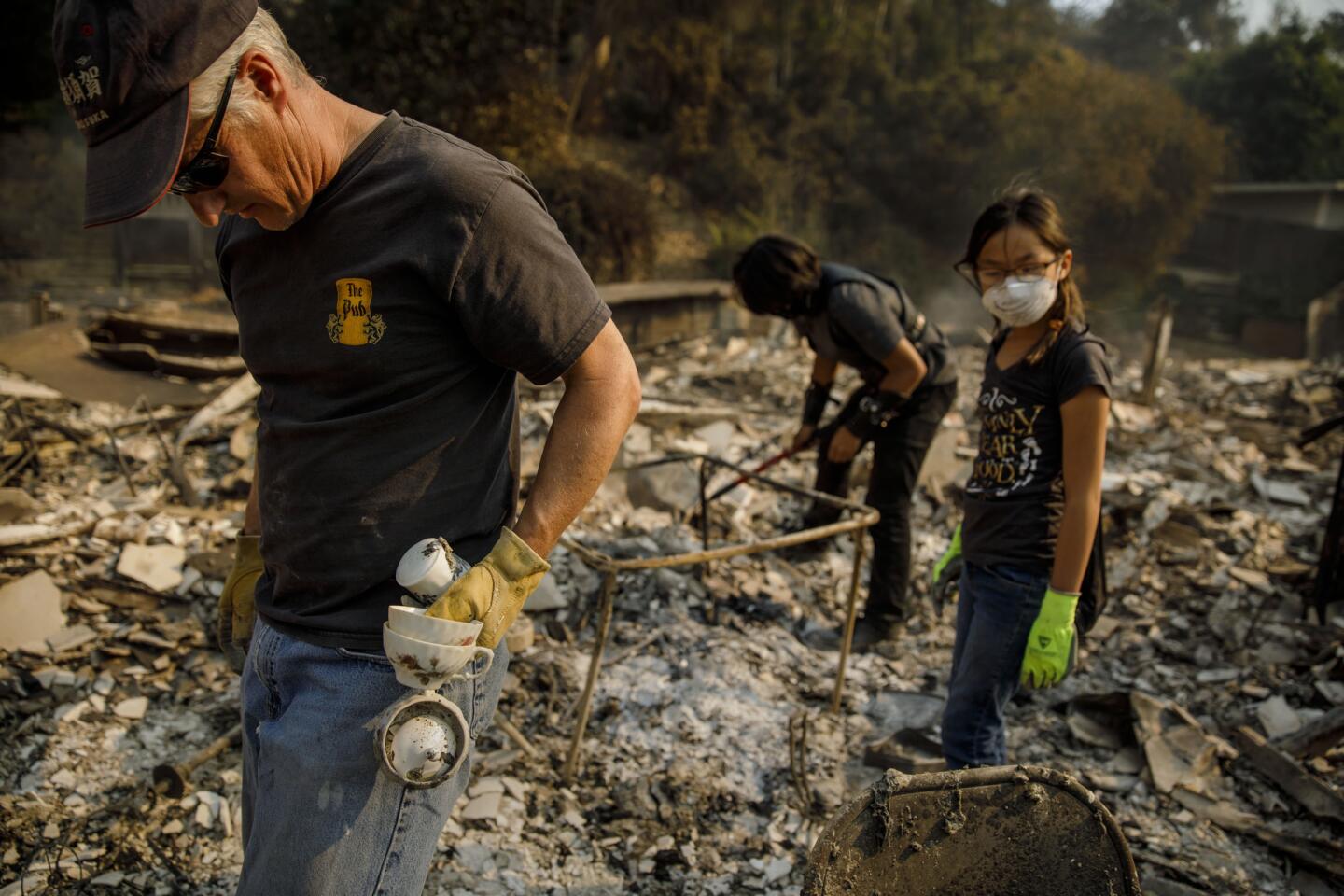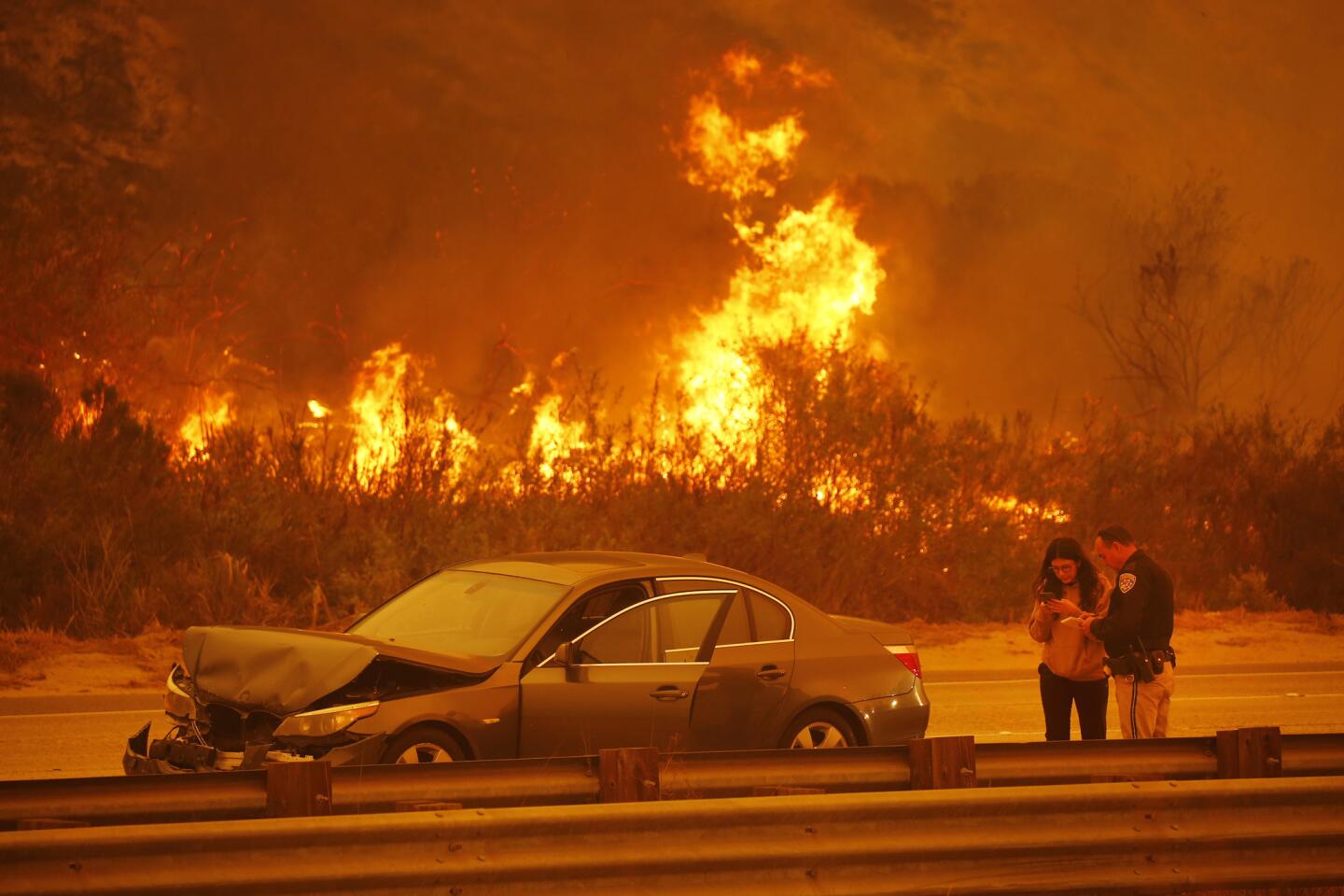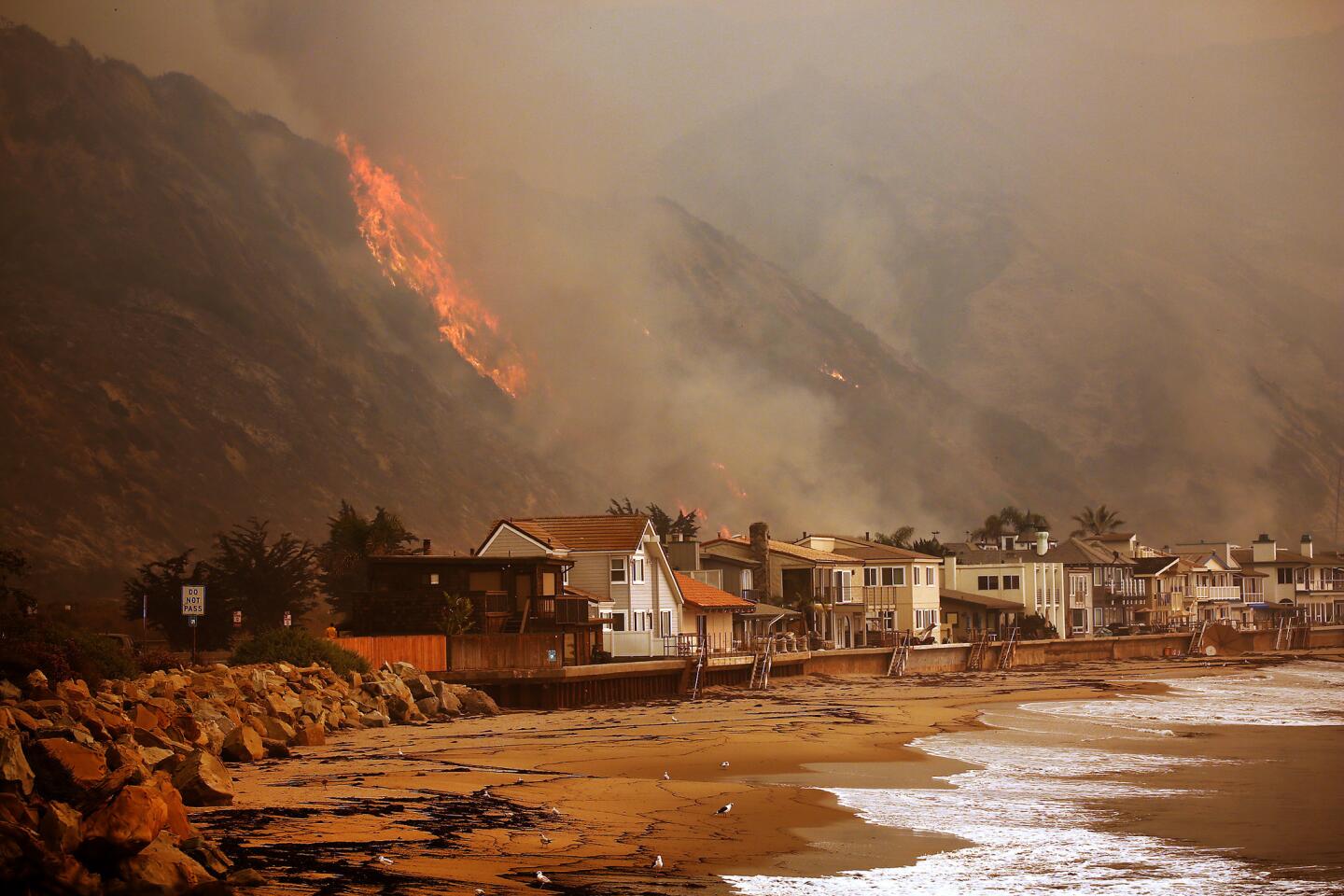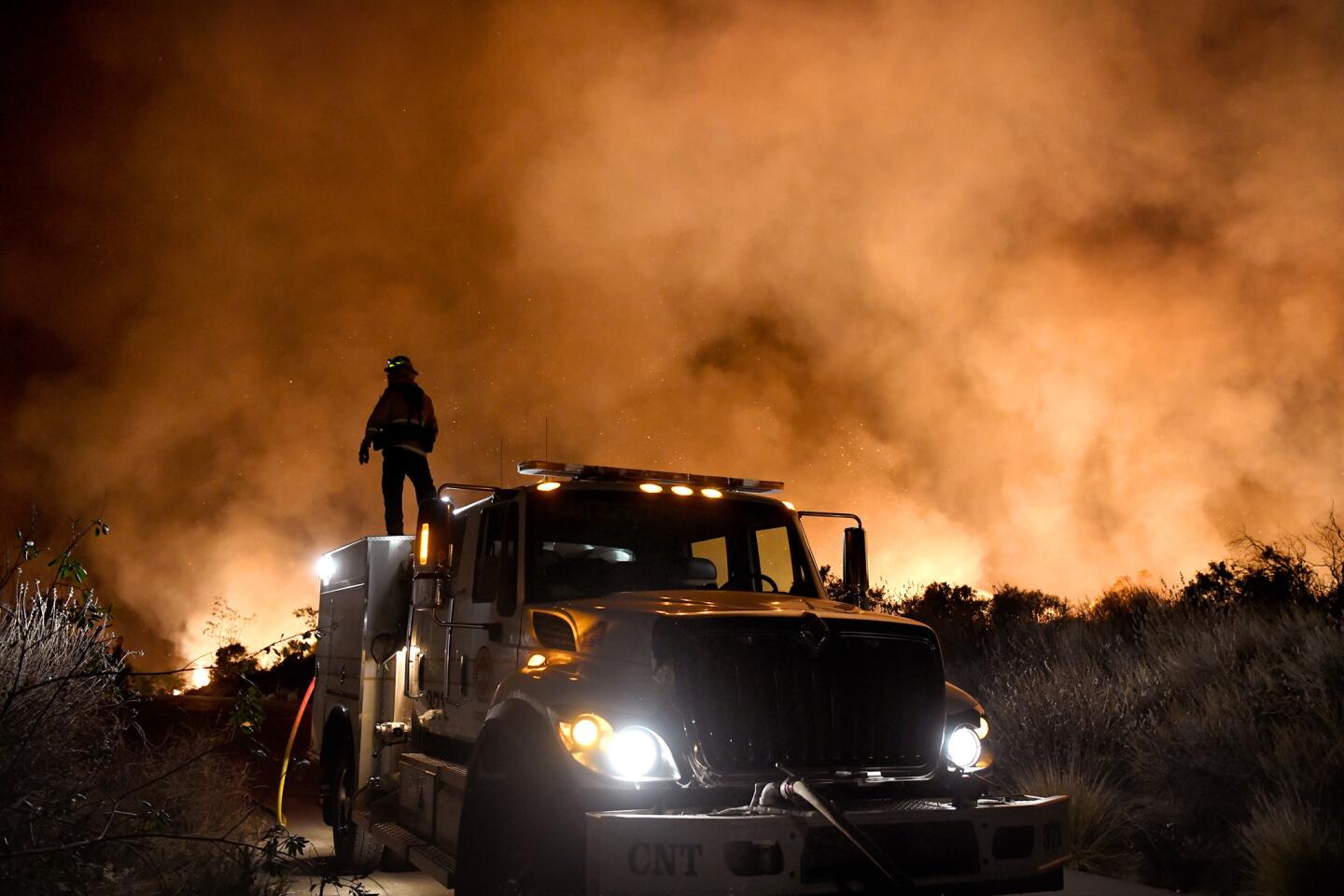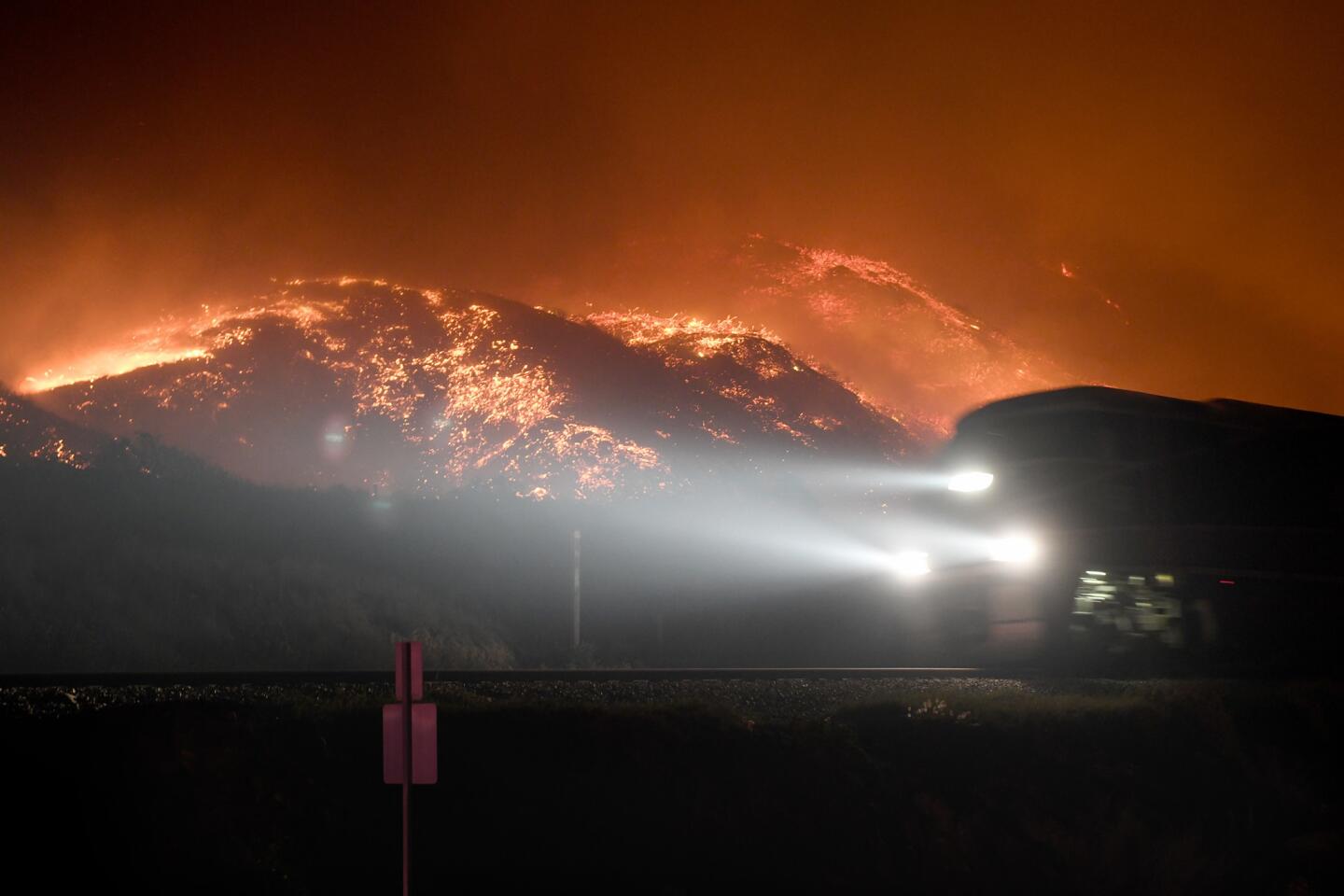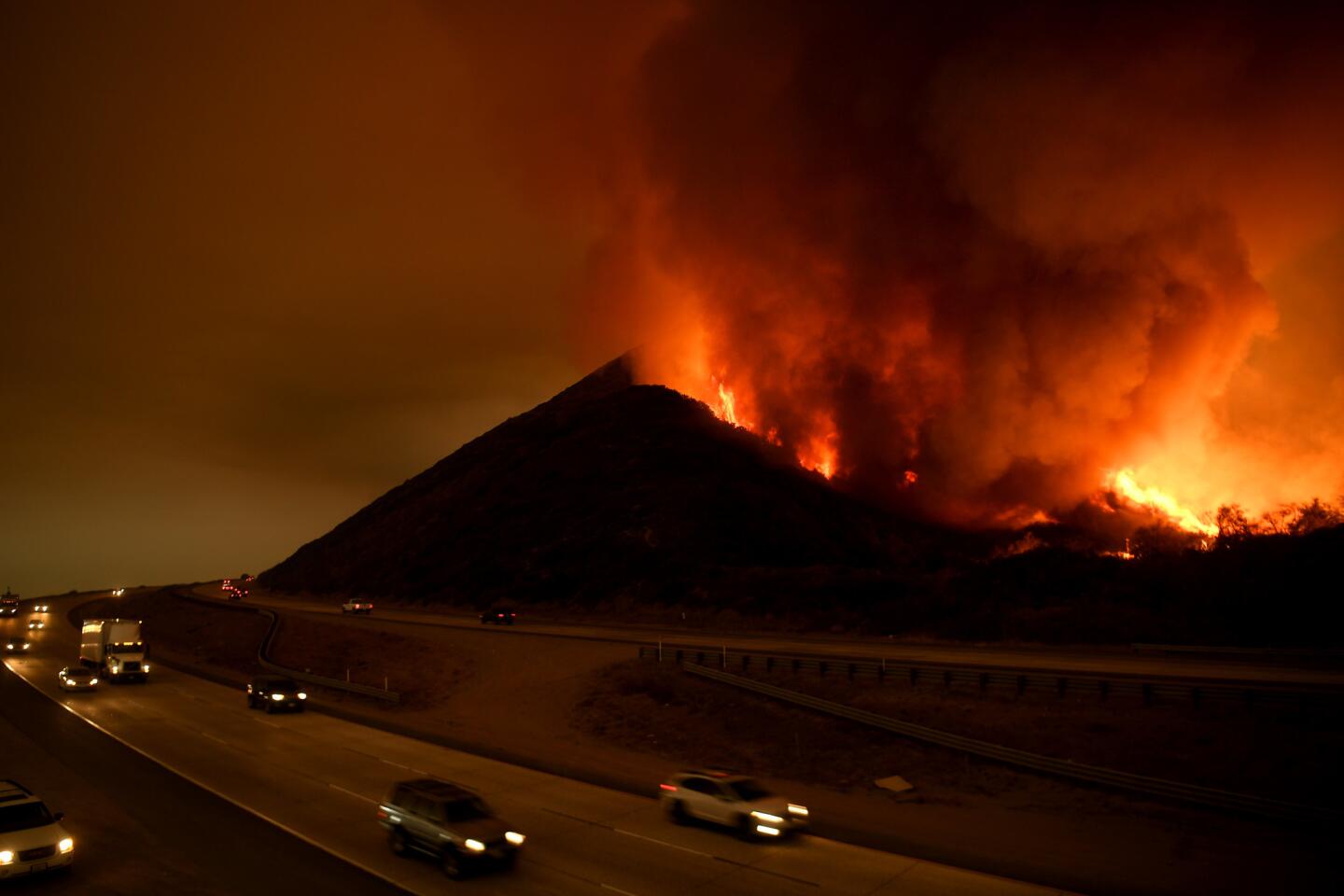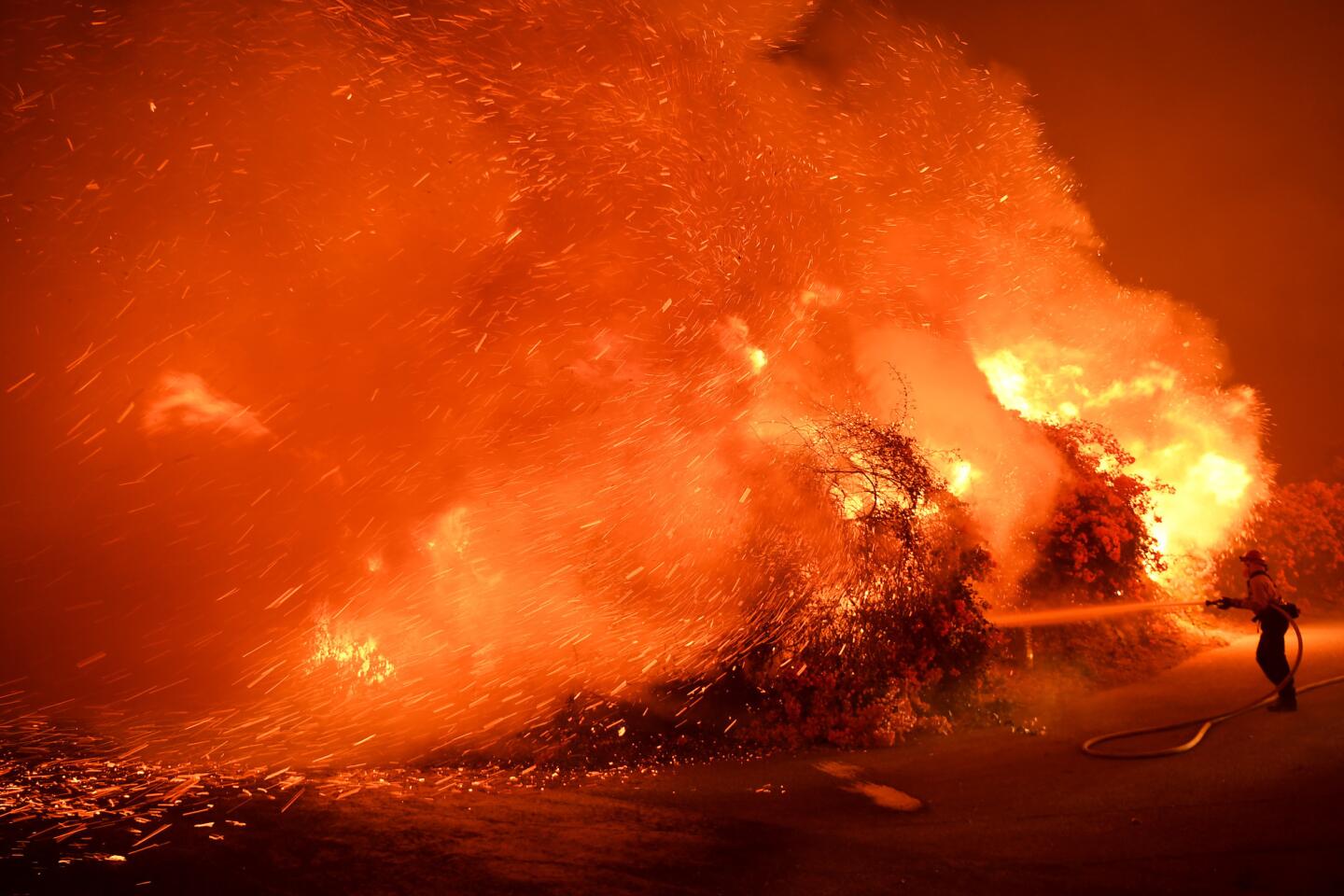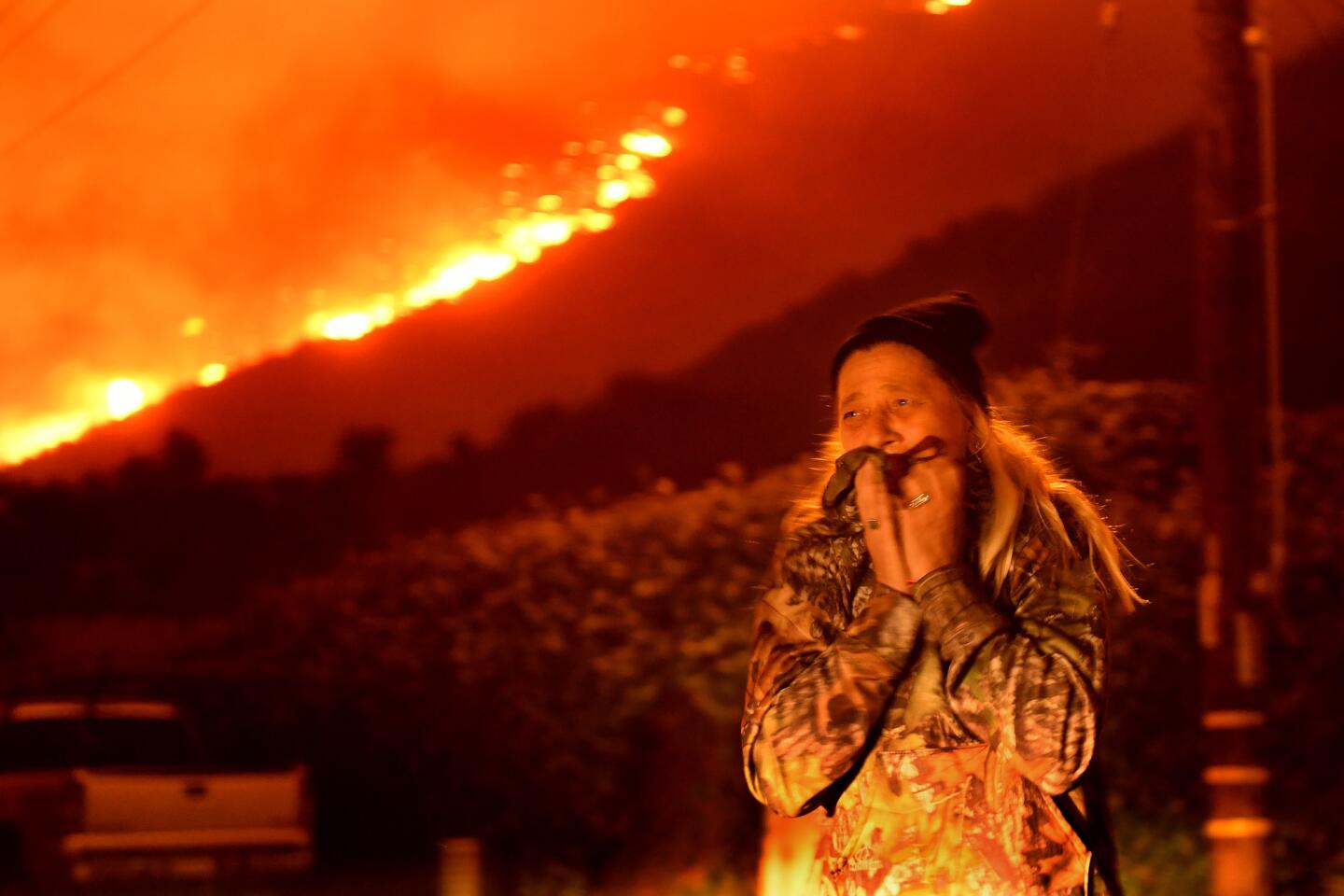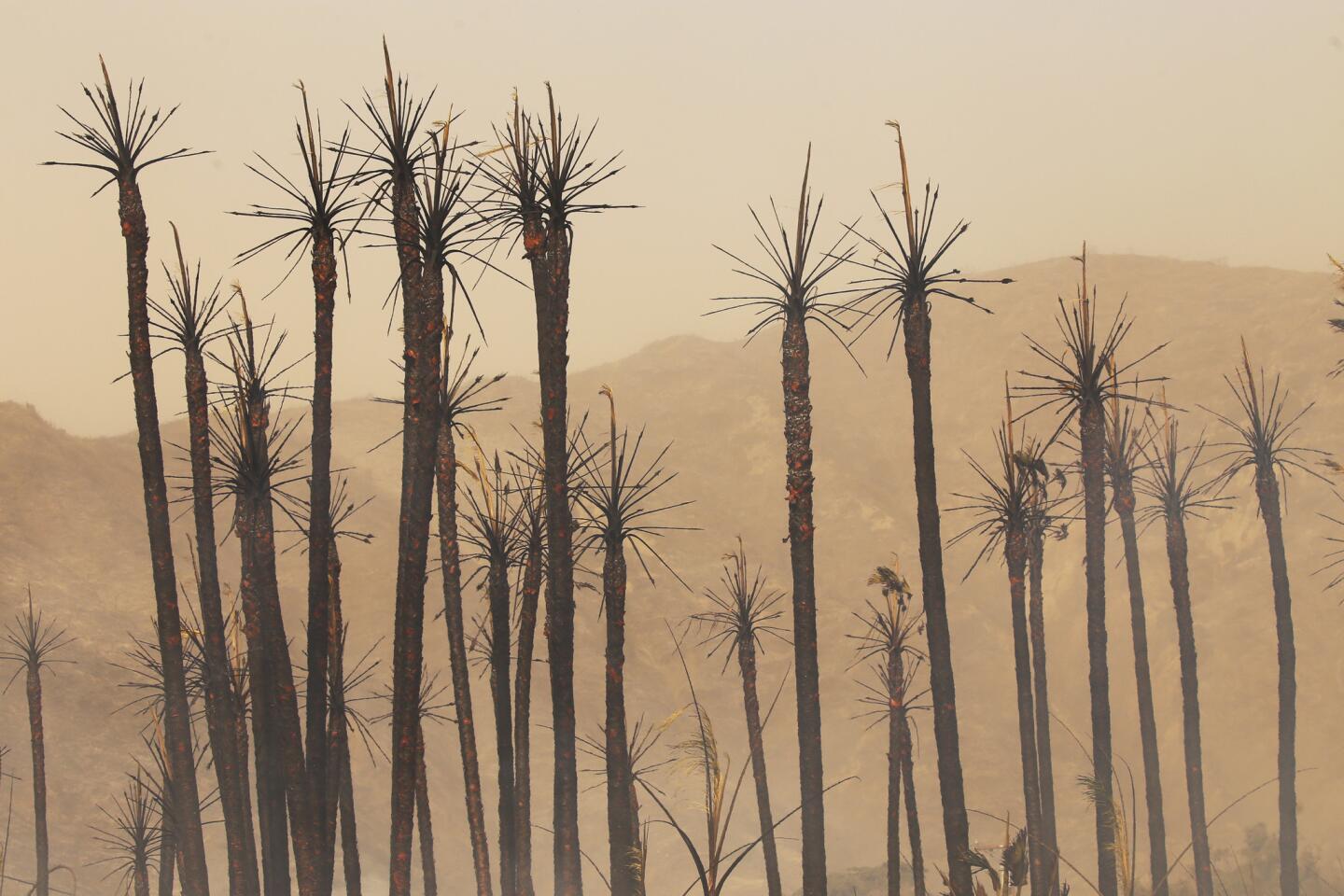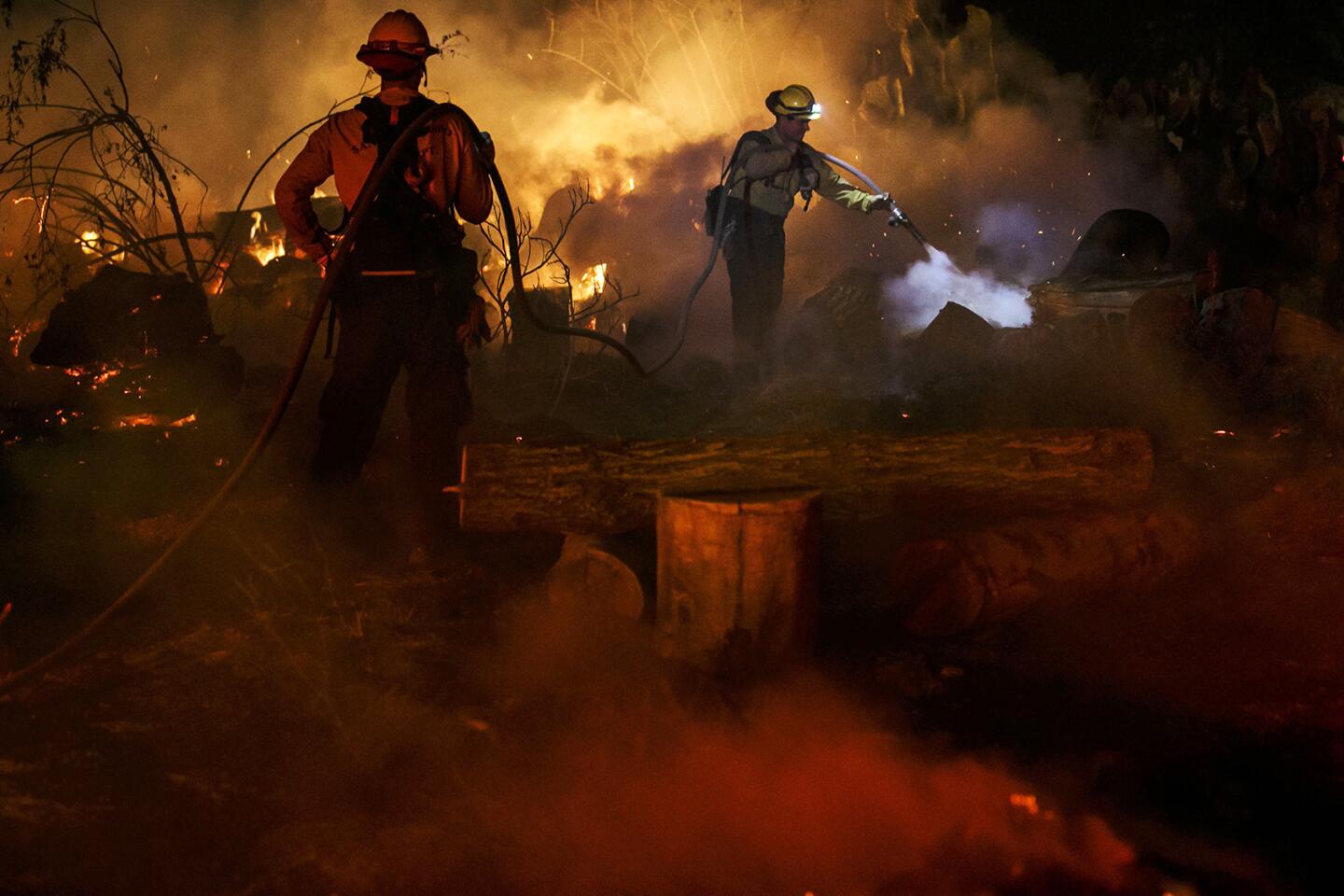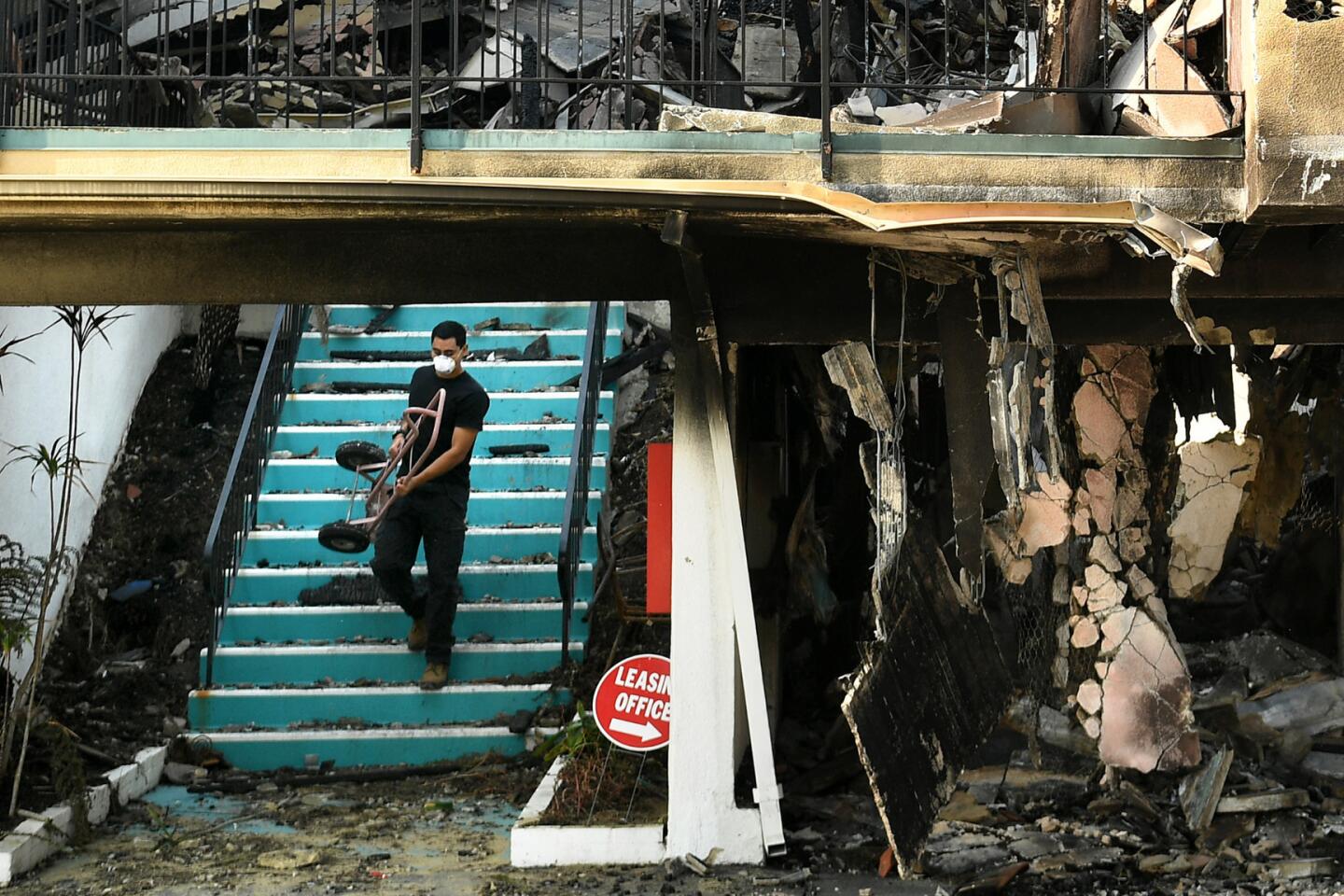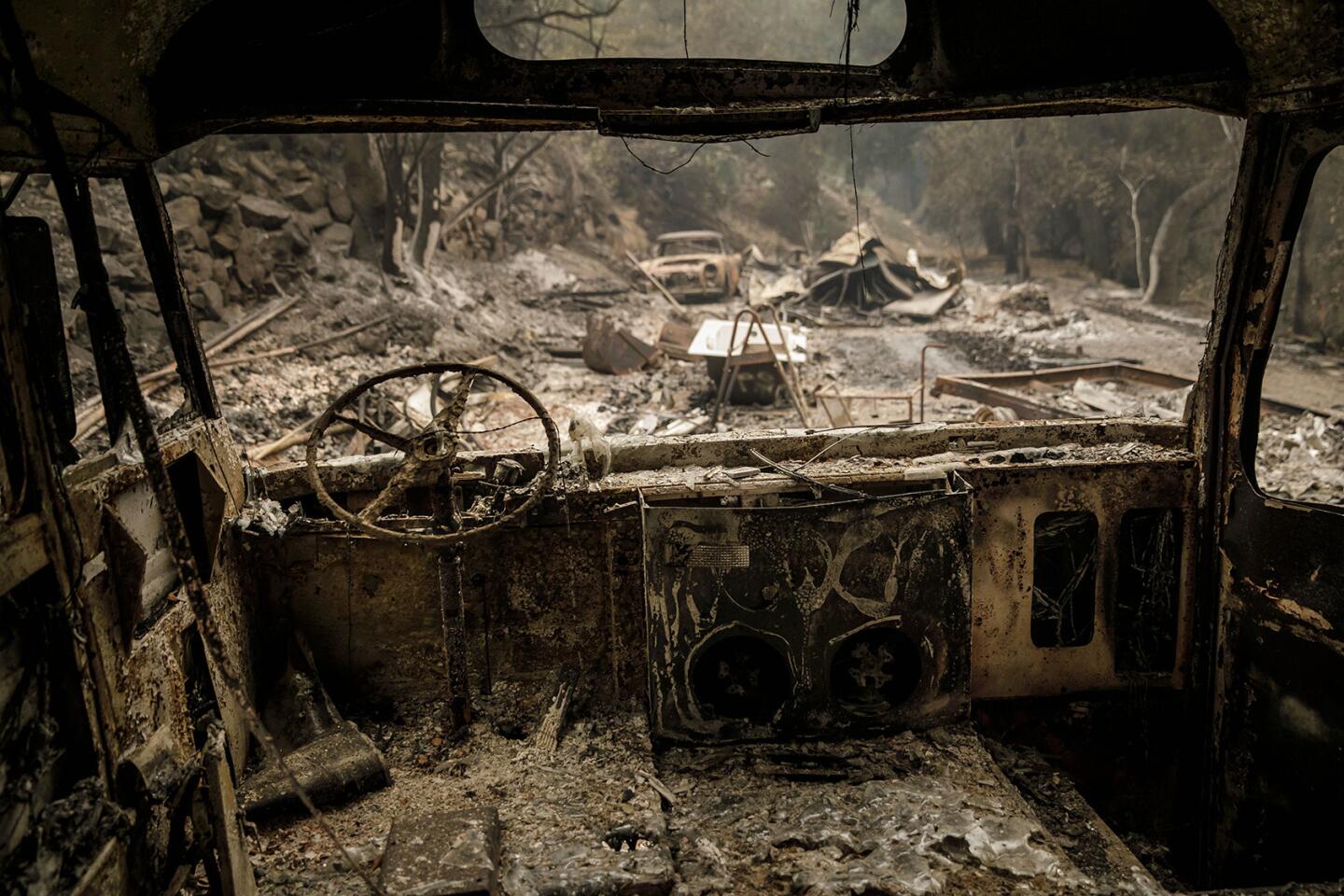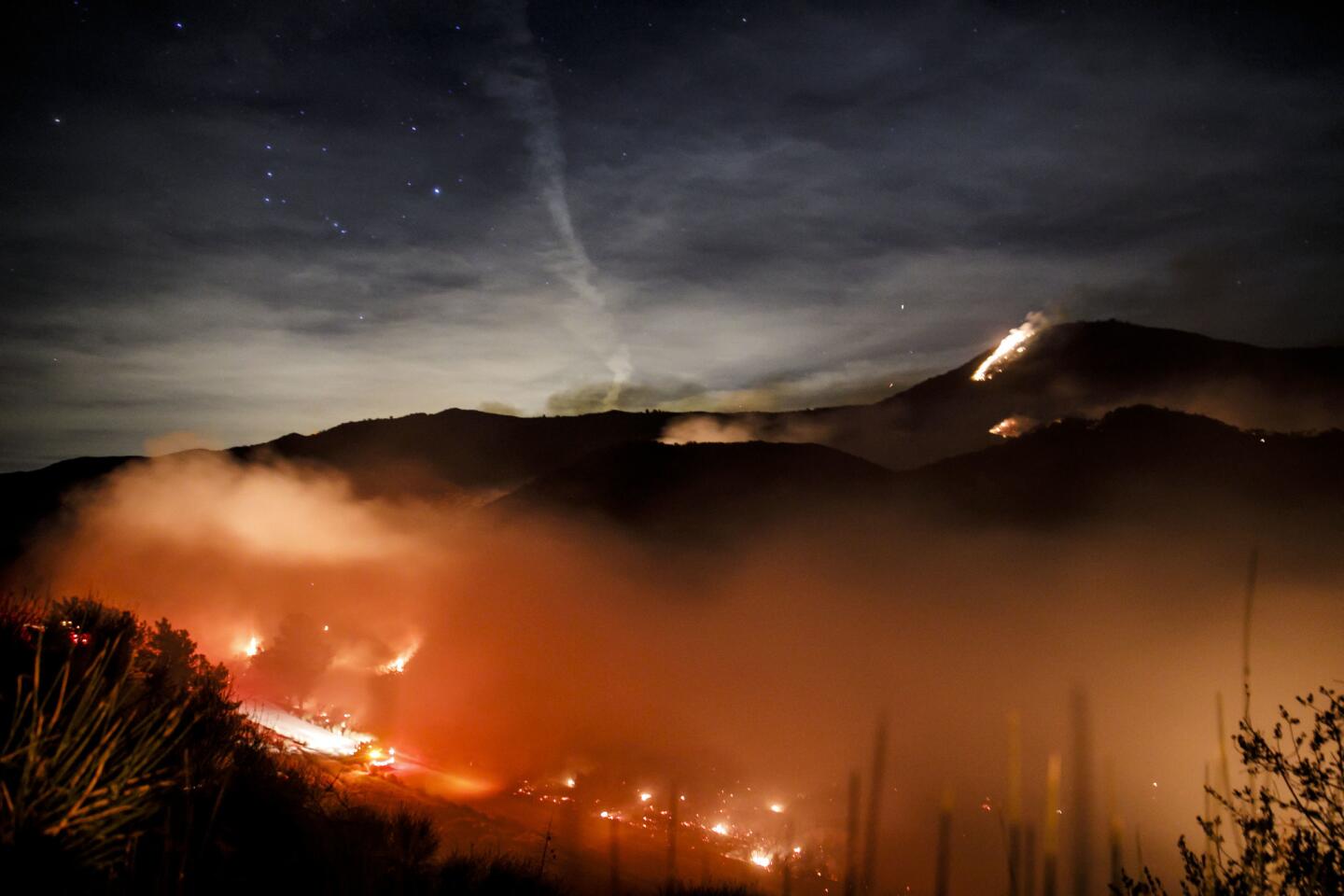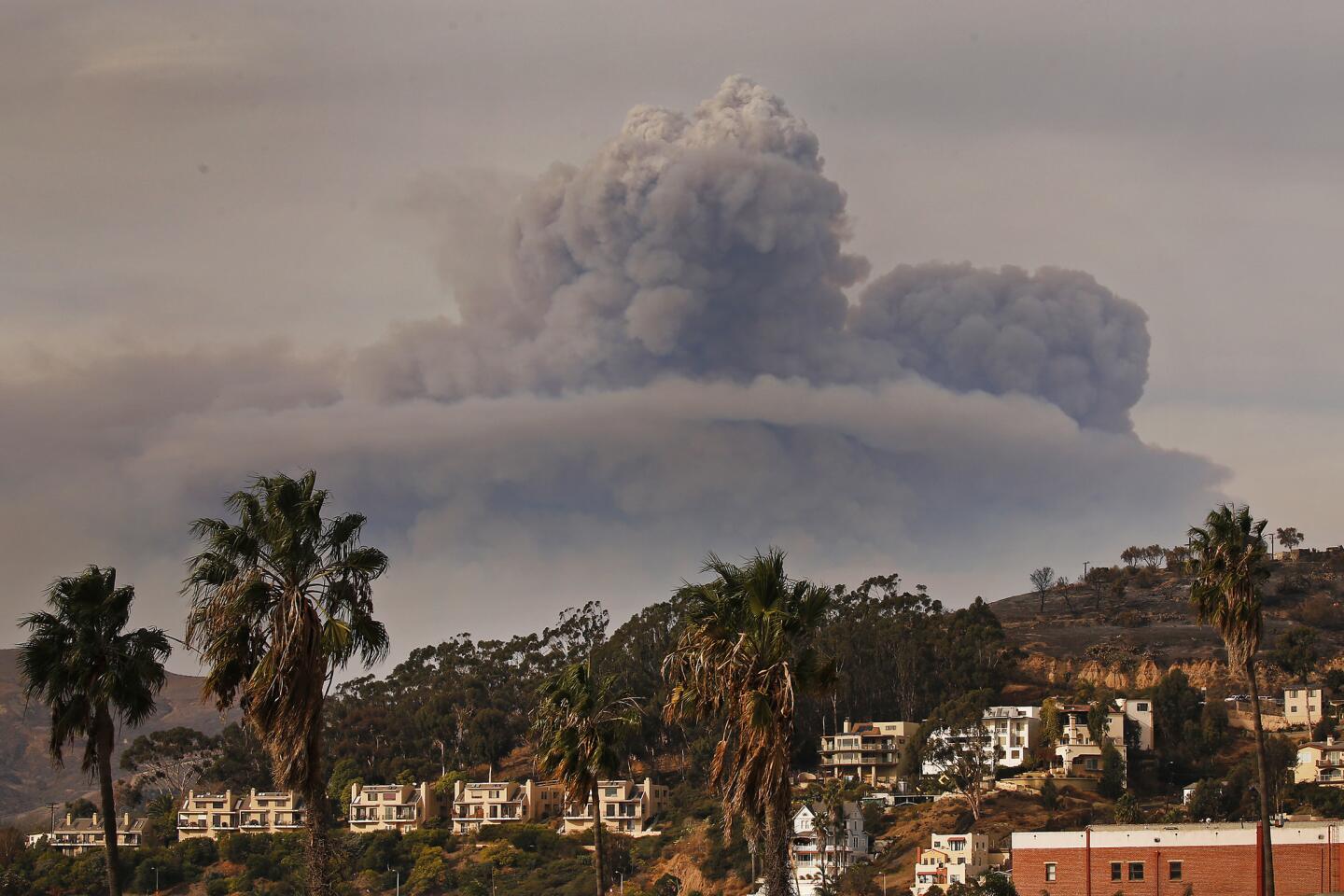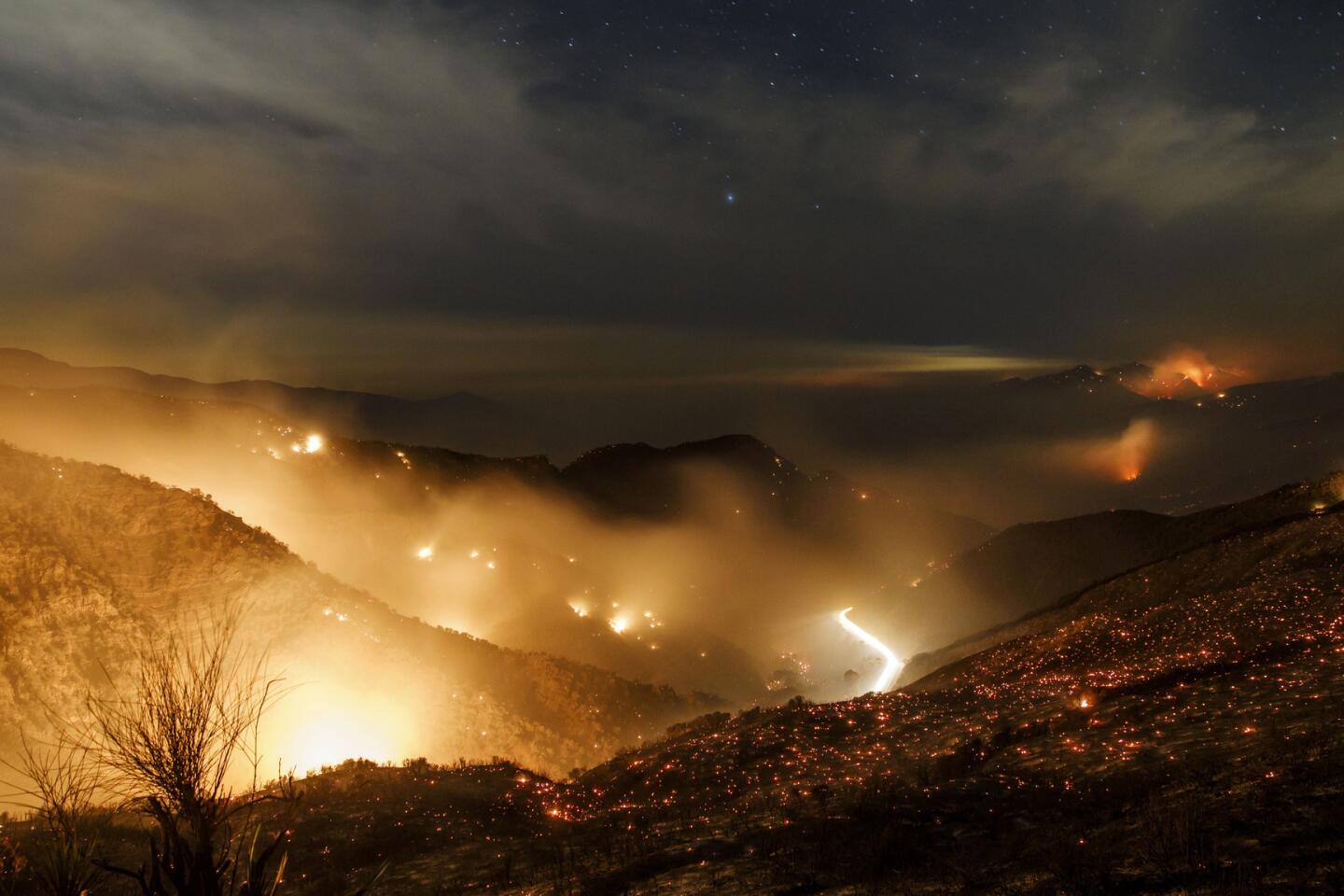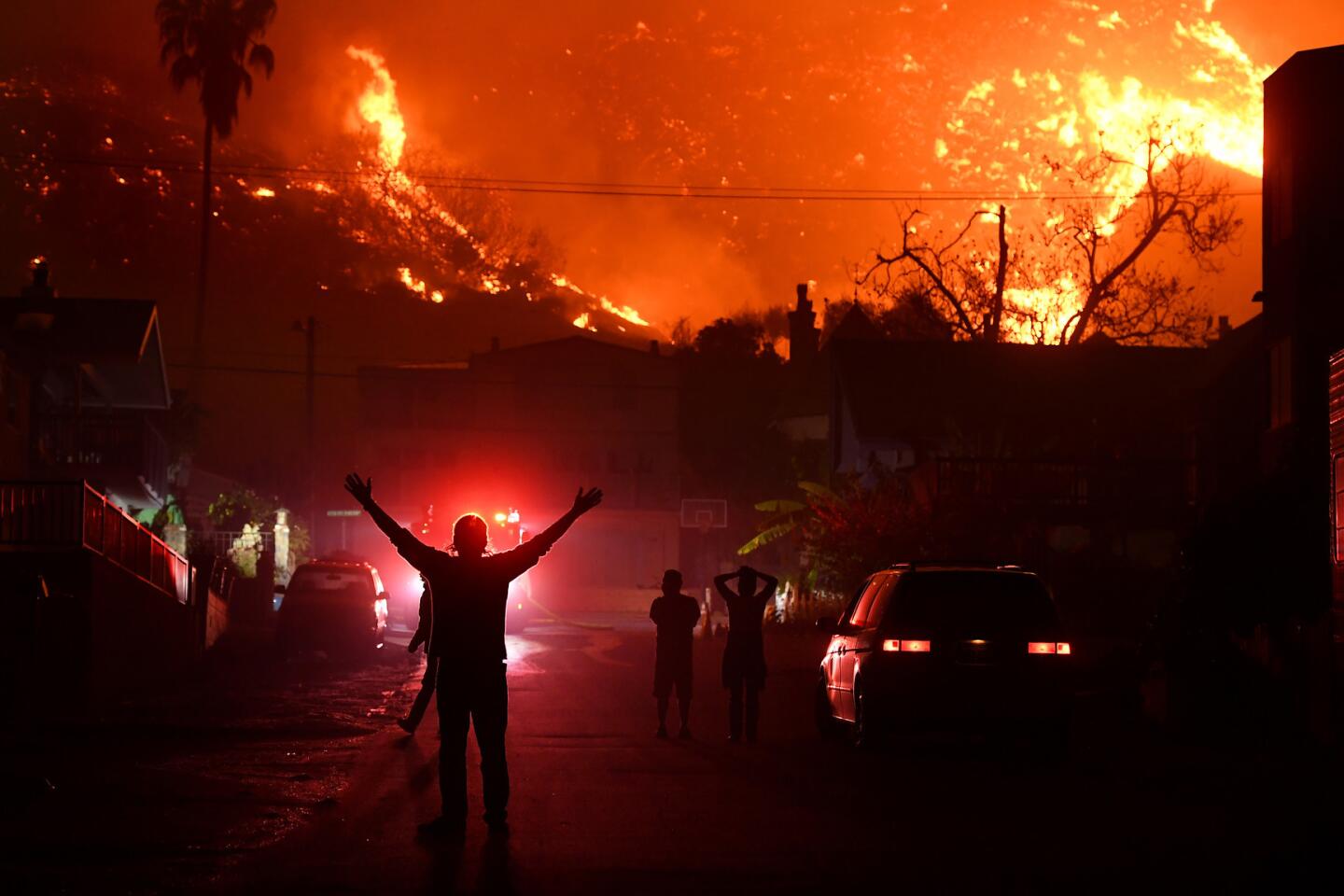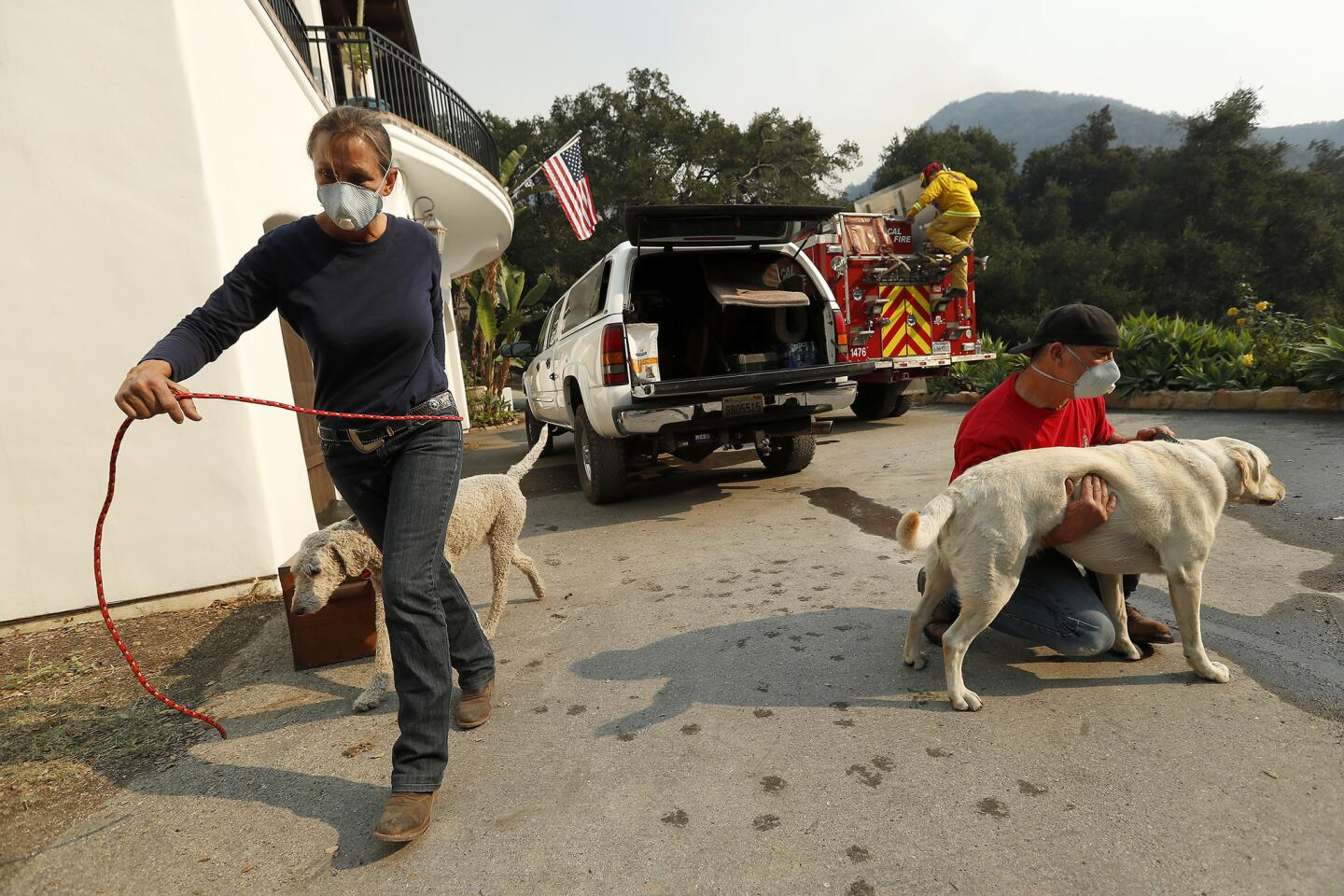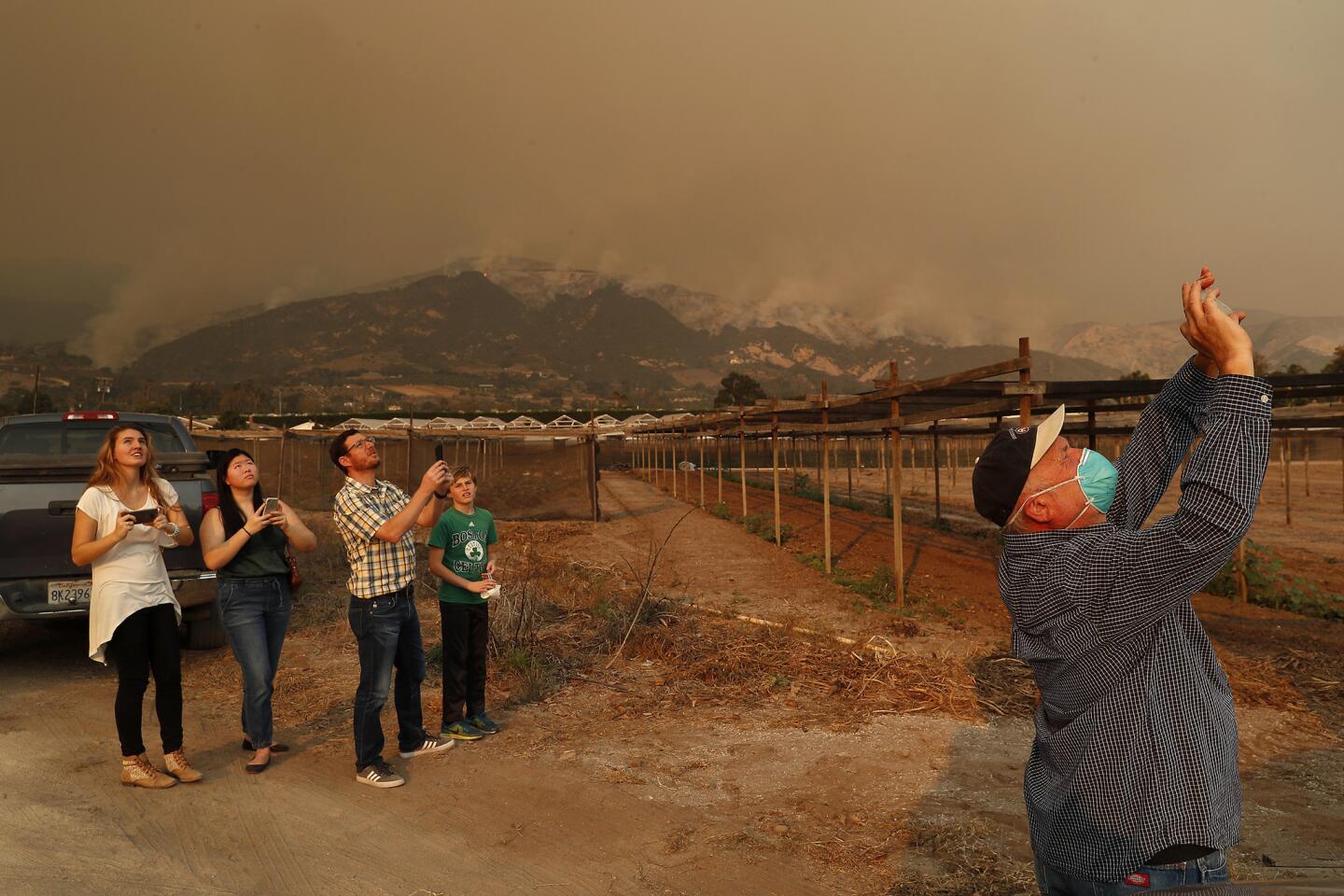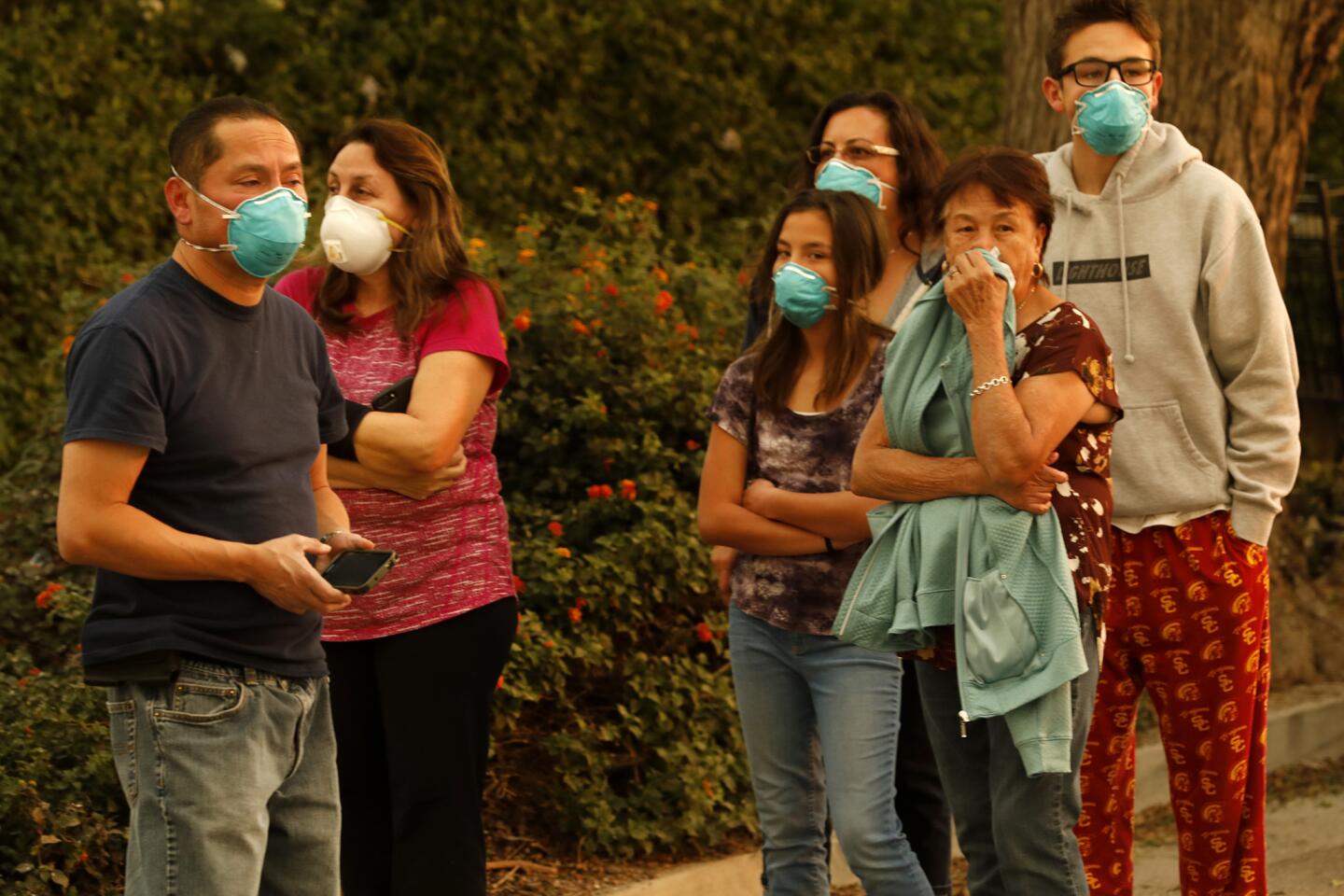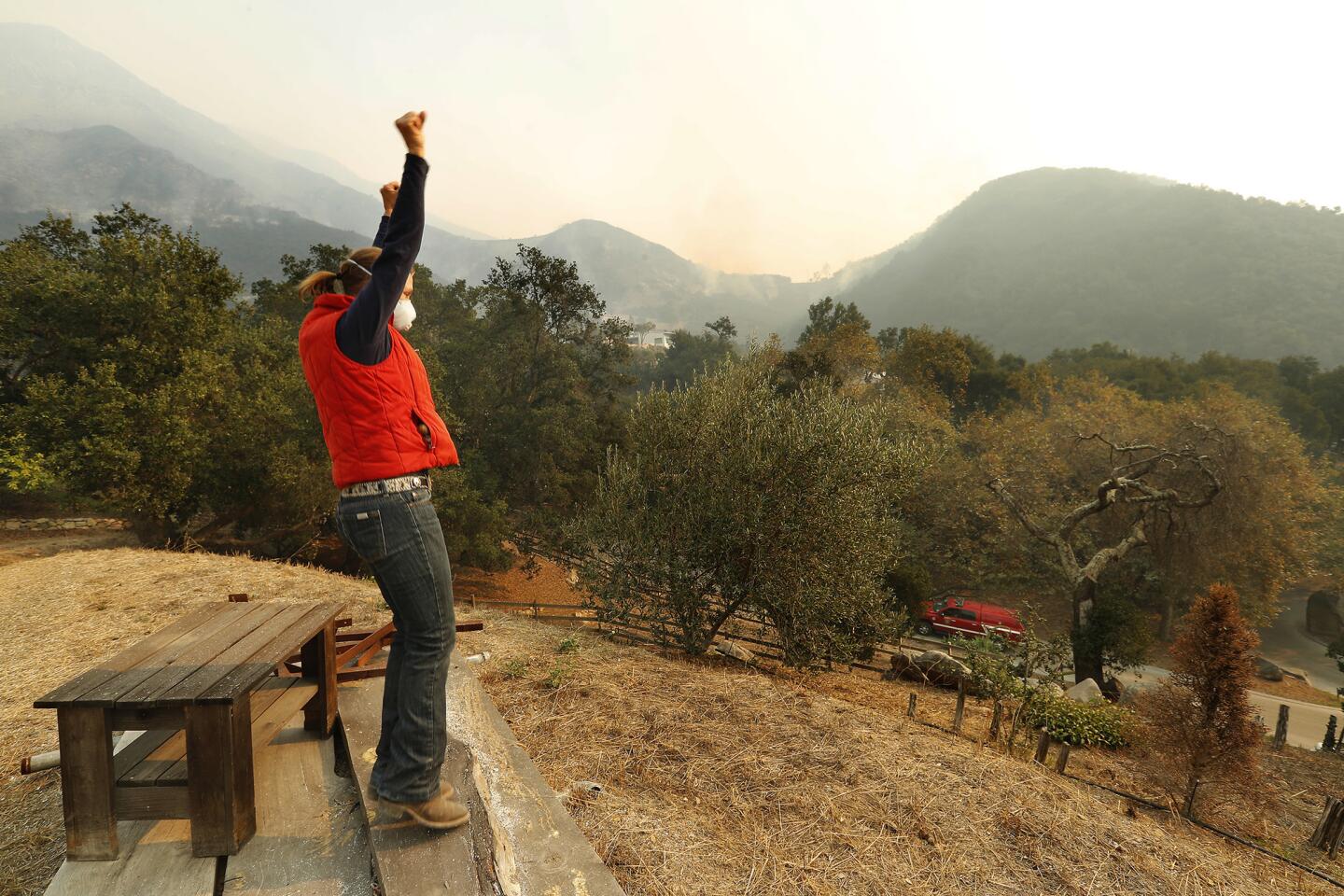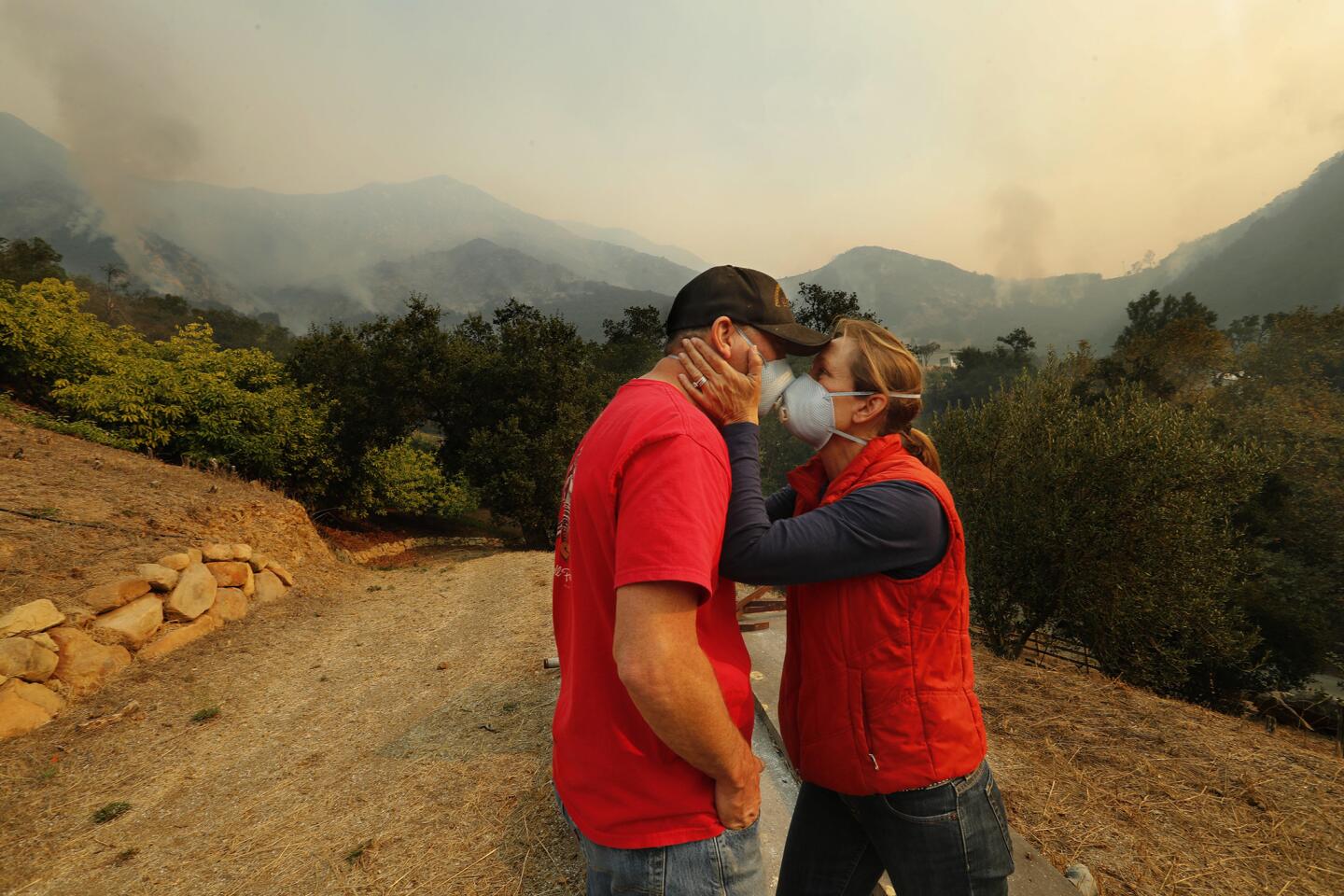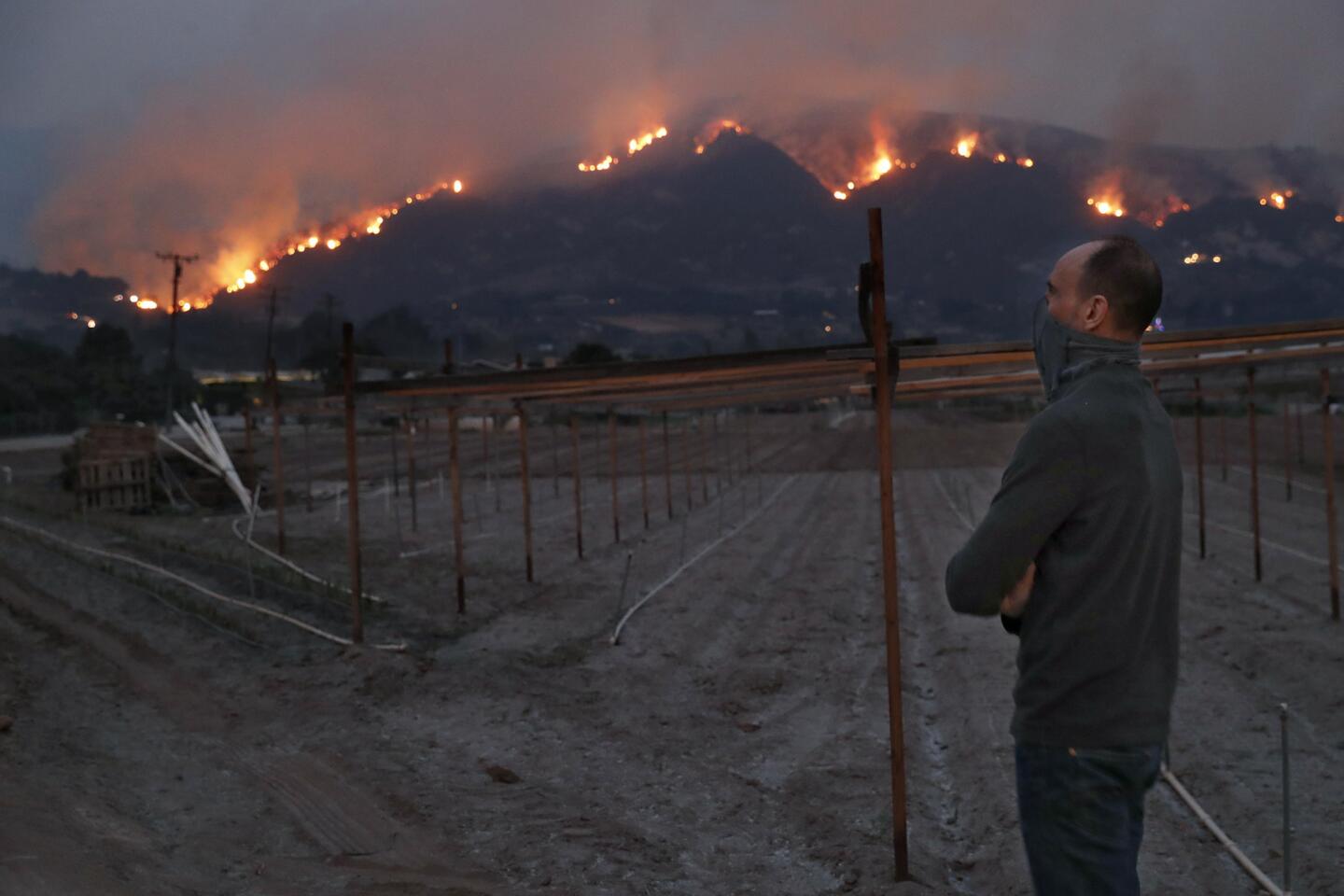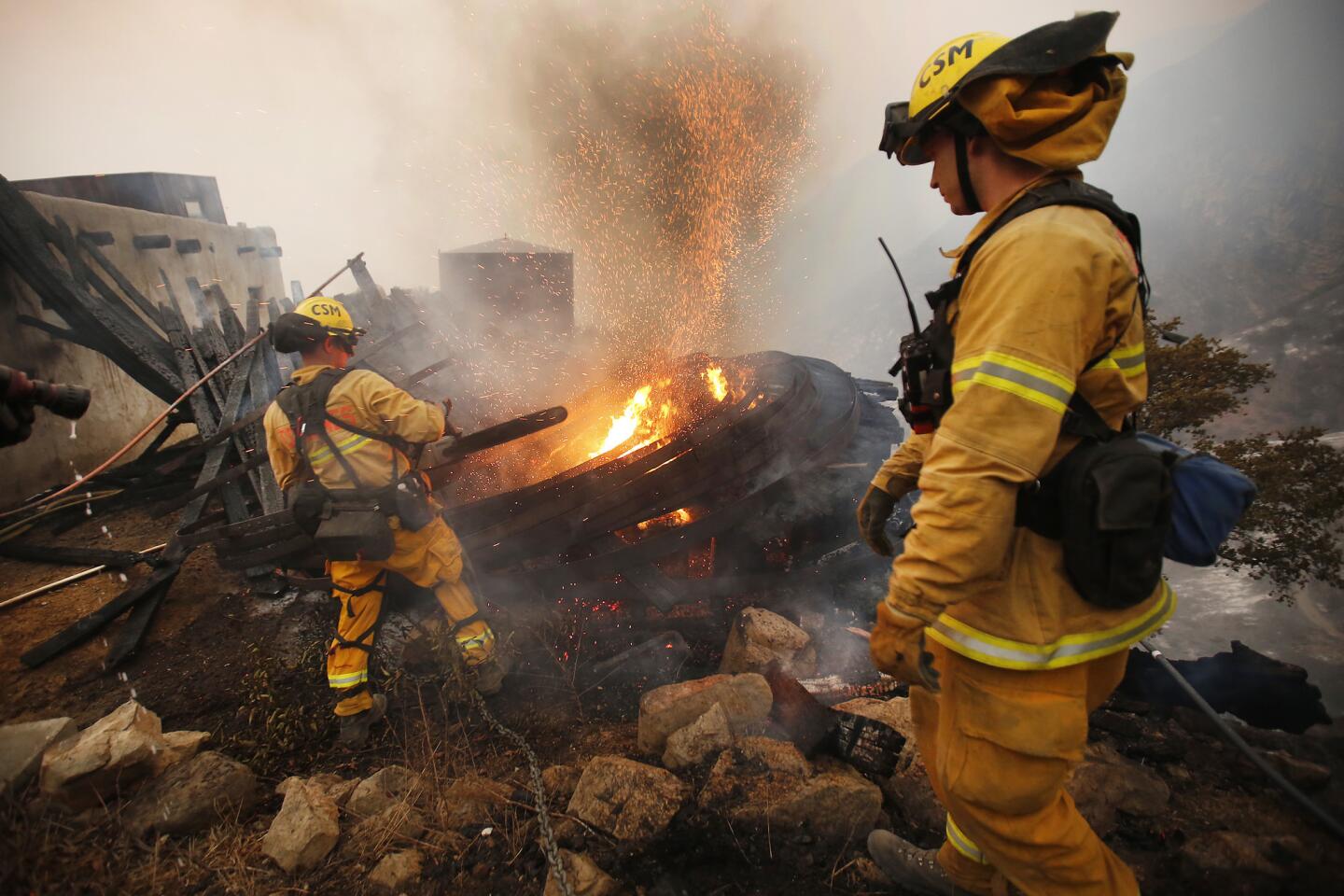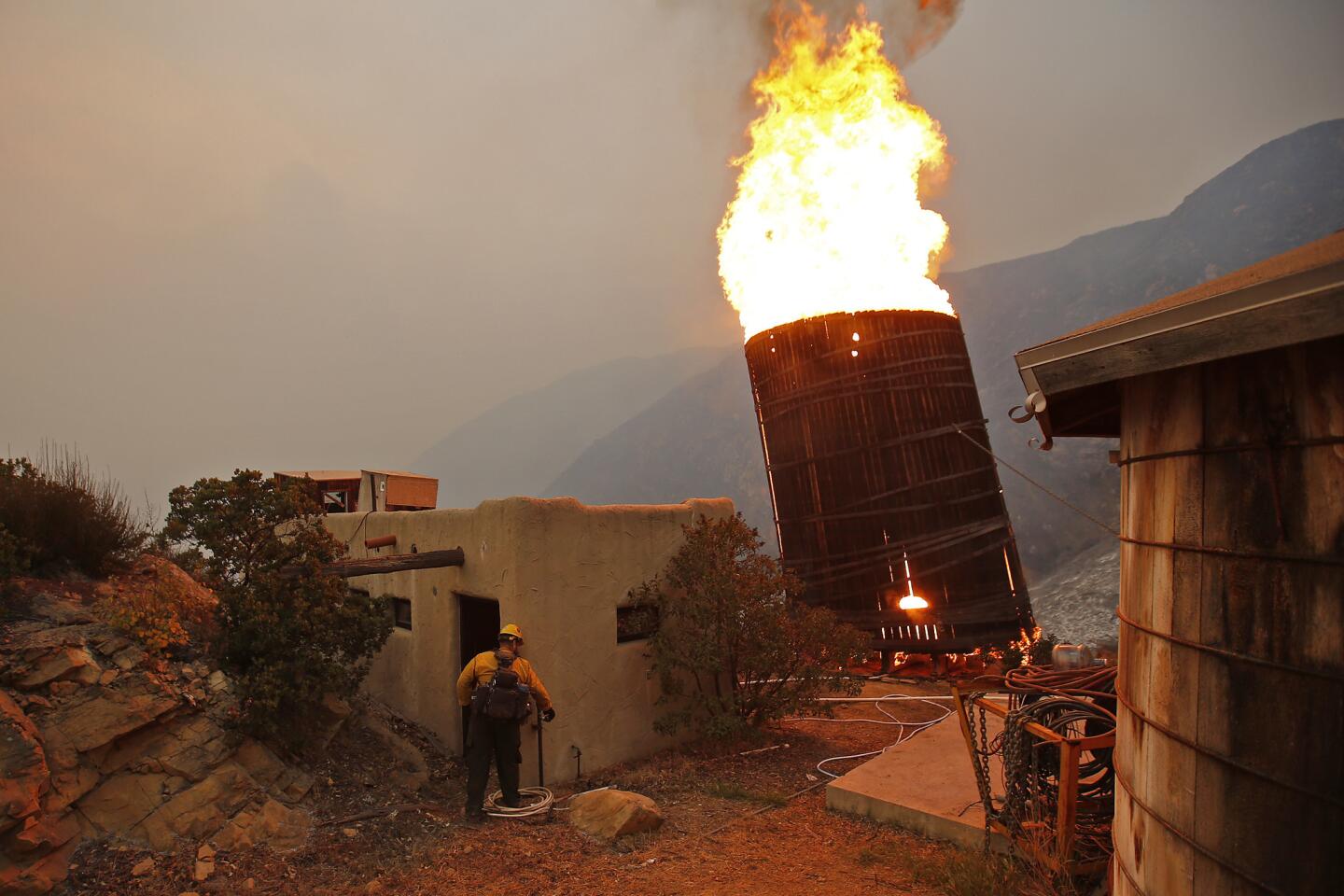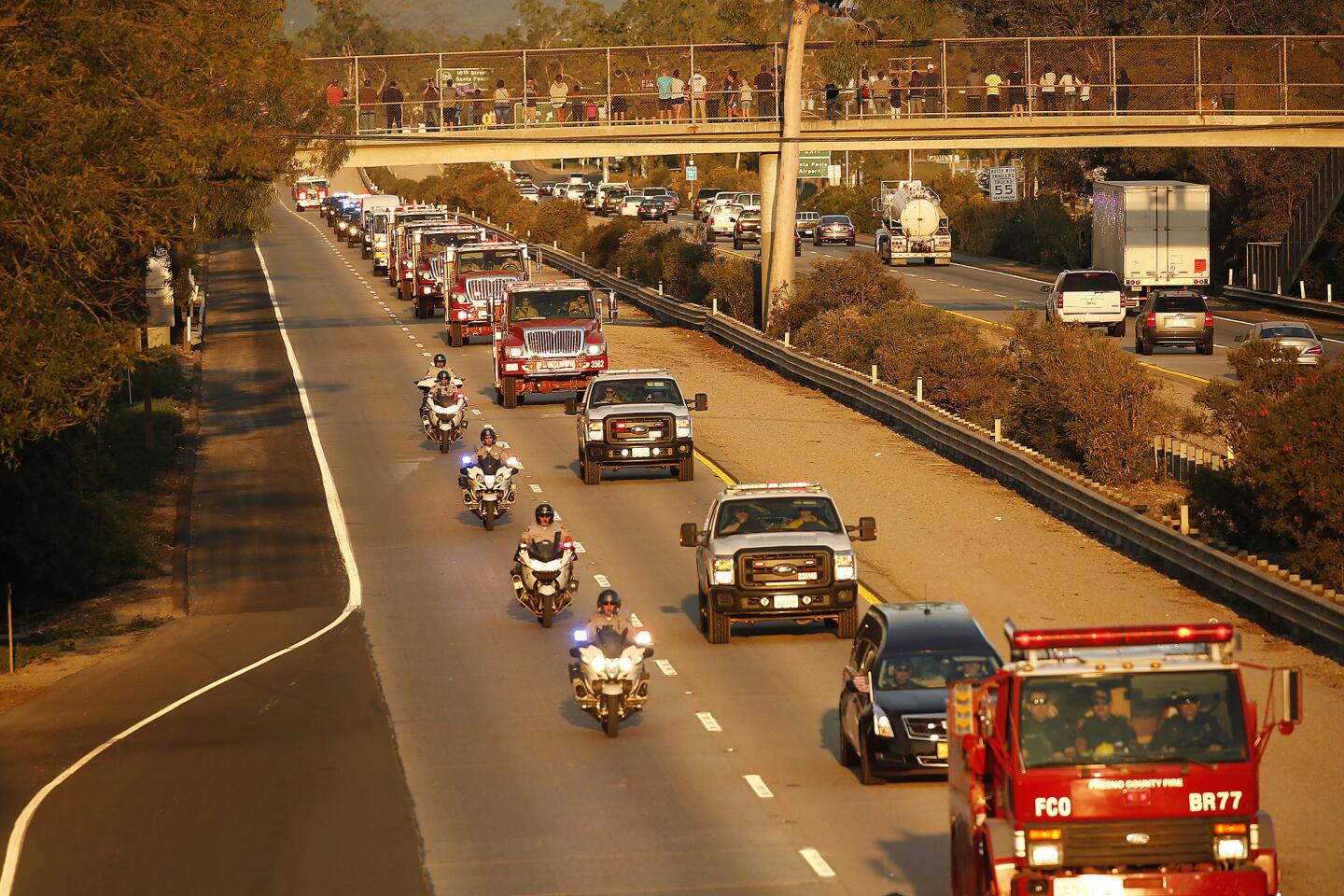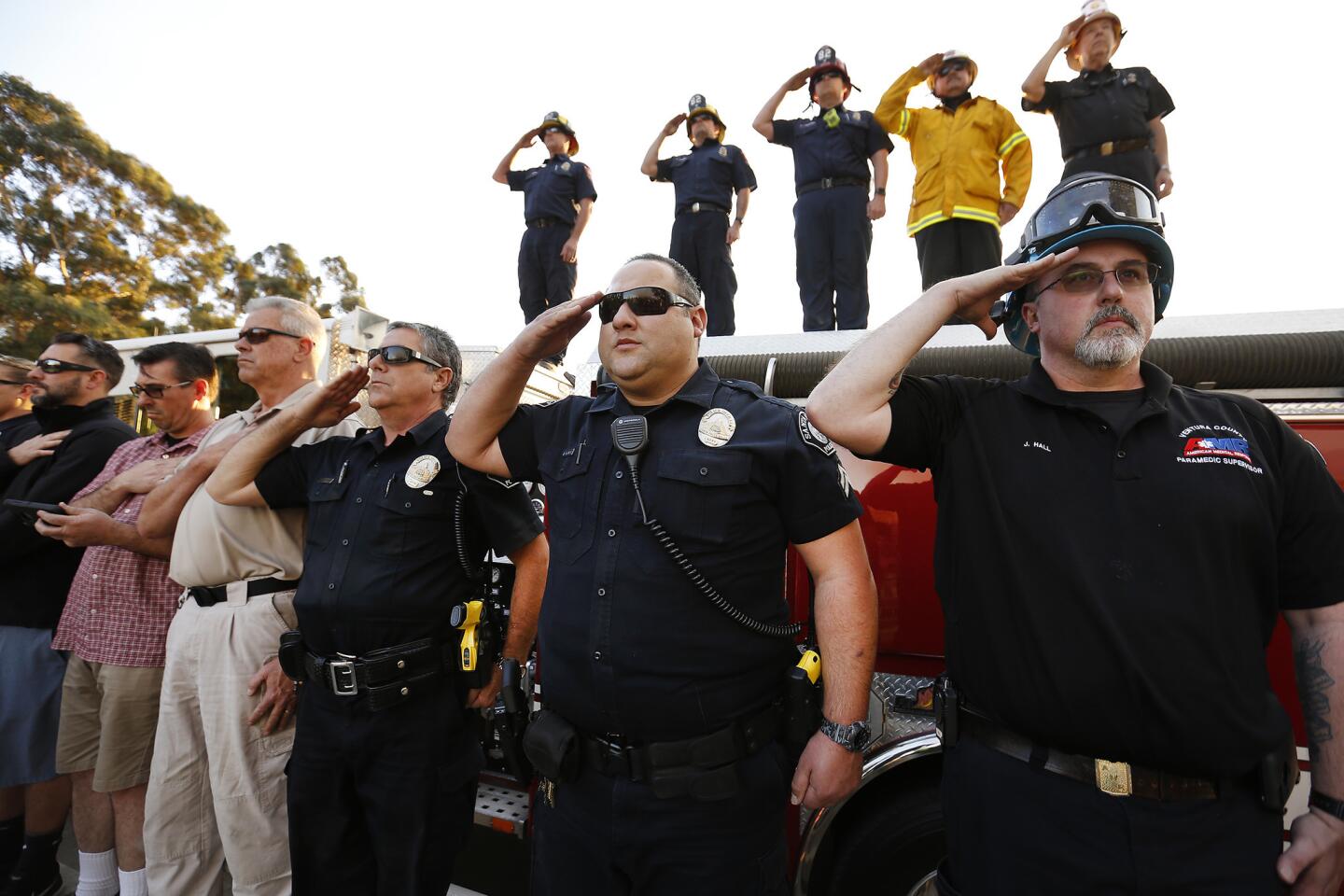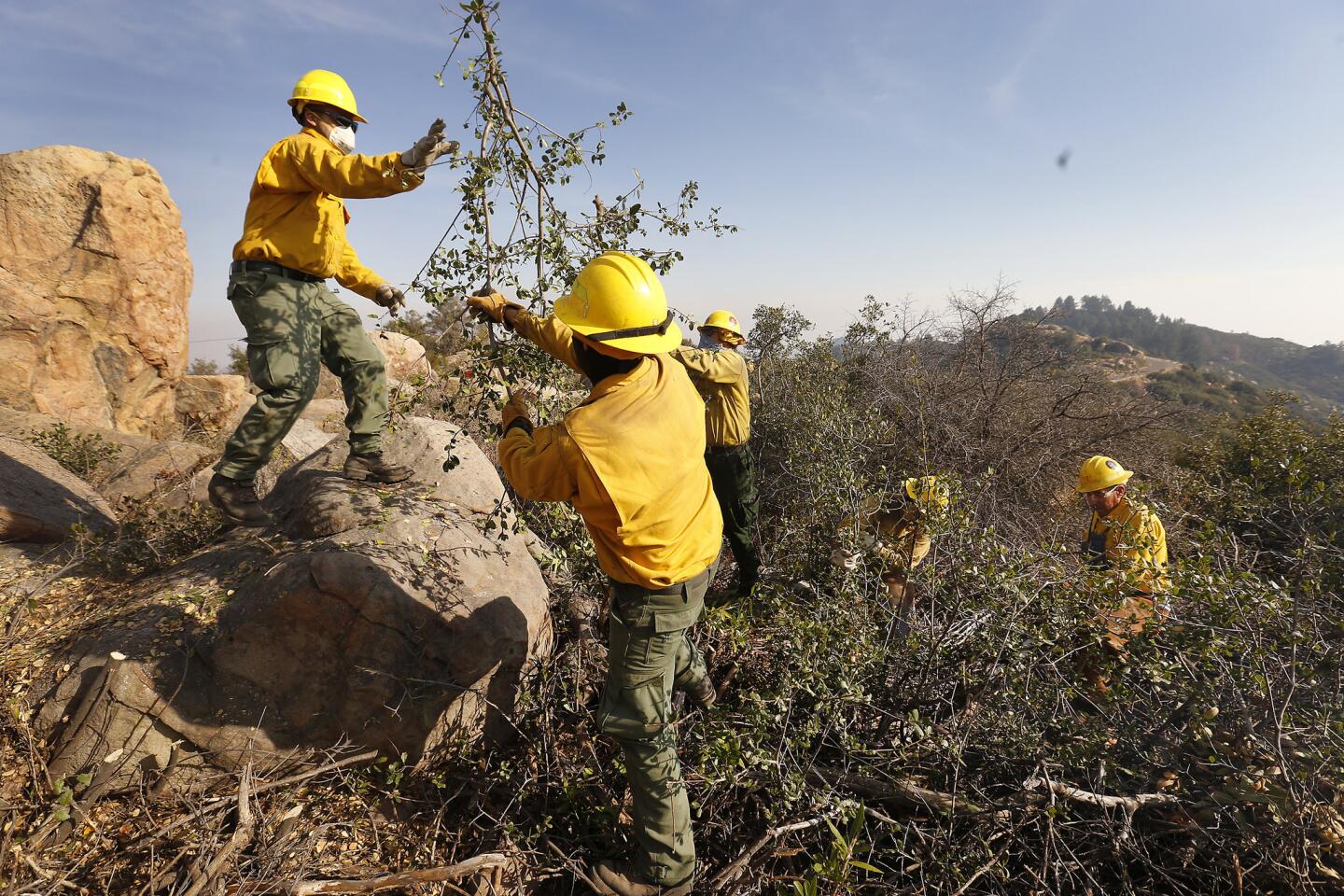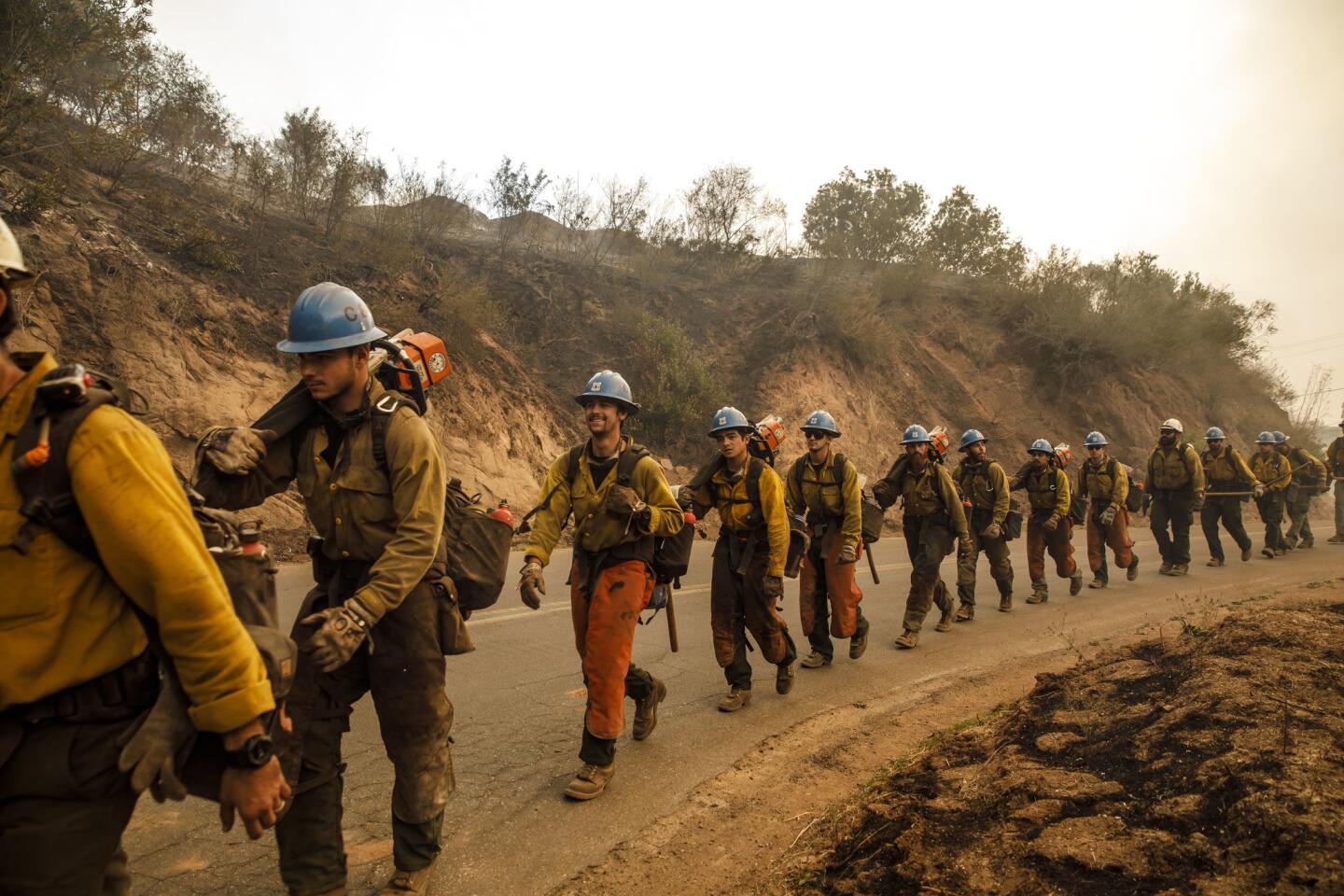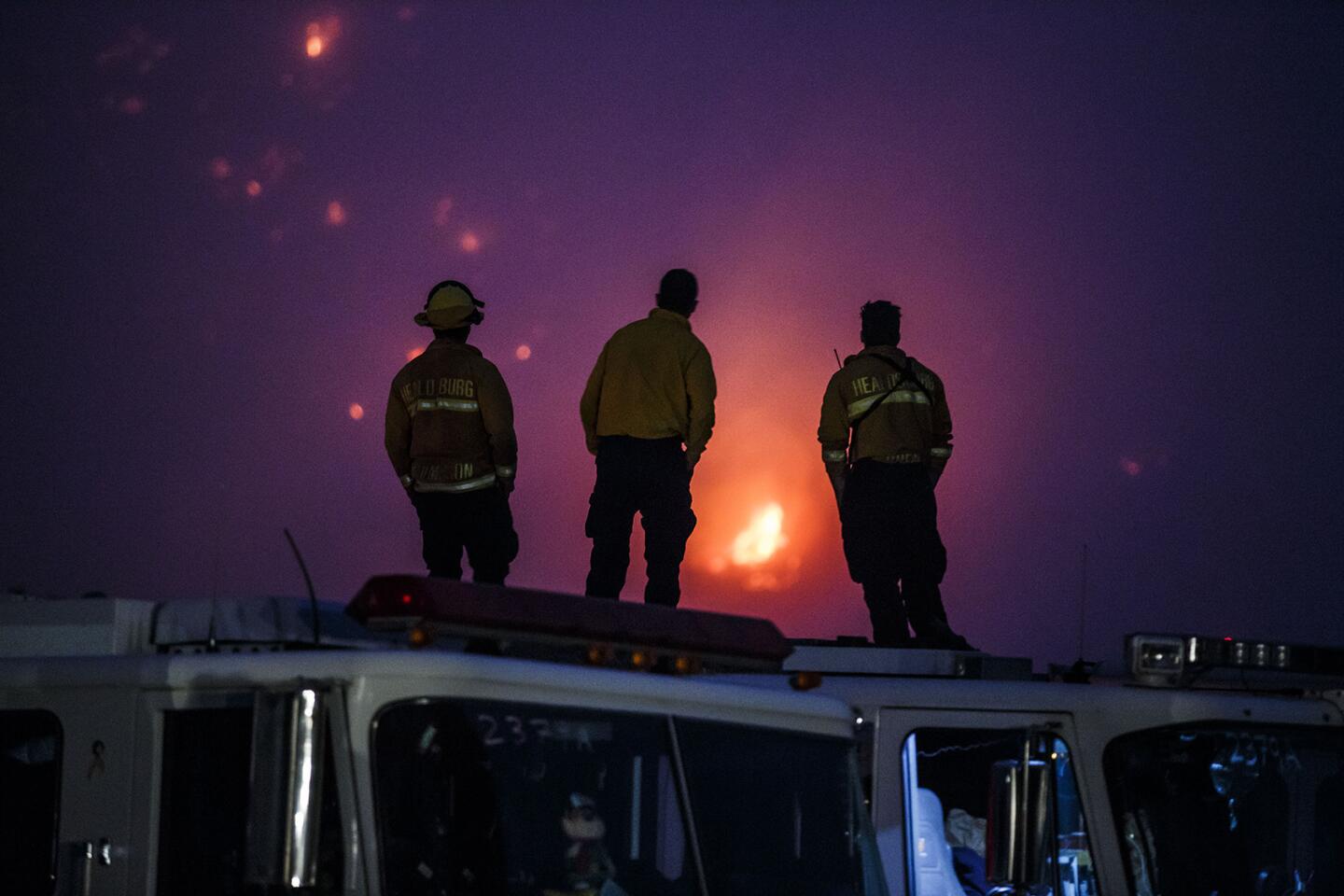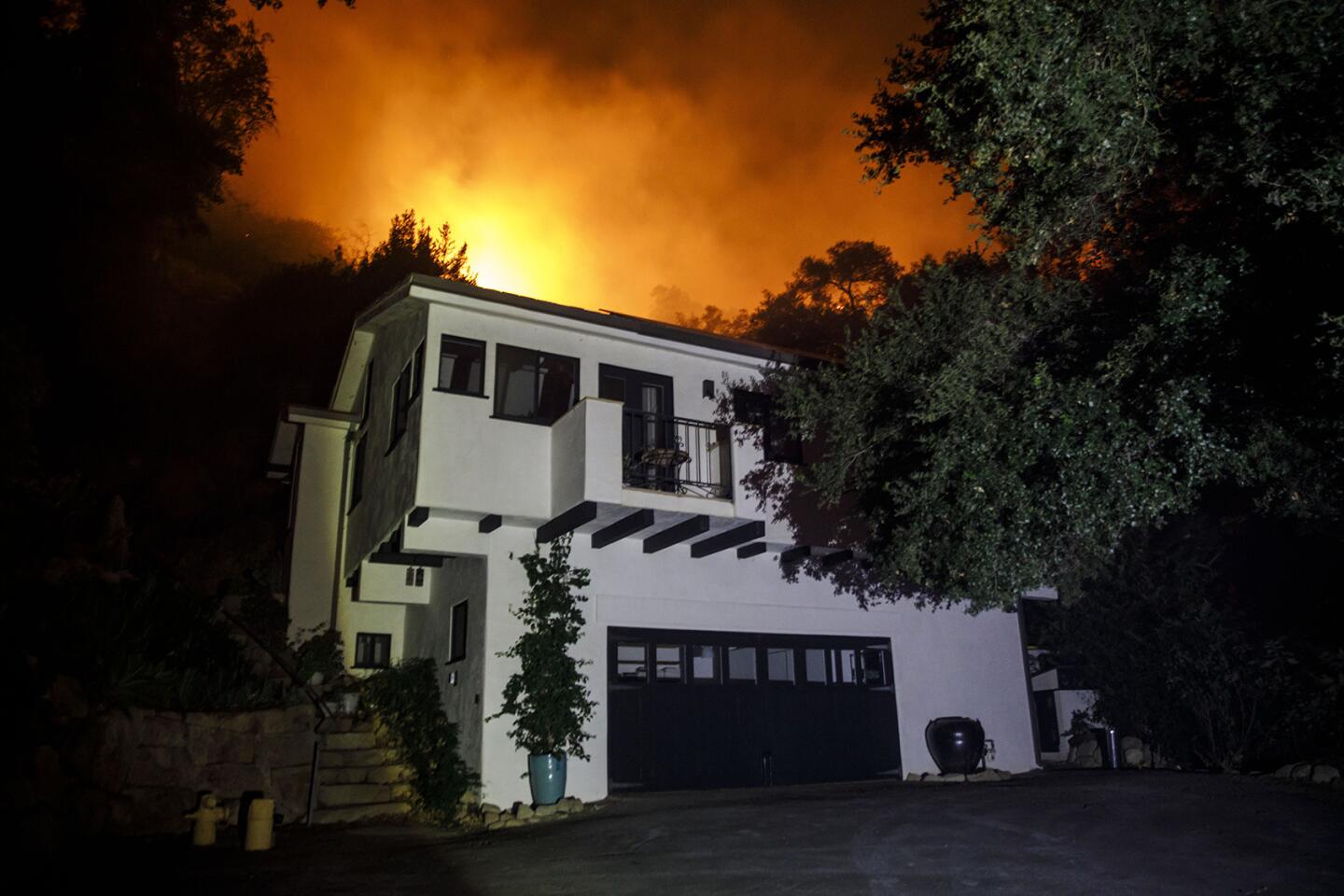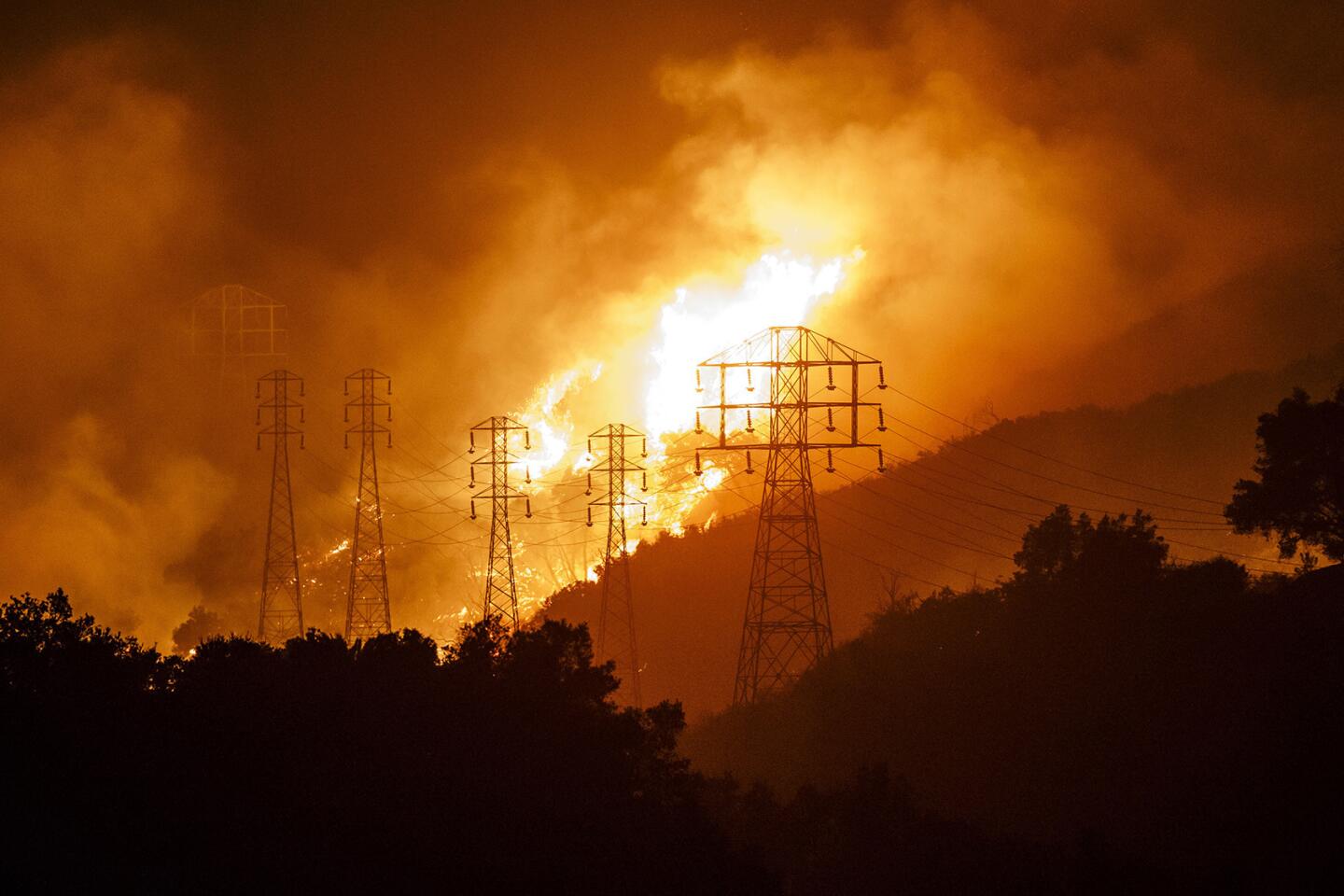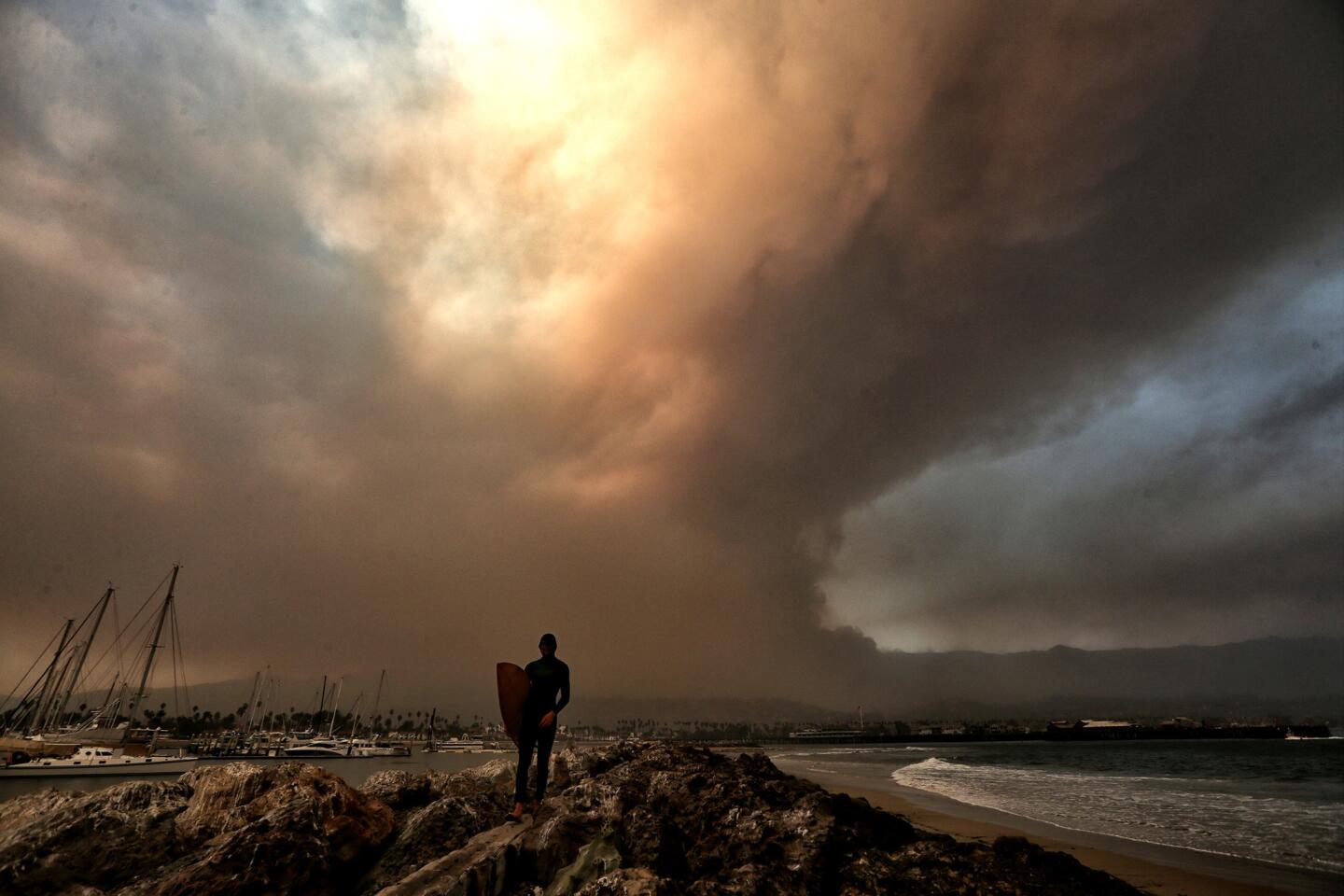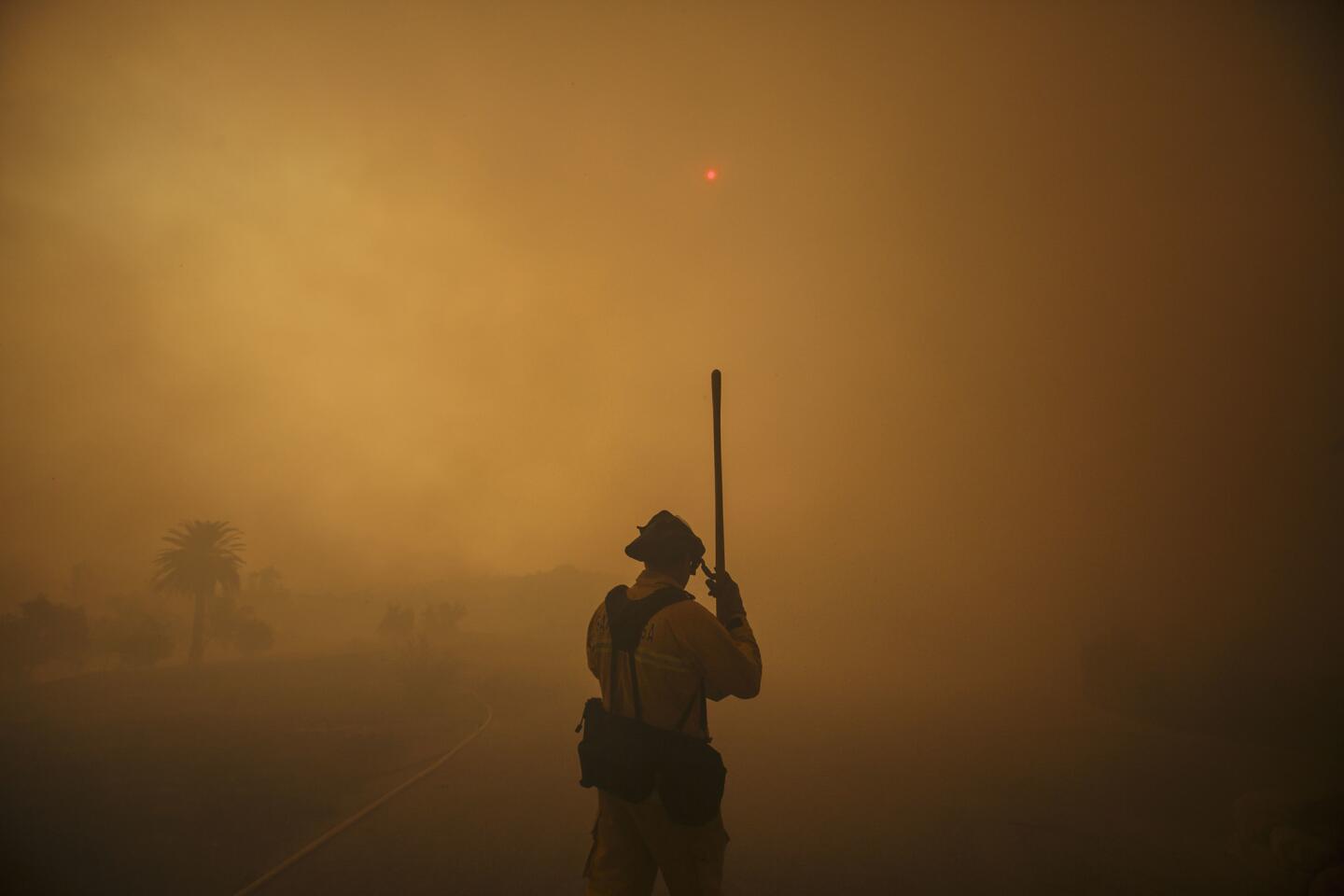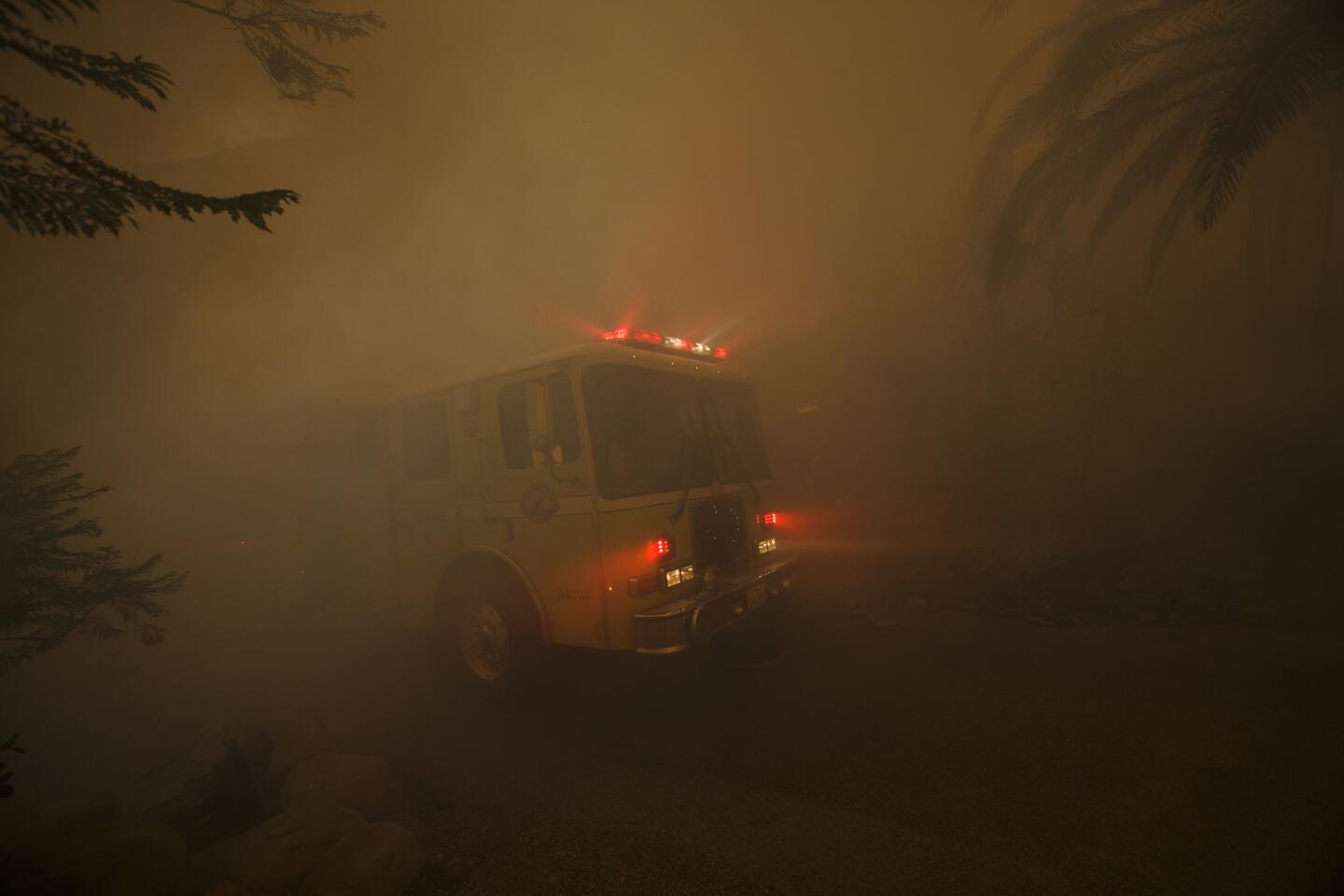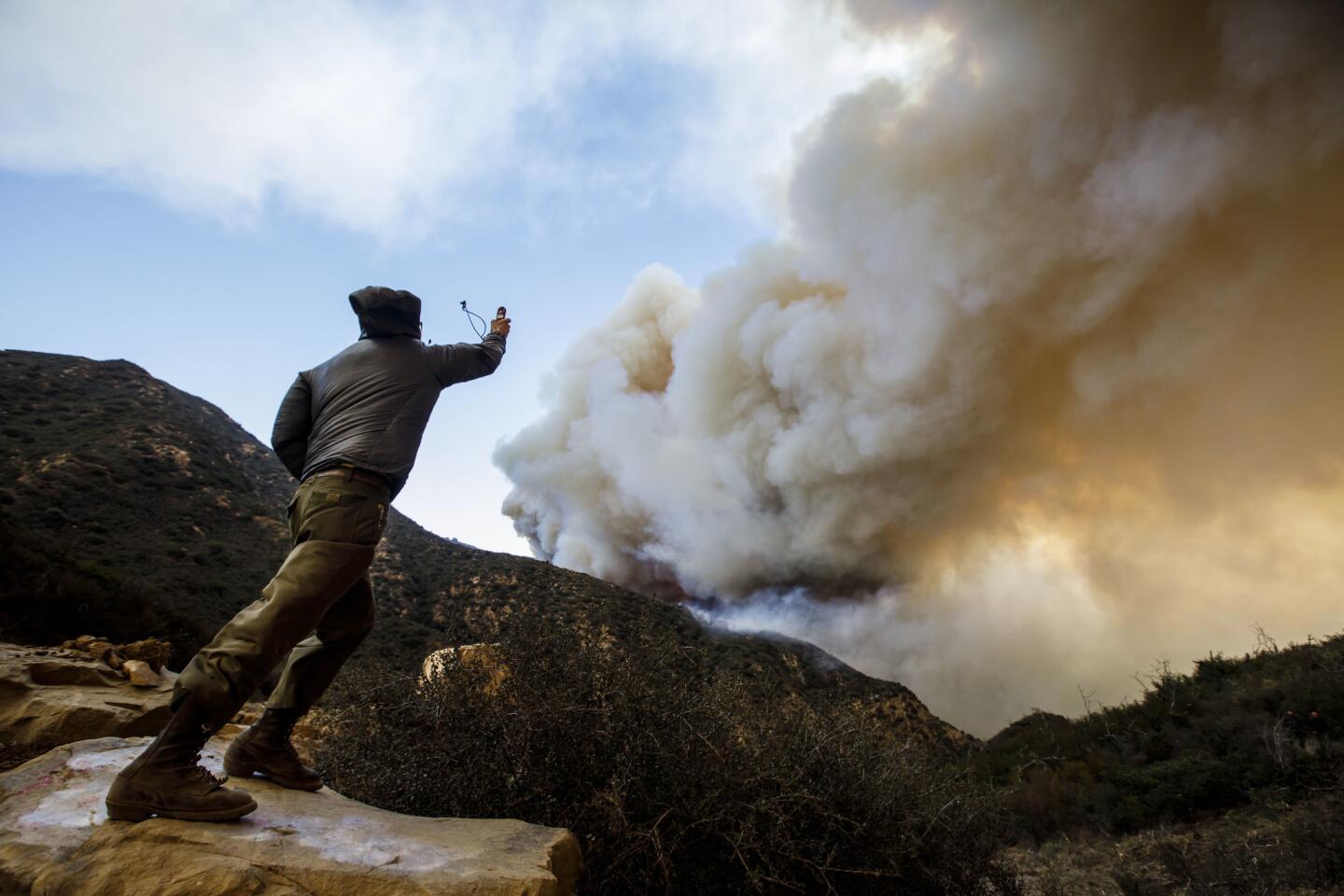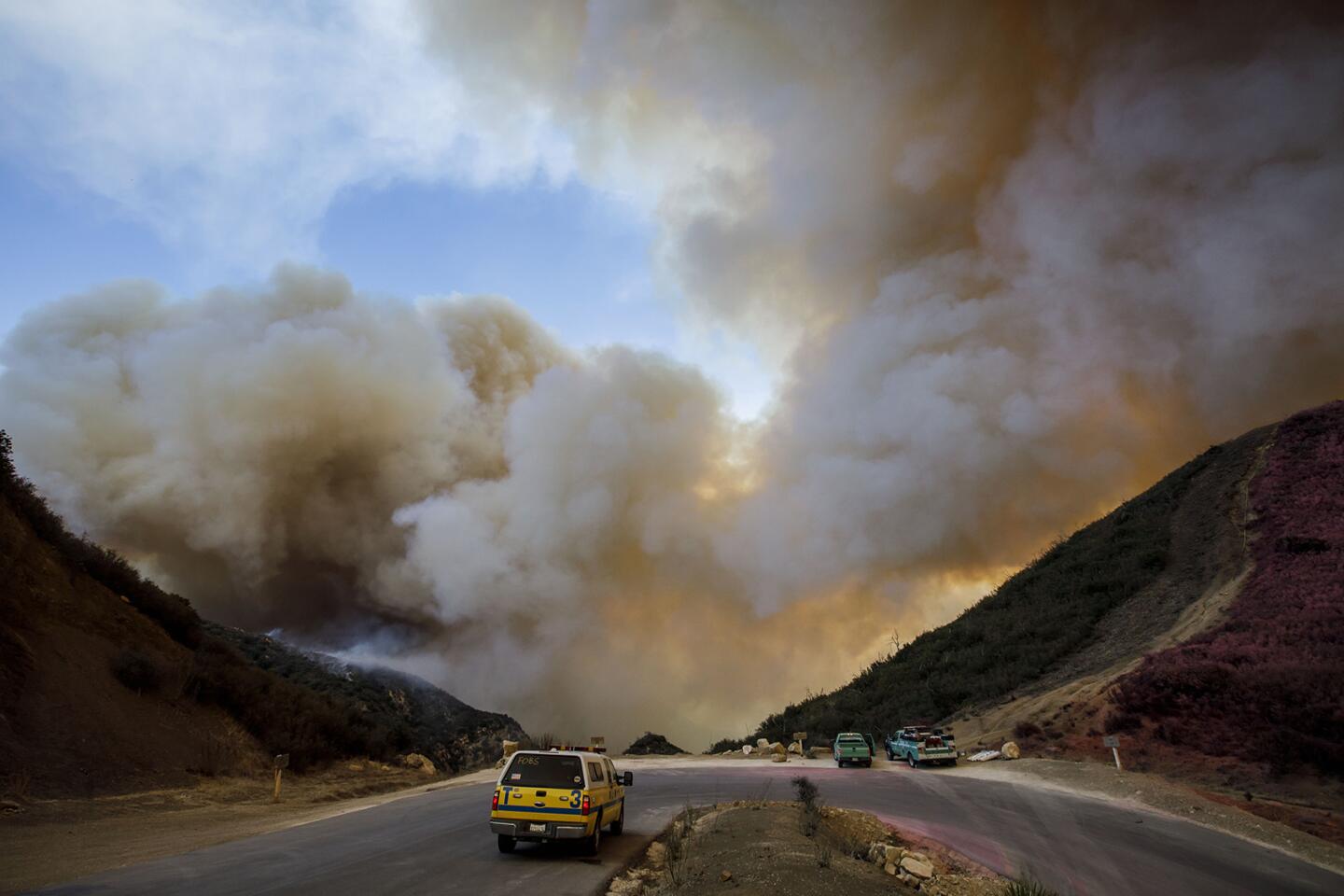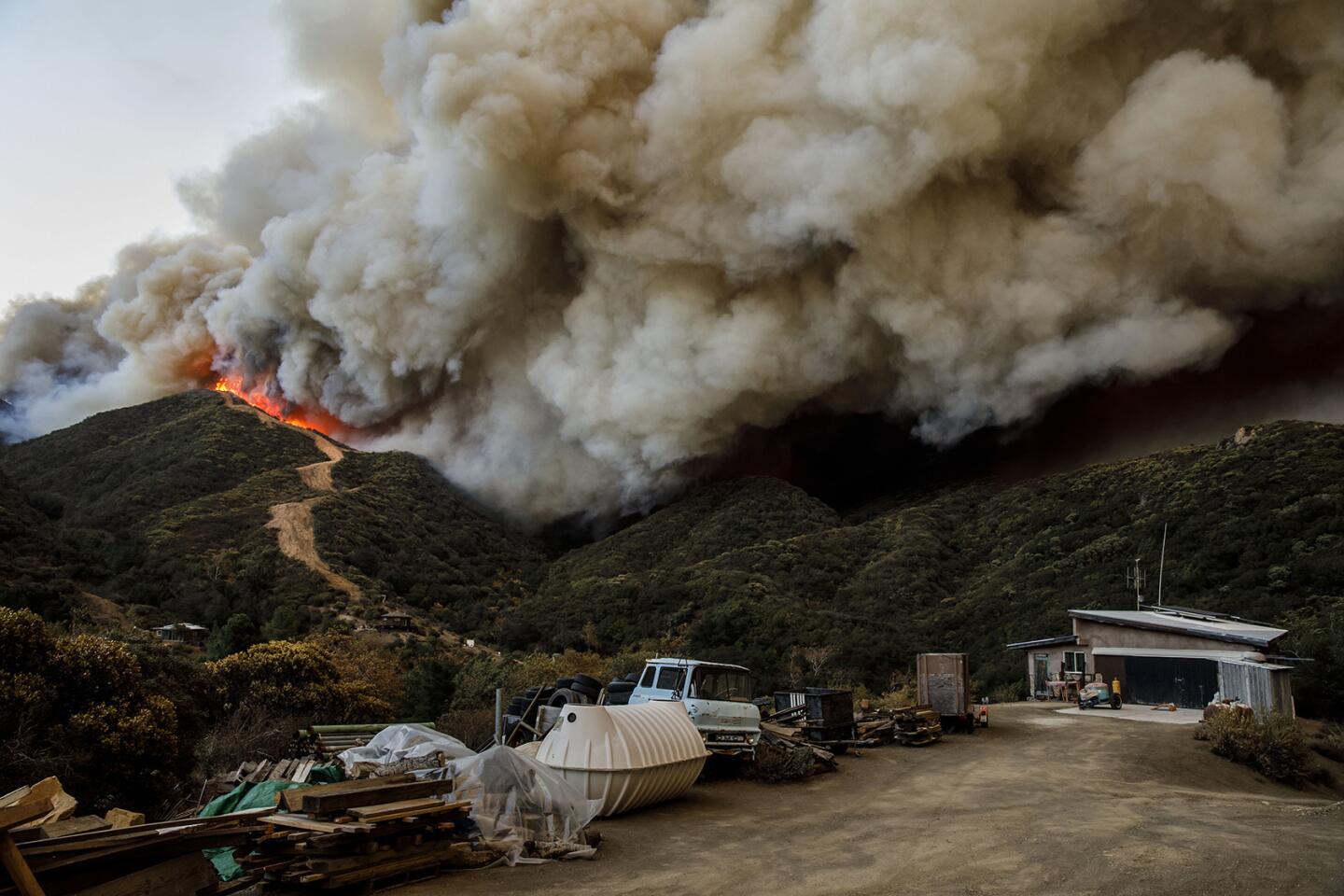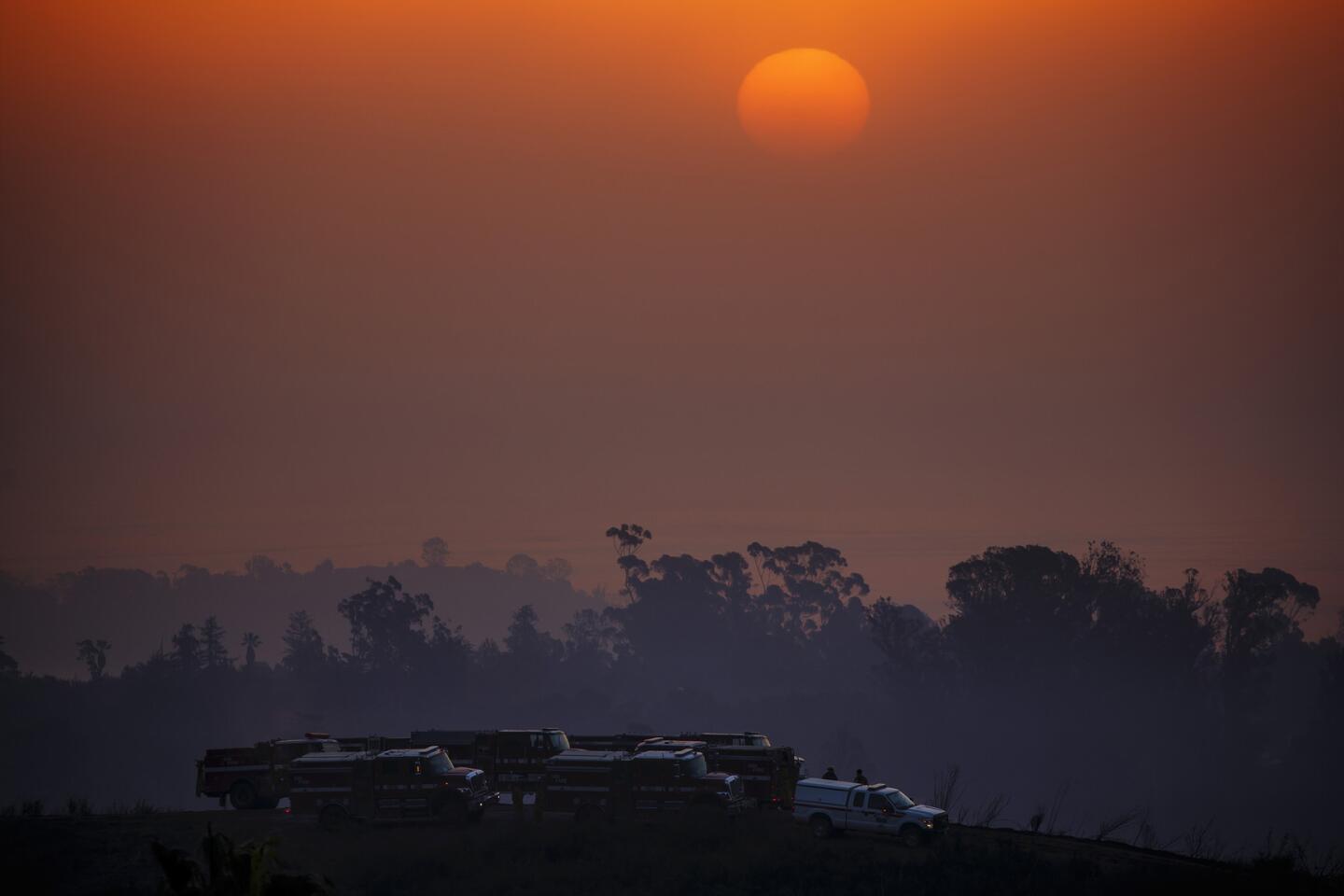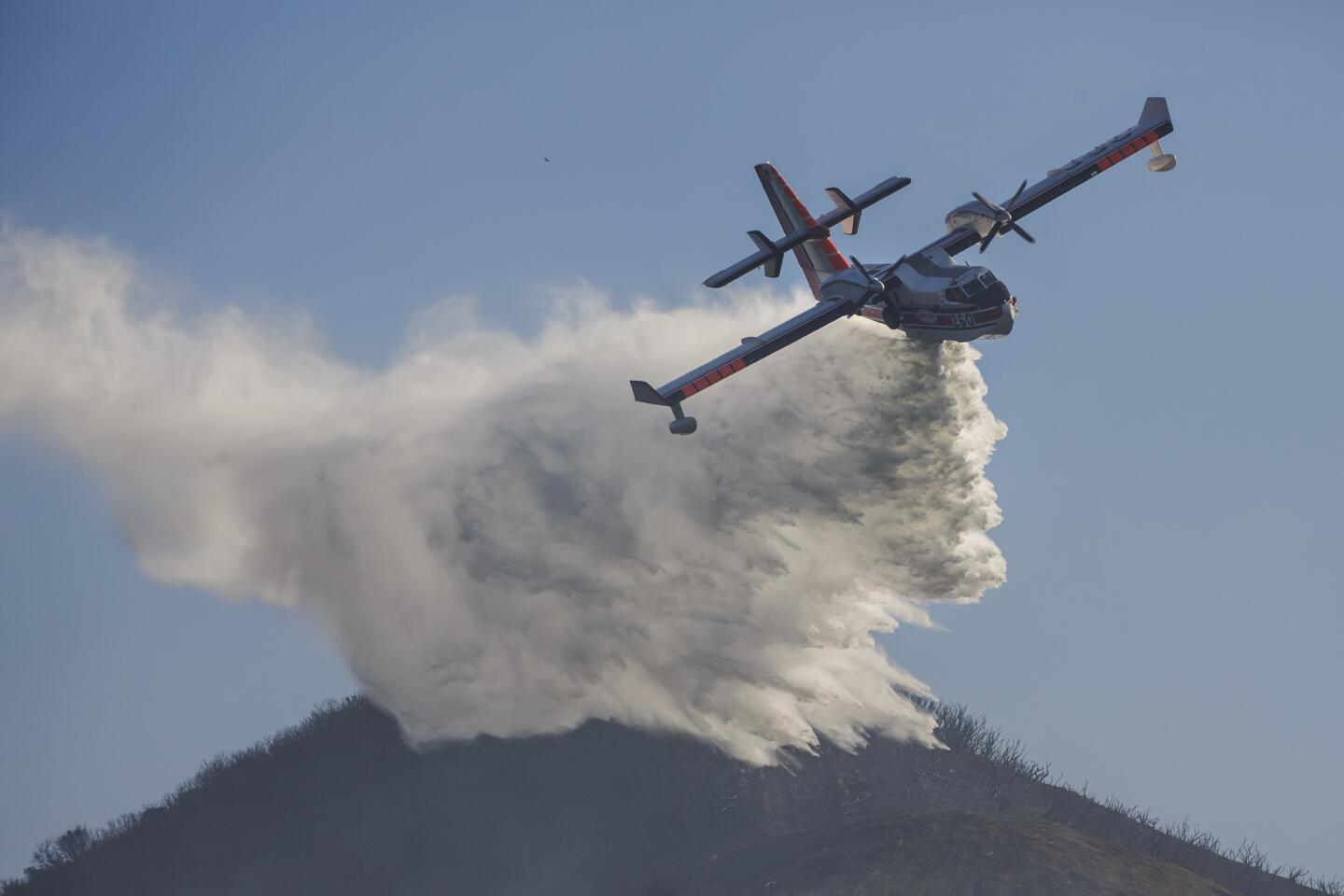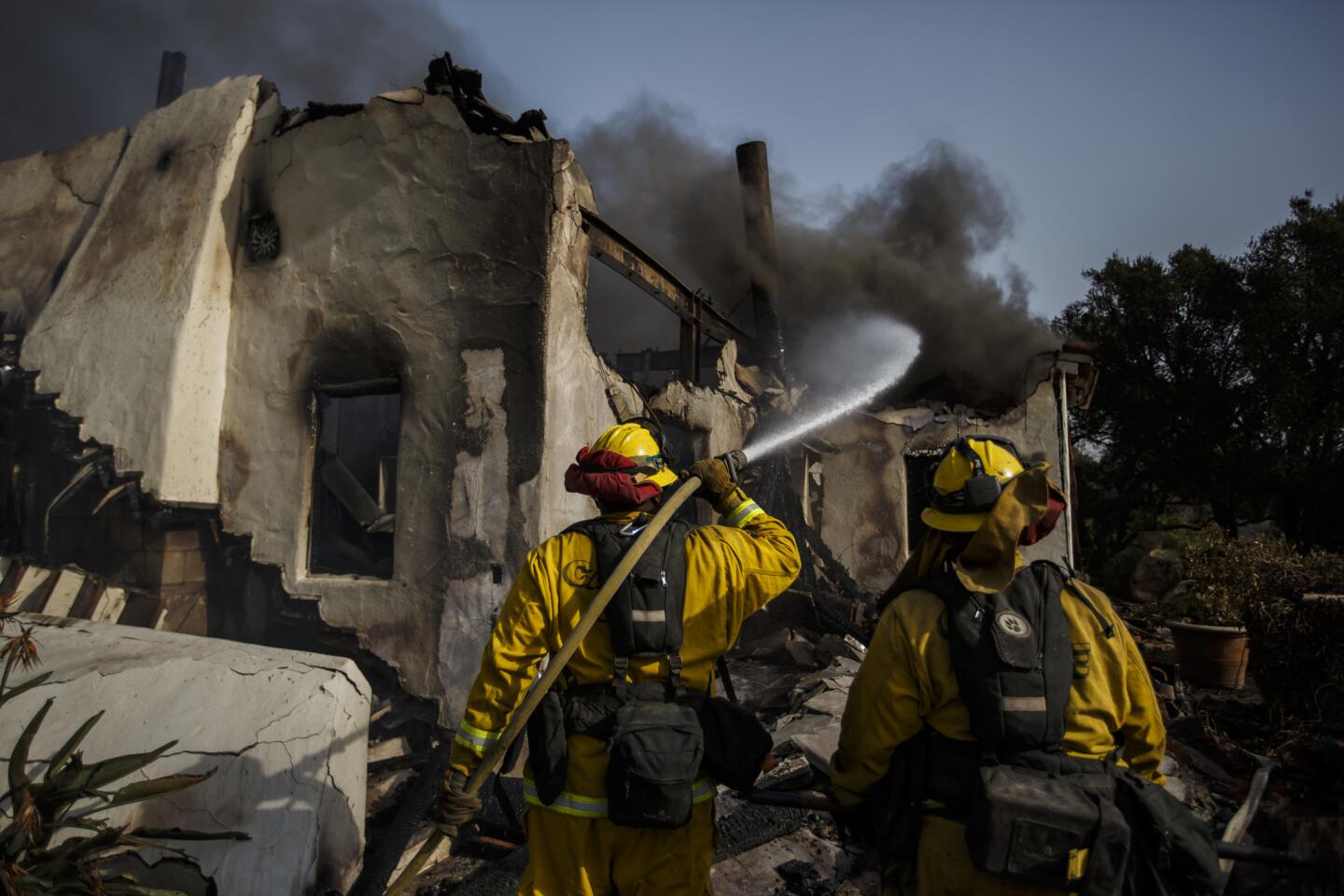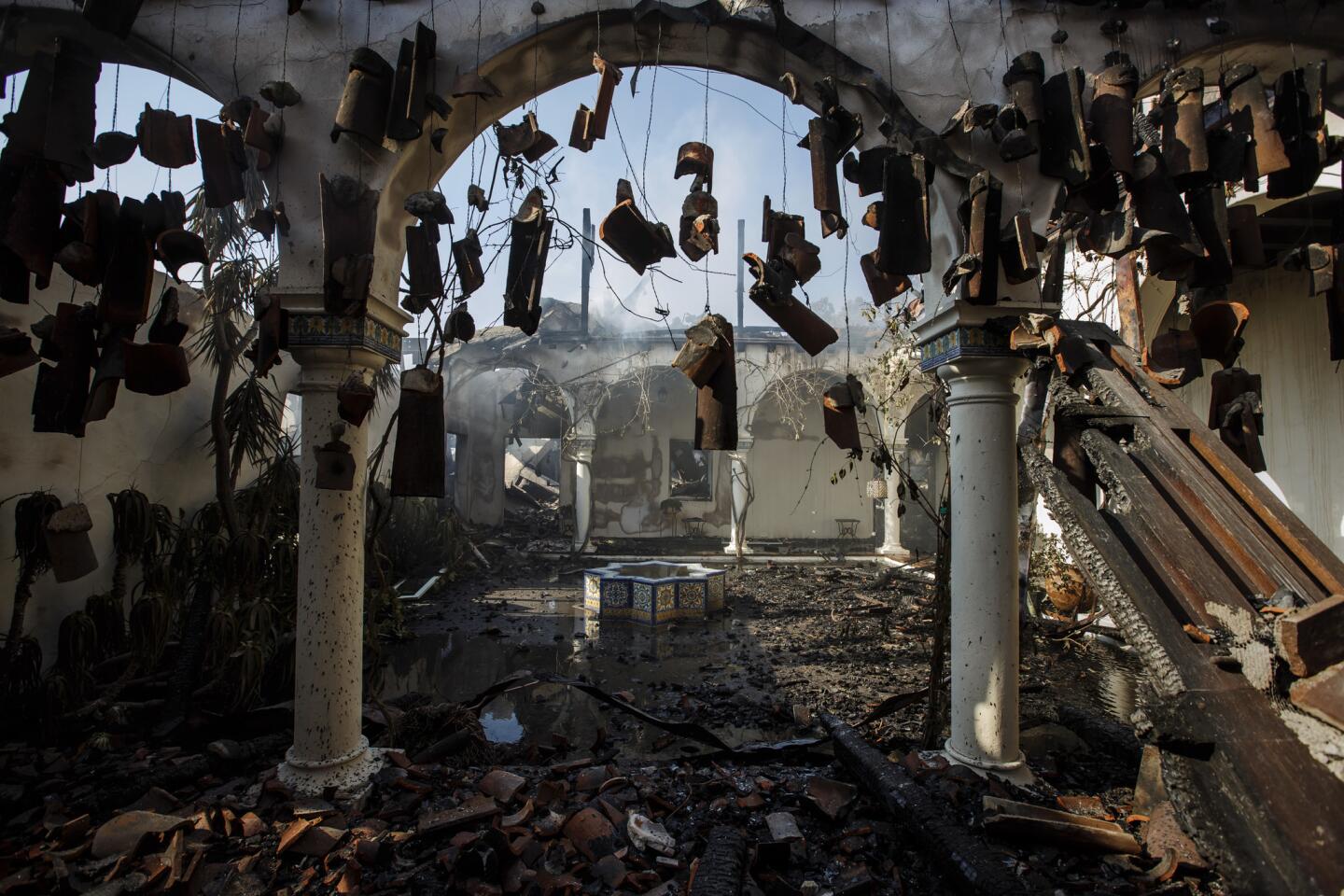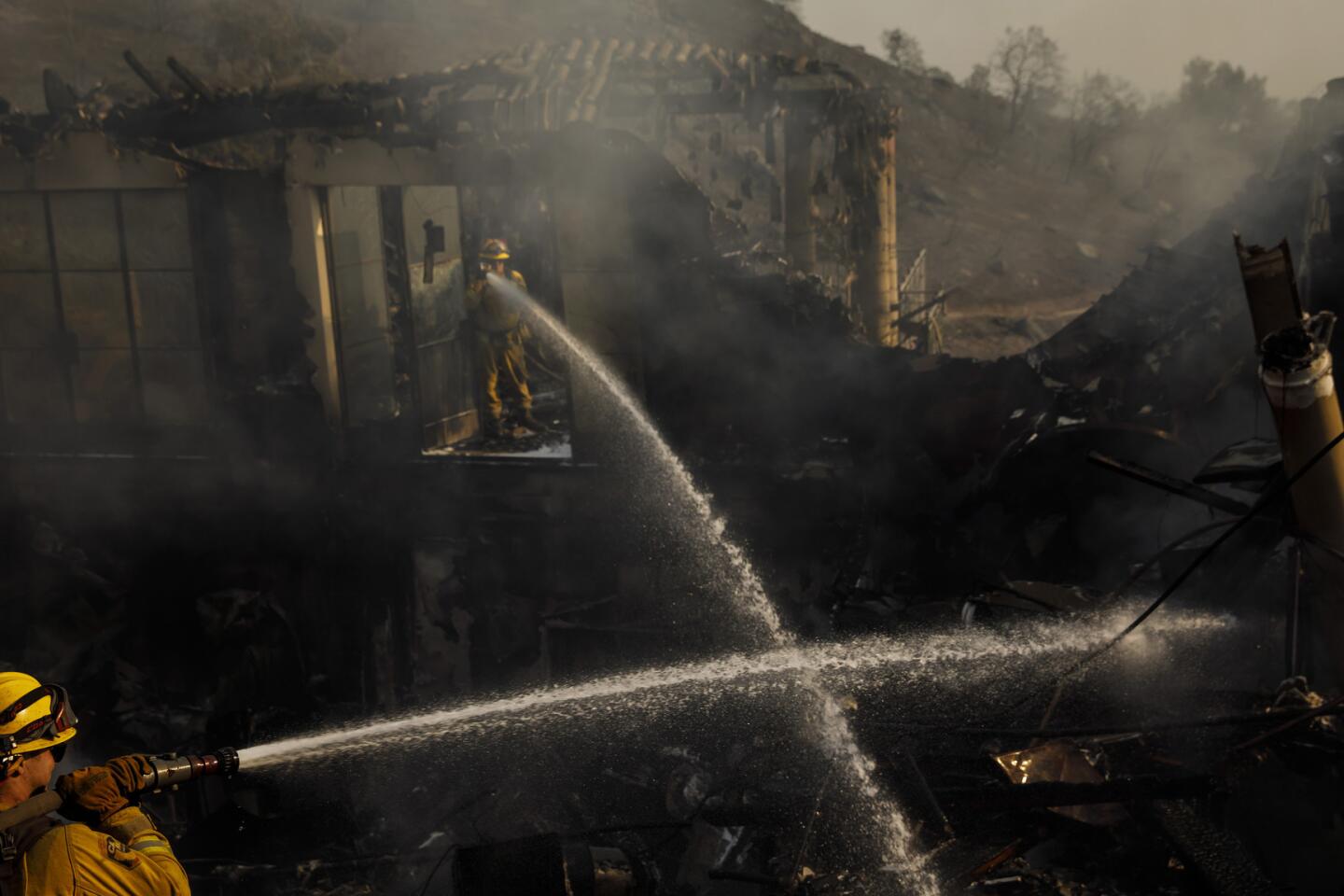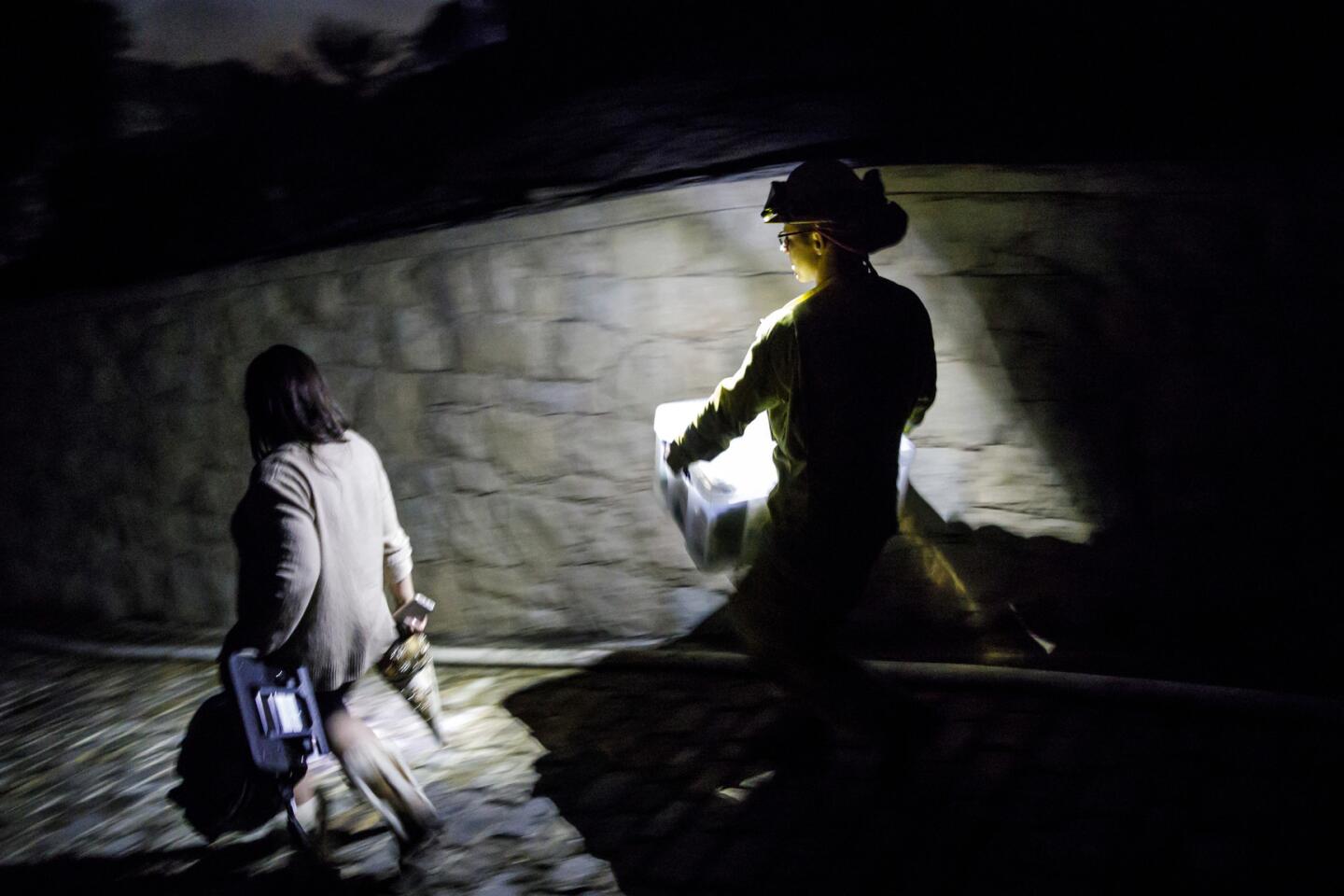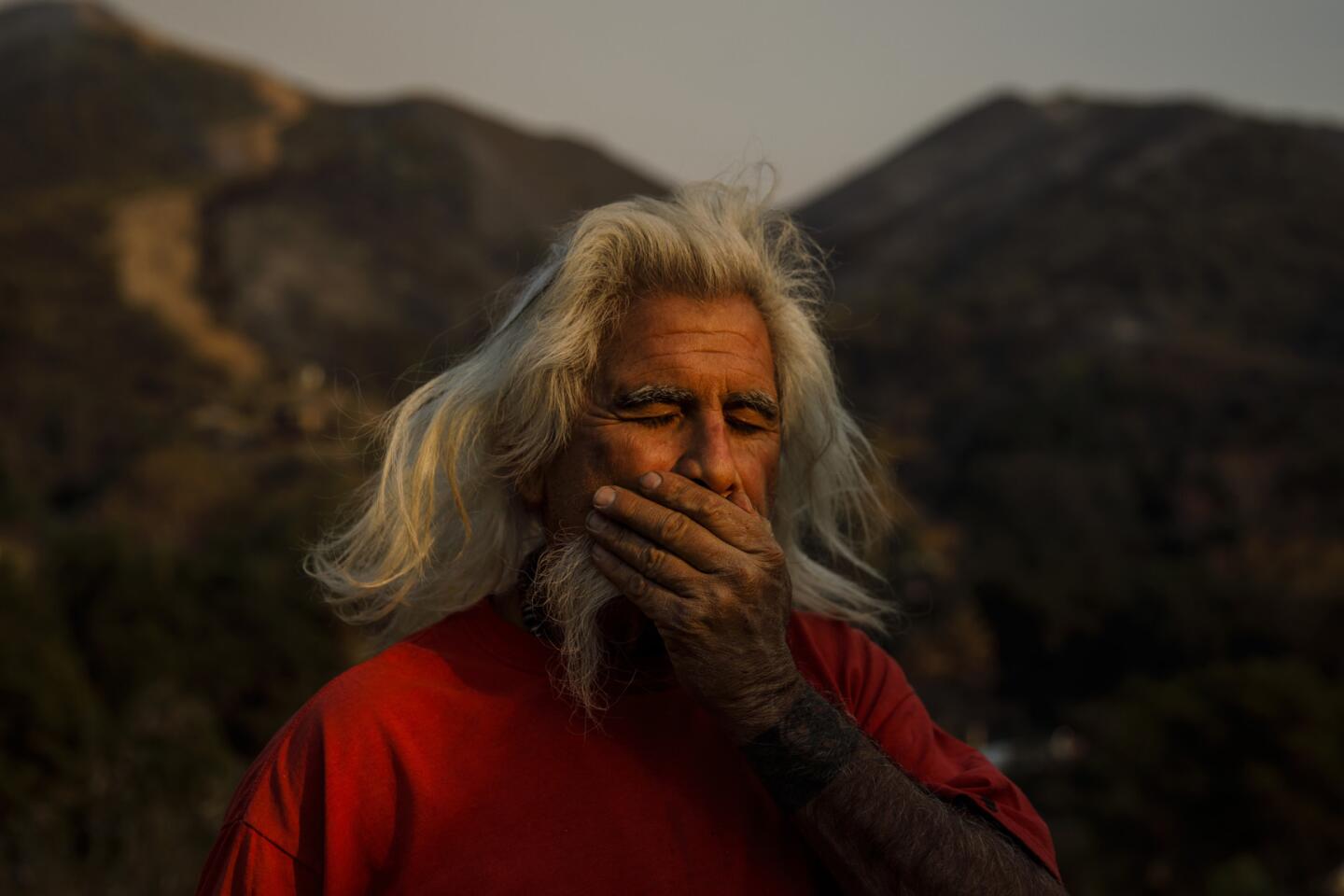Reporting from SANTA BARBARA — A firefighter died Thursday while battling the Thomas fire as authorities braced for new powerful winds that could pose threats to homes in Santa Barbara and Ventura counties.
Officials said a combination of Santa Ana and sundowner winds will hit the area from Thursday through Sunday, bringing new dangers to a fire that now ranks as the fourth-largest in the state’s modern history.
As they prepare for the new battle, firefighters were also grappling with loss.
“I am very saddened to report that a firefighter fatality has occurred on the Thomas Incident,” Chief Ken Pimlott, the director of the California Department of Forestry and Fire Protection, said in a statement. “Please join me in keeping our fallen firefighter and his loved ones in your prayers and all the responders on the front lines in your thoughts as they continue to work under extremely challenging conditions.”
Pimlott identified the firefighter as fire apparatus engineer Cory Iverson, 32.
Iverson was assigned to the fire as a part of a strike team from Cal Fire’s San Diego unit. He started with Cal Fire in 2009. He is survived by his wife, Ashley, and their 2-year-old daughter Evie. The family is expecting a second daughter this spring.
“Our thoughts and prayers are with Cory’s family and all of his friends and co-workers throughout the department and the fire service,” he said.
He said an accident review team would investigate the circumstances of Iverson’s death.
“While we continue to process this tragic loss, we must keep our focus on the fire. The fire fight in front of us continues to go on,” he said. “The communities we are protecting are depending on us, and we will not fail.”
At 4 p.m., the body of the firefighter was loaded into a hearse and taken away, with firefighters lining the road in tribute.
Just hours before Iverson’s death, Pimlott appeared at a morning briefing where he emphasized safety over complacency. It’s during what seems like the least dangerous times — while mopping up hot spots, cutting burned trees or striding though charred rubble — that most injuries occur, he said.
While strategy was discussed as usual, there was an emphasis on staying vigilant as the fire’s eastern flank winds down. A retiring corrections officer warned firefighters not to become complacent during this incident, and said that should they find themselves relaxing, they should think about their colleagues who have been injured or lost their lives in seemingly low-risk situations.
Despite a couple of days of reduced winds and feverish efforts by firefighters to establish new containment lines, the 249,500-acre Thomas fire has surpassed the size of the Zaca fire, which scorched Santa Barbara County in 2007, according to Dave Zaniboni, a spokesman for the Santa Barbara County Fire Department.
Firefighters hope the 240,207-acre Zaca fire burn scar, as well as the younger vegetation it contains, will help them fight the Thomas fire’s growth along its western edge.
Firefighters have taken advantage of a two-day lull in winds to increase fire containment to 35%. Those efforts could be tested soon, however, as forecasters predict a new blast of Santa Ana winds Thursday, and sundowner winds over Santa Barbara County on Friday.
In Thursday’s incident report, fire officials said they didn’t expect to reach full containment of the blaze until Jan. 7 — more than three weeks from now.
The state of California began keeping records of wildfire acreage in 1932. While other large fires raged on the West Coast prior to that year, those records are less reliable, according to Cal Fire.
At the morning briefing Thursday, fire commanders said another day of extremely low humidity and moderate winds would greet firefighters as they continued to build containment lines above Carpinteria, Montecito and Santa Barbara.
The mountains north of the coast produce notoriously unpredictable and dangerous conditions for firefighters, said fire behavior analyst Tim Chavez. In the Matilija wilderness, which straddles the border between the two counties, observers saw 50-foot flames backing down a hillside overnight, he said. It’s unusual to see flames that tall working their way down a mountain, officials said.
“This thing is 60 miles long and 40 miles wide,” Chavez said of the blaze. “There’s a lot of fire out there.”
Gusty Santa Ana winds are expected for Los Angeles and Ventura counties Thursday, said Stuart Seto, a weather specialist with the National Weather Service. In the mountains, gusts of 55 mph are possible.
In the valleys, 15 to 25 mph gusts are predicted, with some gusts of up to 40 mph, Seto said. Over the past few days, a break in the weather has allowed firefighters to increase containment.
“That’s the thing, it’s just going to do the opposite now. The humidities are still down in the single digits,” Seto said. “These winds, especially in the mountain areas, are really going to start blowing the fire around again. What it does is carry the embers further down and can create more fires.”
1/73
John Bain and Brandon Baker try to stop a fire from burning a stranger’s home in Ventura.
(Marcus Yam / Los Angeles Times) 2/73
A brush fire moving with the wind sends embers all over residential neighborhoods north of Ventura.
(Marcus Yam / Los Angeles Times) 3/73
A family packs up and evacuates as a brush fire gets closer to their home in Ventura.
(Marcus Yam / Los Angeles Times) 4/73
John Bain and his friends, all from Camarillo, came to help as brush fires move quickly through residential neighborhoods in Ventura.
(Marcus Yam / Los Angeles Times) 5/73
Strangers band together to help put out a palm tree on fire and stop it from burning homes.
(Marcus Yam / Los Angeles Times) 6/73
The Hawaiian Gardens apartments burn in Ventura.
(Michael Owen Baker / For the Times) 7/73
Residents help with the fire attack on Buena Vista Street in Ventura.
(Michael Owen Baker / For the Times) 8/73
Residents watch the Thomas fire on Prospect Street in Ventura.
(Michael Owen Baker / For the Times) 9/73
Firefighters are deployed to battle the fire in a Ventura neighborhood.
(Marcus Yam / Los Angeles Times) 10/73
A chimney is all that stands of a home as a brush fire continues to threaten other homes in Ventura.
(Marcus Yam / Los Angeles Times) 11/73
Remnants of a home as a brush fire continues to threaten other homes in Ventura.
(Marcus Yam / Los Angeles Times) 12/73
A home burns on a hillside overlooking Ventura.
(Marcus Yam / Los Angeles Times) 13/73
Palms are consumed in the Thomas fire.
(Marcus Yam / Los Angeles Times ) 14/73
Emma Jacobson, 19, center, gets a hug from a neighbor after her family home was destroyed by fire in Ventura.
(Marcus Yam / Los Angeles Times) 15/73
Olivia Jacobson, 16, wipes tears as she looks at her family’s home, destroyed by the brush fire on Island View Drive in Ventura.
(Marcus Yam / Los Angeles Times) 16/73
Aerial view of the Thomas fire in Ventura County.
(Brian van der Brug / Los Angeles Times) 17/73
Noah Alarcon carries a cage with the family cat while evacuating from Casitas Springs.
(Michael Owen Baker / For the Times) 18/73
Smoke from the Thomas fire crosses over Lake Casitas near Ojai.
(Michael Owen Baker / For the Times) 19/73
A Ventura County firefighter battles a blaze on Cobblestone Drive near Foothill Road in Ventura.
(Al Seib / Los Angeles Times) 20/73
Ventura County Firefighter Aaron Cohen catches his breath after fighting to save homes along Cobblestone Drive near Foothill Road in Ventura.
(Al Seib / Los Angeles Times) 21/73
Aerial view of homes burned to the ground in the Thomas fire in Ventura County.
(Brian van der Brug / Los Angeles Times ) 22/73
A home between Via Baja and Foothill Road burns in Ventura.
(Al Seib / Los Angeles Times) 23/73
Amanda Leon and husband Johnny Leon watch as firefighters fight to save homes along Cobblestone Drive near Foothill Road in Ventura.
(Al Seib / Los Angeles Times) 24/73
Chino Valley firefighters fight to save a home along Cobblestone Drive near Foothill Road in Ventura.
(Al Seib / Los Angeles Times) 25/73
Embers continue to burn at sunset Tuesday in a home on Ridgecrest Court at Scenic Way in the Clearpoint neighborhood of Ventura.
(Al Seib / Los Angeles TImes) 26/73
A firefighter battles the Thomas fire along Highway 33 in Casitas Springs.
(Wally Skalij / Los Angeles Times) 27/73
Firefighters try to protect homes from the Thomas fire along Highway 33 in Casitas Springs.
(Wally Skalij / Los Angeles Times) 28/73
A firefighter battles the Thomas fire along Highway 33 in Casitas Springs.
(Wally Skalij / Los Angeles Times) 29/73
Edward Aguilar runs through the flames of the Thomas Fire to save his cats at his mobile home along Highway 33 in Casitas Springs in Ventura County.
(Wally Skalij / Los Angeles Times) 30/73
Jeff Lipscomb, left, Gabriel Lipscomb, 17, center, and Rachel Lipscomb, 11, look for items to recover from their burned home in Ventura.
(Marcus Yam / Los Angeles Times) 31/73
A traffic collision temporarily clogged lanes on the northbound 101 Freeway between Solimar and Faria Beaches as the Thomas fire burned in the hills.
(Al Seib / Los Angeles Times) 32/73
The Thomas fire burns towards the 101 Freeway and homes between Solimar and Faria Beaches.
(Al Seib / Los Angeles Times) 33/73
Fire personnel keep an eye on the Thomas fire on Toland Road near Santa Paula.
(Michael Owen Baker / For the Times) 34/73
A train on the Rincon coast passes a burning hillside from the Thomas fire.
(Michael Owen Baker / For the Times) 35/73
The Thomas fire burns along the 101 Freeway north of Ventura on Wednesday evening.
(Wally Skalij / Los Angeles Times) 36/73
A firefighter battles the Thomas fire in the town of La Conchita early Thursday.
(Wally Skalij / Los Angeles Times) 37/73
A resident cries as the Thomas fire approaches the town of La Conchita early Thursday.
(Wally Skalij / Los Angeles Times) 38/73
Burned palm trees are left standing between the 101 Freeway and Faria Beach as the Thomas fire reaches the Pacific Ocean.
(Al Seib / Los Angeles Times) 39/73
Firefighters battle Thursday to protect the resort city of Ojai from encroaching flames.
(Marcus Yam / Los Angeles Times) 40/73
Casey Rodriquez helps a friend move belongings after the Thomas Fire destroyed most of an apartment building on North Kalarama in Ventura.
(Wally Skalij / Los Angeles Times) 41/73
A burnt-out bus near Maripoca Highway.
(Marcus Yam / Los Angeles Times) 42/73
The Thomas fire burns in the Los Padres National Forest, near Ojai.
(Marcus Yam / Los Angeles Times) 43/73
A huge plume of smoke rises north of Ventura as seen Sunday afternoon from the Ventura pier, as the Thomas fire threatens parts of Carpenteria and Montecito.
(Al Seib / Los Angeles Times) 44/73
The Thomas Fire burns in the Los Padres National Forest, near Ojai, Calif. on Friday.
(Marcus Yam / Los Angeles Times) 45/73
Residents react as they watch the Thomas Fire burn in the hills above La Conchita at 5 am Thursday moning.
(Wally Skalij / Los Angeles Times) 46/73
Mary McEwen and husband Dan Bellaart prepare to evacuate their home on Toro Canyon Road in Montecito as the Thomas fire burns.
(Mel Melcon / Los Angeles Times) 47/73
Carpenteria resident Chris Gayner, right, photographs a plane in the hills of Carpenteria.
(Mel Melcon / Los Angeles Times) 48/73
From left, residents Michael Desjardins, his neighbor Patty Rodriguez, daughter Mikayla, wife Veronica, mother in law Amanda Buzin, and son Mikey keep an eye on the Thomas fire in Carpenteria.
(Mel Melcon / Los Angeles Times) 49/73
Mary McEwen cheers as she sees fire crews make their way up a hill past her home on Toro Canyon Rd. in Montecito.
(Mel Melcon / Los Angeles Times) 50/73
Dan Bellaart and wife Mary McEwen comfort each other in the backyard of their home that includes an avocado ranch on 9 acres of land on Toro Canyon Road in Montecito, as the Thomas fire burns in the background.
(Mel Melcon / Los Angeles Times) 51/73
Carpinteria resident Jay Molnar, 55, mouth and nose protected against the smoke, views flames glowing in the hills above the city on Dec. 11, 2017.
(Mel Melcon / Los Angeles Times) 52/73
Sacramento firefighters battle a blaze in Toro Canyon in Carpenteria at dusk Tuesday.
(Al Seib / Los Angeles Times) 53/73
Josh Acosta, superintendent with Fulton Hotshots looks for ways to fight fire consuming a structure threatening two homes high up Toro Canyon in Carpenteria at dusk Tuesday.
(Al Seib / Los Angeles Times) 54/73
A motorcade passes on tHighway 126 carrying the body of a Cal Fire engineer Cory Iverson, who died Thursday morning while battling the Thomas Fire.
(Al Seib / Los Angeles Times) 55/73
Santa Paula City officials, Police and Firefighters salute from a bridge as a motorcade passes on the Santa Paula Freeway 126 carrying the body of a Cal Fire engineer Cory Iverson.
(Al Seib / Los Angeles Times) 56/73
Forest Service crews cut and clear dense brush for contingency lines off of East Camino Cielo in the Santa Ynez Mountains above Montecito and Santa Barbara to help stop the Thomas fire from advancing.
(Al Seib / Los Angeles Times) 57/73
A hotshot crew from Ojai marches towards their assignment to protect structures on East Mountain Drive in Montecito.
(Marcus Yam / Los Angeles Times) 58/73
Firefighters monitor the flames Saturday from a staging area near Parma Park in Montecito.
(Marcus Yam / Los Angeles Times) 59/73
Flames slowly make their way down a valley behind a home in Montecito.
(Marcus Yam / Los Angeles Times) 60/73
Flames whip around power lines as they move through Sycamore Canyon on Saturday, threatening structures in Montecito.
(Marcus Yam / Los Angeles Times) 61/73
Smoke billows over Santa Barbara as the Thomas Fire continues to threaten the area on Saturday.
(Robert Gauthier / Los Angeles Times) 62/73
Bill Shubin, deputy fire chief of the Santa Rosa Fire Department checks on flames burning near homes north of East Mountain Drive in Montecito.
(Marcus Yam / Los Angeles Times) 63/73
A fire truck pulls responds to fires burning near homes on East Mountain Drive in Montecito.
(Marcus Yam / Los Angeles Times ) 64/73
Brian Good, from US Forest Service, leans forward against the wind, and holds up a Kestrel to measure wind speeds up to 50 mph on Gibraltar Road in Montecito.
(Marcus Yam / Los Angeles Times) 65/73
A plume of smoke moves south as winds as high as 50 mph blow down Gibraltar Road on the west fork of Cold Spring Trail in Montecito.
(Marcus Yam / Los Angeles Times) 66/73
Flames and a big plume of smoke threaten homes on Gibraltar Road near Gibraltar Rock, outside Montecito.
(Marcus Yam / Los Angeles Times) 67/73
The sun rises as fire crews prepare for another day of fighting the Thomas Fire, in Montecito, Calif., on Sunday.
(Marcus Yam / Los Angeles Times) 68/73
An aircraft makes a water drop over a hot spot up in the mountain range at Gibraltar Rock near Montecito, Calif. on Sunday.
(Marcus Yam / Los Angeles Times) 69/73
Humboldt County firefighters Bobby Gray, left, hoses down smoldering flames inside a destroyed home, as Kellee Stoehr, right looks on, after the Thomas Fire burned in Montecito, Calif. on Sunday.
(Marcus Yam / Los Angeles Times) 70/73
A home on Park Hill Lane was destroyed by the Thomas fire in Montecito, Calif.
(Marcus Yam / Los Angeles Times ) 71/73
Humboldt County firefighters Lonnie Risling, left, and Jimmy McHaffie, right, spray down smoldering fire underneath the rubble of a home that was destroyed by the Thomas Fire, in Montecito, Calif., Sunday.
(Marcus Yam / Los Angeles Times) 72/73
Fire crews help the Behrman family retrieve their family’s personal belongings out of their burned home, in Montecito, Calif., on Sunday.
(Marcus Yam / Los Angeles Times) 73/73
In the foreground of the ridges that were burned by the Thomas Fire, Rusty Smith stands outside his home that survived the flames that were kicked up by Saturday’s wind event and threatened his home in Flores Flats on Gibraltar Road, near Montecito.
(Marcus Yam / Los Angeles Times) Winds will be north to northeast, and usually the Ventura side is more affected than the Santa Barbara side, Seto said.
“But it’s still going to have an effect up in the mountain areas of Santa Barbara,” he added. Winds up there will be up to 25 mph and a little gusty, “so there’s still going to be a big concern up in that area,” he said.
Throughout mountain areas on Thursday there’s a greater risk for large fire plumes, which can cause erratic fire behavior.
“It carries the heat up, and it looks like a thunderstorm cloud,” Seto said. “From there, the fire could spread out. Sometimes they collapse, and it’s a strong down-rush of winds and it spreads the fire.”
Sundowner winds are expected Friday into Saturday in the Santa Barbara area. On Sunday, winds are expected to return to offshore conditions, Seto said.
The fire has destroyed more than 900 homes in Ventura and Santa Barbara counties since it began Dec. 4 near Thomas Aquinas College in Santa Paula. In its first day, the fire spread southwest, toward Ventura, and northwest, eventually hugging Ojai before pushing to the Central Coast.
joseph.serna@latimes.com | Twitter @JosephSerna
brittny.mejia@latimes.com | Twitter: @Brittny_Mejia
javier.panzar@latimes.com | Twitter: @jpanzar
ALSO
‘This fire is a beast’: Massive inferno keeps growing despite epic battle by firefighters
Witnesses saw snapped, sparking power line at start of destructive L.A. wildfire
Track the key details on Southern California’s fires
Wealthy Bel-Air wrestles with homeless crisis after encampment fire burns homes
UPDATES:
7:41 p.m.: Updated with wind forecast and updated numbers.
4:55 p.m.: This article was updated with the name of the firefighter.
4:10 p.m.: This article was updated with more details from the Cal Fire chief.
1:00 p.m.: This article was updated with additional details about the death of the firefighter.
12:45 p.m.: This article was updated with the death of a firefighter.
10:04 a.m.: This article was updated with details on Cal Fire wildfire records.
9:55 a.m.: This article was updated with details on homes destroyed and an expected containment date.
This article was originally published at 8:50 a.m.
